

18 Big Pros and Cons of Owning a Travel Trailer
Camping opportunities are available all across the United States. Once you cross the Mississippi River, the western states sometimes offer hundreds of miles of wilderness to explore. When supplies are limited and a tent won’t protect you from the wildlife that’s out there, a travel trailer becomes an investment that makes sense.
Most travel trailers qualify as an RV. These recreational vehicles are in a broad category of towable vehicles that include fifth-wheel designs and tent trailers. It isn’t going to be a motorhome, but there are some that come pretty close to that concept. You can then stock the trailer with as many supplies as you need to have a wonderful holiday adventure.
If you love to travel, manage a regional sports schedule for your family, or you just want to have a grand adventure, then several pros and cons of owning a travel trailer are worth reviewing. You will need to ensure that the eventual product you select falls within the towing guidelines for your vehicle.
List of the Pros of Owning a Travel Trailer
1. A travel trailer is more affordable than a motorhome. If you love to travel, the expenses can pile up quickly when you are on the road. When you own a travel trailer, then you can avoid the initial expense of purchasing a motorhome. RVs are notoriously expensive, and the larger ones will sell for more than $100,000 when they are new. If you want to purchase a travel trailer in a similar condition, then you can expect to pay between 15% to 30% of that initial MSRP. This advantage means that you can enjoy the RV lifestyle without draining your savings account.
2. Travel trailers come in many different shapes and sizes. You can find a wide range of travel trailer designs available today so that something can work with your current vehicle. You will find basic options, like pop-up campers, that work for cars and SUVs that can only tow up to 1,000 pounds. Large fifth-wheel options are the most expensive selection in this category, but it is a choice that also comes with the most amenities.
Entry-level products might not provide the right kind of insulation you need for some adventures, but you can save money on your overall expenses. There is always a way to find an equitable compromise if you pursue this product.
3. You have more flexibility with your travel arrangements. Since you need a vehicle to tow a travel trailer, this option gives you more flexibility with your travel arrangements. Driving an RV allows you to bring a vehicle if you tow it, but the trailer puts your car or SUV as the primary component of your rig. It’s a lot easier to drive into a campsite to unhook a fifth wheel than it is to detach a towing rig for a car so that you can explore the area.
If you were to own a bigger RV, then it might not be feasible to tow that vehicle to the various places you want to travel. A trailer makes parking easier, allowing your investment to serve a dual purpose. It can also help some families avoid the expense of a rental car.
4. Insurance costs are minimal for travel trailers. When you own a bigger, more expensive vehicle, then the cost to ensure it will increase. Travel trailers are relatively affordable, with policies ranging from $150-$500 per year. That figure is significantly less than what it would take to protect a Class A RV. If you drive your motorhome or trailer full-time, then finding the best rate is an essential component of limiting your annual expenses.
It is not unusual for an entry-level RV to cost $1,500 or more to insure. Since a small travel trailer might cost only 10% of that figure, it is a wise investment for those who want to get on the road without spending a lot of money.
5. Maintaining a travel trailer is much easier than it is for an RV. You don’t need to worry about an engine when you are pulling a travel trailer. You are left with the parts that require maintenance because of the usual wear-and-tear process. An RV has an engine attached that can require a significant amount of care. The larger the value of your vehicle, the higher the level of maintenance that will be necessary to keep it operational. All you need to do with this advantage is to ensure your generator or battery is functional to make full use of the investment.
The average owner of a travel trailer can also do most of the maintenance work at home by themselves. If you were to take an RV to a professional mechanic, the need to keep the vehicle tuned up might cost you $100 per hour in labor.
6. Travel trailers have wide availability across the United States. Because of the affordability and ease-of-use that travel trailers provide, they are one of the most popular vehicles sold in the United States each year. If you have a car or SUV that can pull this product, then you can go almost anywhere. That’s why it is an affordable way to enjoy the RV lifestyle. Manufacturers create a diverse array of styles and designs so that you can purchase an item that meets your exact needs.
If you are in the market for a travel trailer today, then you will want to ensure that the layout of the vehicle fits your requirements. Review the included amenities so that you know your car or SUV can support the arrangement. If something doesn’t fit your fancy today, you’ll find several new models being launched each year.
7. There is a healthy used market available for travel trailers. If you are looking for a travel trailer and want to save the most money possible, then consider purchasing a used item. Most private sellers are offering this asset for $3,000 to $5,000, although some fifth wheels can be much more expensive. There can be high levels of depreciation with this item, so you can take it vantage of this fact as a new owner by purchasing a used product.
A used travel trailer can be the perfect first RV. If you’re not sure that you like this option, then you haven’t invested a significant amount of money in this experiment.
8. It is an economical option for most families. You can stock a travel trailer with food, water, and all of the supplies that you need for a trip. That means you can save money each day because you’re not purchasing food at restaurants. Campgrounds will charge a fee for access, but it is significantly less than what you would pay for a hotel. Most of the places where you would take a travel trailer have similar amenities to hotels, including swimming pools and on inside restaurants if you still want those things for your trip.
Even when you compare fuel costs, the travel trailer comes out ahead. An RV can guzzle a lot of fuel when you’re at highway speeds. Your car or SUV won’t have the same miles per gallon when towing the extra weight, but the expense will still be much lower than if you were in a Class A or Class C motorhome.
9. You can take your pets with you in many travel trailers. Although this advantage doesn’t apply to the travel trailers that fold down for driving, you can transport your pets in a fifth wheel without much difficulty. That means you can avoid the headache of trying to find a sitter for your furry friends when it is time to take a vacation. Even if you want to do some sightseeing, the security of the trailer allows you to have unsupervised moments as conditions warrant.
This advantage doesn’t only apply to dogs. You can bring your kitty and many other pets on vacation with you when you have a travel trailer.
10. Owning a travel trailer is a lot of fun. Most first-time owners of a travel trailer get nervous about this investment because they’re not sure how other people will react to their presence. There are some RVs and drivers out there that take up the road, leave their waste behind, and make life difficult for everyone around them. Don’t be those people, and you will find that the community is positive and supportive of your goals.
You get the experience of the RV lifestyle without a significant investment. Some people really enjoy it, so that becomes their priority for each vacation – or even retirement.
List of the Cons of Owning a Travel Trailer
1. Cost can still be a significant factor for travel trailer ownership. Even though you can find affordable travel trailers on the market today, a desire to have a premium experience will result in a significant expense. Fifth-wheel trailers that are top-of-the-line products easily sell for more than $50,000. You can often secure financing to make a manageable monthly payment, but there are families who cannot afford this expense. If you only have a few thousand dollars in the bank, then the condition and quality of used trailers may not be up to your desired experience.
2. Some vehicles have towing difficulties with travel trailers. Before you purchase a travel trailer, you must know the exact towing capacity of your car or SUV. Many four-cylinder vehicles will only allow you to tow 1,000 pounds or less behind the vehicle. Even some large vehicles, such as the Dodge Journey, have this minimum level listed in their base model owner’s manual. If you exceed the maximum weight limit, then there is a higher risk of causing damage to your car and the trailer.
You can also find that some trailers do not work well with certain hitches. If your car or SUV requires a specific setup for towing, then you will want to know if the trailer you prefer will work with the mandated options.
3. You need to check your hitch every time you stop. A hitch can be an easy way to tow a travel trailer to virtually any destination. It is also something that you need to check every time you stop. If you hit a bump in the road or find that your vehicle’s engine is straining to climb a hill, then you might need to reset how you are towing the trailer. If you are not familiar with how to do this work, it can be costly to find someone capable of performing the inspection on your behalf.
4. People cannot travel inside of a travel trailer. Most states will not allow you to carry passengers when towing a travel trailer. That means there are clear restrictions to the number of people who can come along in a single-vehicle for the trip you are planning. Cars and SUVs have limited seating, RVs can encounter this issue when there aren’t enough seatbelts installed for the interior seating, but there are fewer restrictions in place for passenger travel.
The biggest travel trailers on the market today often need a significant truck with a lot of power to create the needed towing structures. That means you’re often limited to five passengers for your trip. If you have a family of six, then you are going to be out of luck in most states.
5. Travel trailers have fewer amenities than larger RVs. If you want to compare the amenities that are available in a motorhome to what you can find in a travel trailer, then the latter will always come up a little short. This option is not always the correct choice if your preference is to enjoy luxury while driving down the road. You can still have a refrigerator, living area, sleeping space, and a bathroom when you choose a travel trailer, but not all of them come with these features.
The most affordable travel trailers in today’s marketplace typically give you sleeping space for 2-4 people and limited food preparation options. More amenities will always equate to a heavier towing requirement.
6. There can be travel restrictions in place for some trailers. A travel trailer can restrict where you are able to explore because you are bringing something along that’s only attached to your vehicle via the hitch. That means your options are somewhat restricted for a trip or a vacation when you compare this option with an RV. You will also need to think about the roads and their conditions ahead of time to ensure that you can arrive at your destination safely.
A travel trailer gives you more convenience than what you would receive when sleeping in the back of a truck or SUV. It is less convenient than what you would experience in an RV. You have to be willing to embrace that compromise and the challenges that this disadvantage can bring to have a successful experience.
7. A travel trailer may not provide you with enough space. Travel trailers provide less space than what you will find in entry-level RVs. One of the ways to maximize the space for a sleeping area is to create flexibility within the interior of the unit, sort of like how a small apartment utilizes Murphy furniture. You will take the pressure off of your vehicle by going with something lightweight and small, but it might not be large enough to accommodate everyone. If you really need a lot of space for your family, then a motorhome is going to be the better choice to pursue.
8. Travel trailers tend to be less comfortable than other RVs. A travel trailer is like staying in a Holiday Inn Express. An RV is like staying at a 5-star resort. You will find people who are happy with either choice, so it is up to you to determine what your comfort levels are for traveling. Some of the products in this category can be over 30 feet in length to give you plenty of elbow room, but then you come back to the fact that you cannot be in one while someone is driving it down the road.
There are layouts that include a full kitchen or a king bed, but then that means you can accommodate fewer people since the spaces are being dedicated to 1-2 travelers. That is why it is imperative to find a layout that matches your expectations.
Travel trailers are a fun way to embrace a nomadic lifestyle. If you have always thought about experiencing the RV lifestyle, then this is an affordable way to see if you enjoy this kind of journey. You won’t receive as much insulation or comfort as you would with a motorhome, but the monetary savings is significant if you have a vehicle that is capable of towing your preferred set up.
Most first-time owners of a travel trailer find that their biggest disadvantage is learning how to drive and park after connecting the unit to their hitch. It takes a specific skill to push a trailer in reverse, so plan to practice that need after purchase.
The pros and cons of owning a travel trailer generally fall on the side of it being a positive experience. There can be length limitations and spatial concerns for some families, but it can also be a lot of fun to see the world using this method.
Is Owning an RV Worth It?
We break down the financial costs and benefits of owning an RV so you can decide if it’s the right purchase for you.
By Michelle Neale & Roadtrippers
Is owning an RV worth it? Maybe this is a question you’ve thought about for a while, having enjoyed camping and feeling ready to take the next step. Or perhaps you’ve never seriously considered RV ownership before, but given the current pandemic, travel restrictions and general upheaval of routine have suddenly made it appealing.
Of course, the answer will be different for everyone, but it’s important to consider a few different factors when determining if RV ownership is right for you. Here are the top things to take into account when contemplating RV ownership.
The Financial Costs of Owning an RV

The Cost of the Actual RV
You can spend anywhere from $1,000 on a used pop-up camper to $300,000 (or more) on a brand new motorhome. While it may be tempting to splurge on all the bells and whistles, it’s important to consider your family’s specific needs—and what you can realistically afford. Taking on an RV that busts the family budget will not lead to an enjoyable experience, nor will taking out a loan for a brand new RV that you find isn’t right for your family.
My family’s first RV was a 10-year-old Class A in great condition that we paid for in cash. After a couple of years, we decided to trade it in for a new Class A. Although no longer traveling full-time, we were committed to the RV lifestyle, knew what worked for us, and were comfortable taking on the additional expense for an upgraded rig that we love.
Additional Costs
Don’t forget to factor in the cost of insurance, vehicle registration, regular maintenance, plus storage if you’re not able to park the RV at your residence. Other costs that vary but should be budgeted for are campground fees, fuel, unexpected repairs, and gear, which includes anything from kitchen supplies to a high-quality sewer hose (not something you want to skimp on!).
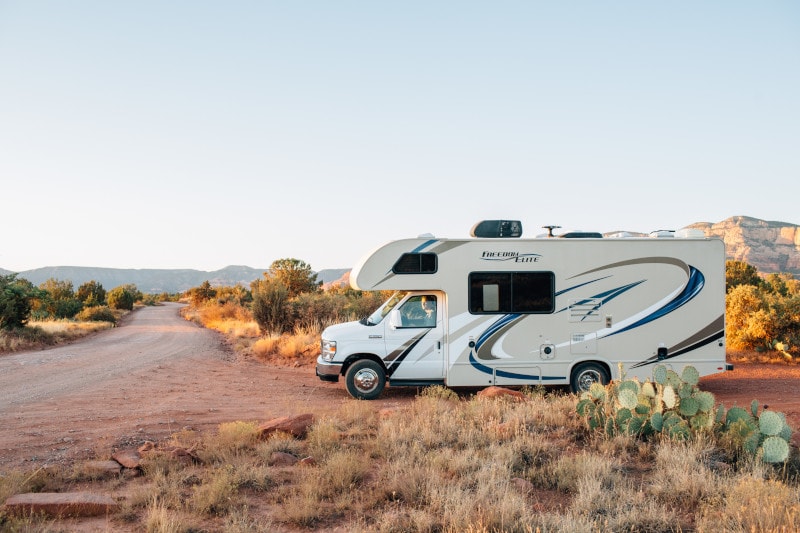
Cost Savings
Having your own RV can mean significant savings compared to the costs of a typical vacation with flights, rental cars, accommodations, and meals out. Especially with kids and/or picky eaters, having your own kitchen and meal planning is not only cost-effective, but also offers peace of mind.
There’s a huge variety of campgrounds out there, from rustic state parks to luxury RV resorts. Even among the different types of campgrounds, rates vary regionally and seasonally. Some places charge additional fees for children and pets. When you take the time to research and plan in advance, camping is not only budget-friendly, it can provide the opportunity to stay in a prime destination for significantly less than the cost of a hotel room or vacation rental.
Some RVers cut even more costs by boondocking , or camping at a free or inexpensive site with no hookups. While “camping” in a Walmart parking lot isn’t exactly what RV dreams are made of, it’s a great alternative for a free overnight en route. (Always remember to call ahead and get permission from the store manager, and keep those slides in and tank valves shut.)
Other Financial Considerations
The vehicles you already own can have a big impact on the budget and type of RV you should look to buy.
Towable RVs come in a wide variety of sizes and price points. If you already own a truck that is capable of towing, a trailer can be an affordable entry into RV ownership. Another advantage of towable RVs is that you only have one vehicle engine to maintain, compared to a Class A or C with a tow car.
A note of caution: Don’t rely on word of mouth and make assumptions about your vehicle’s capability to tow or be flat towed. Be sure to check the manufacturer’s information about your specific vehicle—including the year, as this can vary.
Another financial consideration is how handy you are. With the time and ability to refurbish an older RV, you could stick to a tight budget and even have an RV that retains resale value. Otherwise, make sure you budget out for repair and maintenance costs.
Is an RV a Financial Investment?
The short answer is no. With the exception of some in-demand vintage models, the value of an RV depreciates over time. An RV is an investment in a lifestyle, but you can mitigate the expense by renting it out when not in use through a third-party rental site like Outdoorsy or RVshare .
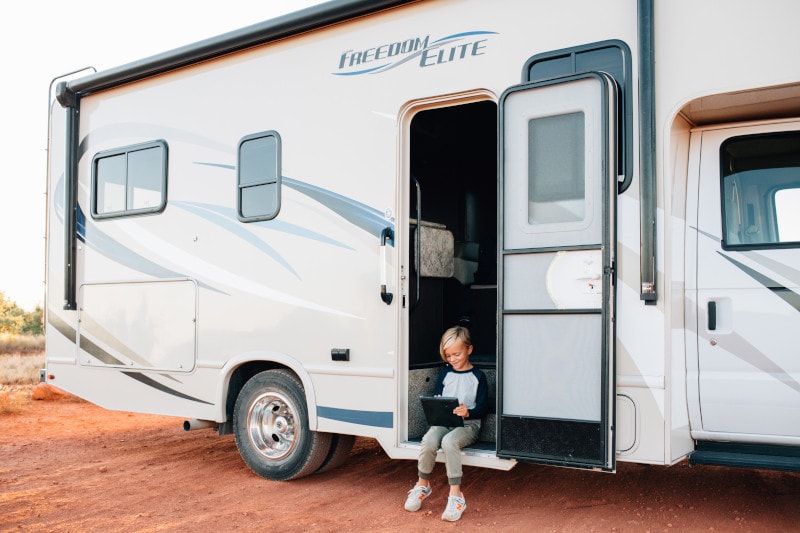
The Personal Investments of Owning an RV
Why do you want to buy an RV? Do you want to unplug, escape from everyday demands, use it as a hotel on wheels, or spend more time together as a family? The stronger your “why” for owning an RV, the more likely you are to find value in the purchase. Owning an RV is more time consuming than just booking a hotel or Airbnb. If you’re not honest about why you want one, or don’t have the buy-in from other family members, it can become a burden instead of a joy.
Some ways we’ve found the personal investment worthwhile:
1. Family Bonding
Our family has bonded strongly through the shared experience and adventure of RVing. Especially now that we’re no longer full-time RVing and the kids are getting older, taking an RV trip for even just a few days brings us all closer again.
2. The RV Community
We quickly found that campers and RVers are some of the friendliest people around. For the kids, campgrounds are an ideal environment to gain independence by joining in games with new friends. Virtually, online RV groups provide a wealth of information and support.

3. Pet-Friendly Travel
RVing is a convenient way to travel with pets. Our dogs love the excitement of new surroundings and going on hikes. And if we go out to explore without them, we can leave them in the comfort and security of the RV, just like at home.
4. Getting Closer to Nature
I’m not gonna lie: We spend plenty of time inside the RV enjoying the creature comforts of air-conditioning (or our toasty electric fireplace), DVD players, and plugged-in devices. Even so, being outdoors is an integral part of RVing, whether it’s hiking a national park, throwing stones in a nearby creek, or simply sitting around the campfire.
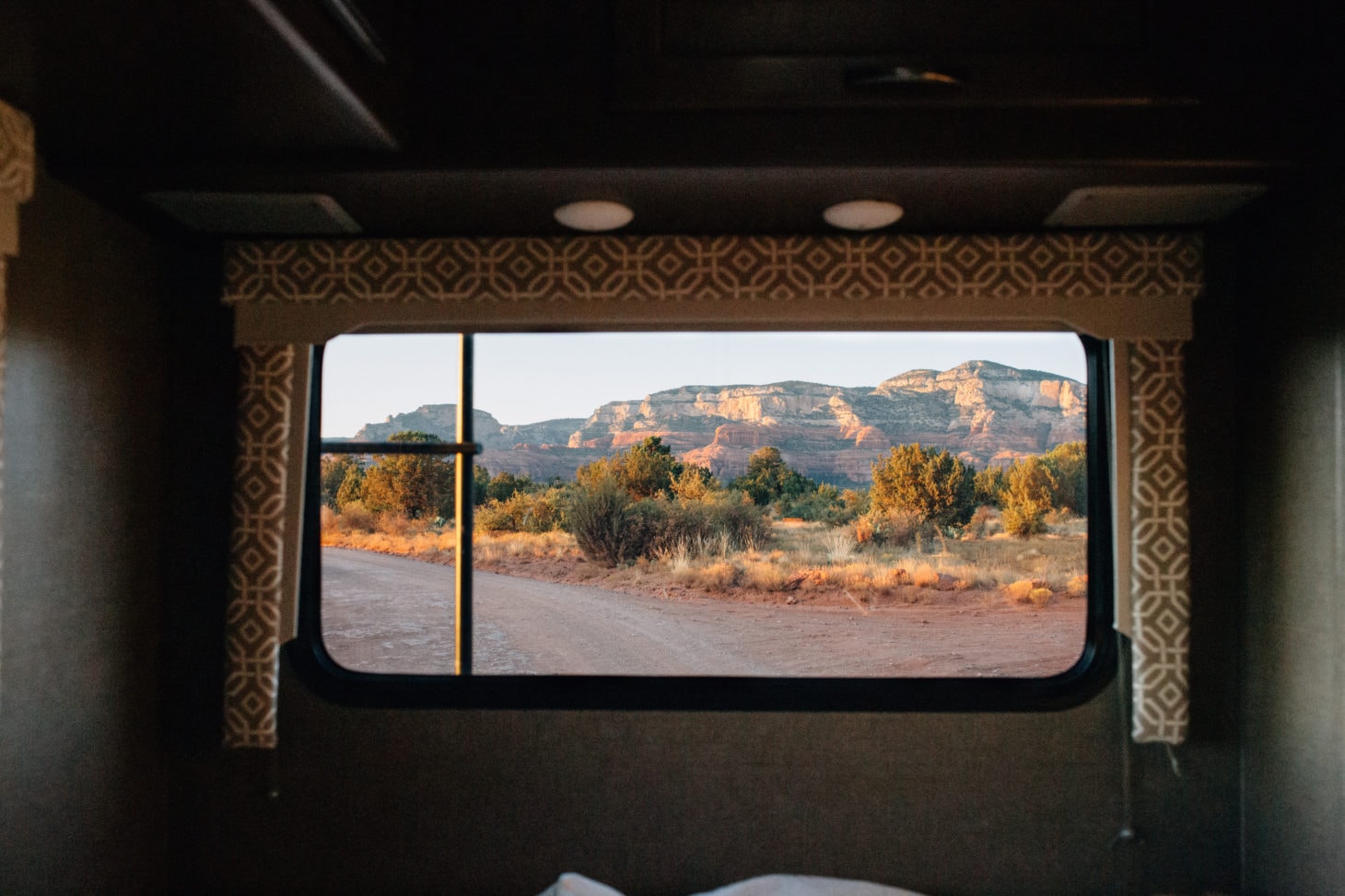
5. Versatility
From amenity-filled resorts to boondocking on BLM land, you can change it up as your budget and preferences allow. If you find yourself parked next to annoying neighbors, you can move. If you unexpectedly fall in love with a place, you’re free to extend your stay. Instead of having a vacation home in one location, an RV allows you to explore a variety of places from the comfort of your home on wheels.
Benefits to Owning an RV During COVID-19
Now more than ever, owning an RV can allow for safe and responsible travel. Even if you’ve never considered RV ownership in the past, this might be the time to do some more research into your first RV purchase.
1. Self-Contained Environment
RVing is uniquely suited for travel during a pandemic. You have control over your environment with a self-contained bathroom, kitchen, and living area. If you meal-plan and pack diligently, you won’t have to set foot inside a store. And camping in a natural setting is not only a welcome respite, but it lends itself to social distancing.
2. Again, Versatility
An RV gives you the flexibility to stay put or move depending on changing restrictions and personal comfort. It also allows you to get a much-needed change of scenery while not straying too far from home by simply camping at a nearby park.
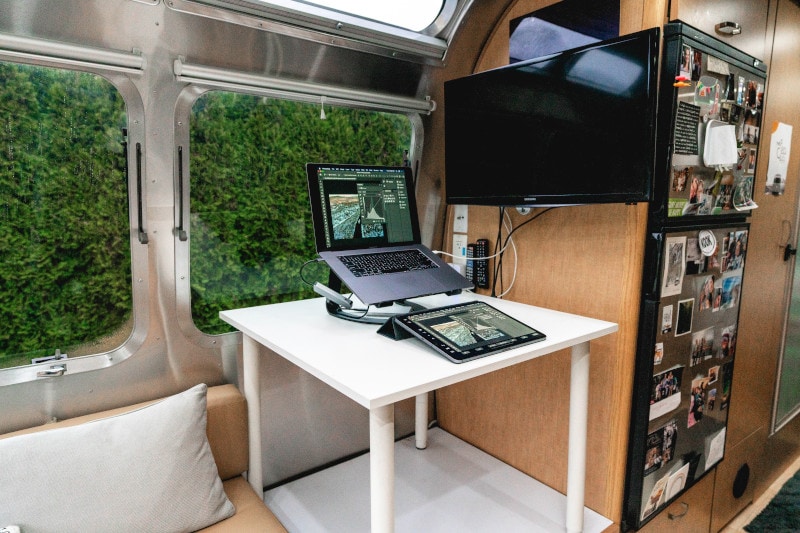
3. Remote Work
Working remotely opens up the opportunity to RV more. Pre-pandemic, I specifically looked for a fully-remote position because I knew we wanted to keep traveling over the summer and during school breaks. It takes extra planning—making sure you have a good cell signal, coordinating travel time around scheduled calls, and finding a quiet place to work (like the RV bedroom, at a picnic table, or campground lodge)—but if you have some flexibility with your work hours, it’s a great way to spend more time RVing.
4. Extra Space at Home
Finally, there is an additional value that comes into play if you’re able to park the RV at your residence: It can be used as a home office, classroom, guest room, or whatever your family needs. Backyard sheds are also popular, but you can’t take those with you on your next road trip.
Evaluating If RV Ownership Is Right for You
RVers value the extra space, proximity to nature, flexibility, and convenience of owning an RV, especially when there are travel restrictions in place. And while some might view the costs and maintenance as a negative, it’s up to you to decide if the pros outweigh the cons for your personal situation. The answer will be different for everyone—but most folks find that owning an RV is worth it, if you have the time and money to use it.
Meet the Authors

Michelle Neale
Since 2016, Michelle has been RVing around North America with her husband, two kids, and two dogs. She's written for national publications including ROVA Magazine and Redbook.com. She has a passion for photography, hiking, the National Parks System, and raising her kids with a love and appreciation of the outdoors.

Roadtrippers
Roadtrippers helps you find the most epic destinations and detours—from roadside attractions to natural wonders and beyond.
Get the most inspiring stories from the road sent directly to your inbox.

- Trip guides
- Trip Planner
- Sign up Log in Sign out
- Log in Sign out
- ROADTRIPPERS MEMBERSHIP
- RV RESOURCES
Plan your journey, find amazing places, and take fascinating detours with our app.
We couldn't find an existing Roadtrippers account using that service. Please try signing in with another option or create a new account with Roadpass.
We need your email address to send you trip itineraries and other updates.

Pros and Cons of travel trailers (And comparison to motorhomes)
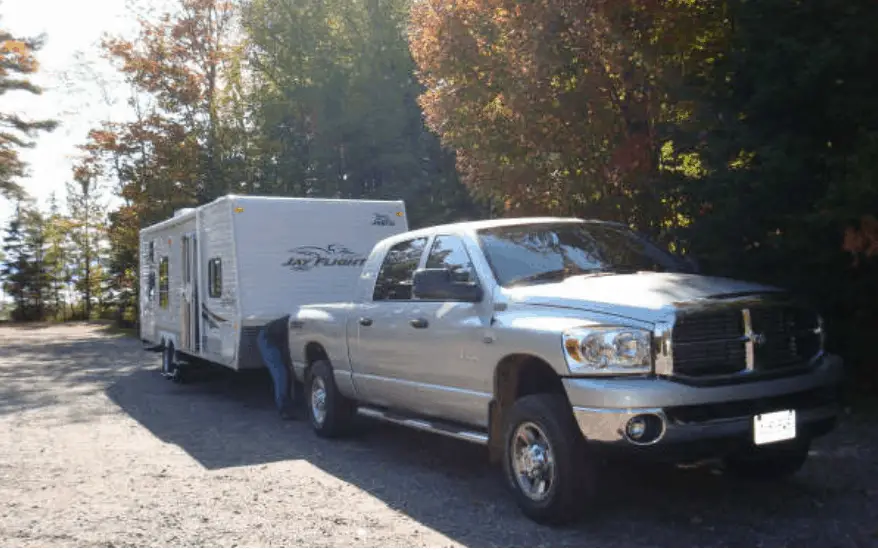
- BEGINNERS GUIDE / BUYERS GUIDE
G. Yoganand
Rving around campsites in US is an great adventure and a lot of people also do it full time. Among different types of RV’s the broad categories are towables and non towables. Towable include travel trailers, fifth wheels and tent trailers. Where as engine attached RV’s include motorhomes like class A, class C RV, class B rv and also class super C RV. In this article let’s explore all the pros and cons of a travel trailer in comparison to a motorhome or even a fifth wheel.
Lets check out pros of travel trailers first in detail.
1. Less costly
Rv’s in general are known for their higher prices. They are bigger in length , they accommodate people for living inside them, they give you many amenities which enable you to live inside them. And thus they cost thousands of dollars.
Travel trailers cost less as compared to other big motorhomes like Class C or class A. On an average a travel trailer cost around 15000 to 30000 dollars. This if you compare with other motorhomes is pretty much less. And thus, if you want to go Rving lifestyle then travel trailers are a great option.
Travel trailers come in between a very basic popup camper and bigger motorhomes. With tent trailers or pop up campers you don’t really get that kind of insulation and amenities but travel trailers are hard-sided and also give you decent amenities.
2. Dual use of towing car
Because you would be needing a car or truck to pull your travel trailer , you can make use of that car for other purposes as well. When you go camping at a Campsite or campground, you may not have certain facilities available near and during those times you will need a car to travel.
If you have a bigger motorhome then it may not be feasible for you to take that bigger RV everywhere. Also parking is very difficult with bigger motorhomes. So if you have a car with you, you can simply keep your trailer back and move on with that car.
You can also use your car to explore areas nearby. This is the same reason why people also tow car behind their motorhomes. So basically a car used to tow your trailer can serve dual purpose and you don’t have to rent a car specially for that purpose.
3. Insurance is not very high
Bigger the vehicle, bigger is the insurance cost in general. Travel trailers insurance cost can be anything between $150 to $500 per year. This, if you compare with bigger motorhomes like class A or class C RV is much lesser. Many people who do full timing in RV’s exactly know why it is important to get good rates on insurance.
$1,000 or more per year for insuring RV is definitely much of a cost. Travel trailers providing sufficient amenities are great if you also consider the other cost involved.
4. Maintenance easier as compared to motorhomes
Travel trailers don’t really have an engine attached to them. You are left with only RV parts which needs maintenance . You will be pulling the trailer with car/truck and the real maintenance will be with your car which has the engine, which needs to be taken care of.
Motorhomes have their engine attached and you really have to take care of the engine. Bigger the vehicle bigger is the engine and higher is the maintenance needed. With travel trailers you will be doing maintenance of the engine of the car which will be a normal affair.
The cost involved in bigger motorhomes is also high. You take your motorhome to professional and you could be charged anything about $100 per hour or so. With travel trailer we have to do regular maintenance which will not cost much and you can also do it at home as per your convenience.
5. Abundance of availability
Travel trailers are no doubt one of the popular RV types around the United States . That’s the same reason you will find so many options coming up. The abundance of availability also makes it possible that you can buy a travel trailer that exactly meets your needs.
The layout that fits your requirements, the amenities that you really need, the size, the length and the weight your car can easily tow. You will find plethora of models being launched every year.
There are several established brands that produce travel trailers of high quality and awesome layouts. Some of the top brands include airstream, Jayco, forest river, dutchmen, keystone, and many others.
6. Used travel trailer costs less
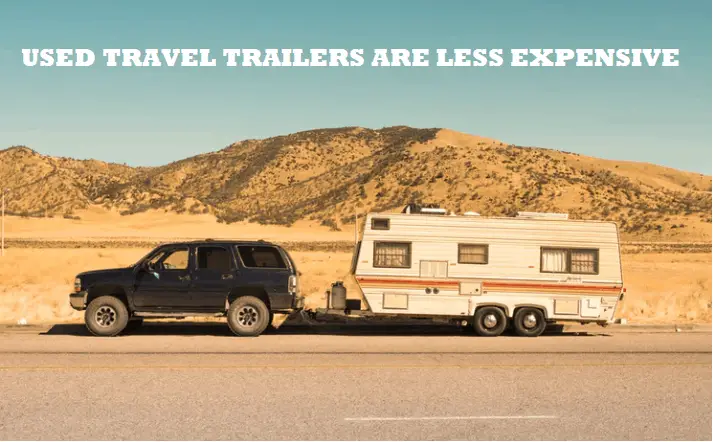
We already saw that travel trailers cost much less in comparison to other motorhomes. Used travel trailer market is also great, you can buy a travel trailer in $3000 or $5000 dollars as well. They do depreciate a lot and a new buyers can take advantage of this and buy a used travel trailer at much lesser cost.
Most people who start rving can look for used travel trailers as their first RV. With brand new RV costing you thousands of dollars one can try a used travel trailer as a first RV by investing much lesser amount.
7. Overall economically RVing style
Travel trailers overall are economical. Their insurance cost is less, initial cost is also less, the maintenance cost is also reduced. Even if you compare the gas spending its much less in comparison to what you would be spending on a bigger motorhome.
8. Great RVing experience
If this is going to be your first RV then rest assured that travel trailers will give you all the experience that a normal RV or motorhome would give you. On top of that you are also not spending a huge amount. RV is better if you compare with camping in tents or even if you are exploring areas by staying in hotels. Because of all the points that we discussed about travel trailers happens to be most peoples first RV.
Cons of travel trailers
Sure they do provide lot of advantages at the price at which they come but remember you also have to deal with lot of disadvantages that come with them. A person who is just starting rving can look up to travel trailer as the first RV but if you’ve already experienced a bigger motorhome then travel trailers can be a difficult thing for you. So are travel trailers really worth it? Let’s explore all the disadvantages of owning a travel trailer by an individual or even married couples.
1. Towing difficulties
One of the things one need to be careful when owning a travel trailer is the towing capacity of the car. You may have difficulties in towing the travel trailer if the connection hitch between your car and travel trailer is not so great or if you overloaded your travel trailer. Not so capable car or truck can cause issues in pulling the trailer as well.
You need to pay special attention before you start pulling the trailer. Because you will be sitting in a car and the trailer will be a different entity altogether you will always have some doubts unless you are very much sure.
Overall it comes with this disadvantage that you need to be very sure and check the hitch every single time. If you overloaded your travel trailer then you may find that car will have difficulties in towing the trailer specially during steep slopes.
2. Cant travel inside it
Travelling inside travel trailer is not allowed in almost every state. Thus it restricts how many people can really go along. You will be sitting inside the car which again will have limited seats. On the other hand if you own motorhome, people can be inside it and thus a lot of people can travel along. Other towable RV’s like fifth heel can be towed using a truck and this again restricts the number of people that can travel in them.
3. Amenities lesser as compared to bigger motorhomes
Travel trailers offer amenities that may not be great if you compare it with class A motorhome or a super class c motorhome. If you are looking for luxury RV then travel trailer may not be the one for you.
You will get a compact kitchen, a refrigerator, a living area,sleeping area which will be limited in space. You will get layouts that may include amenities that will exceed average travel trailer but then again the length of the travel trailer will be huge and that can be difficult for your car to tow.
More the amenities packed inside, larger will be the length and difficult it is going to be for you to tow it. If your requirements are of a luxurious RV on road then you may want to check full-fledged motorhome instead.
3. Restricted traveling
Travel trailers also restrict where you can go because you are towing a entity that’s not really attached to your car. Thus, that really restricts the paths that you can take to access different regions. You really have to think about roads and where you are heading. The trailer which is not really connected to your car will always keep you on your toes.
4. Smaller space
Travel trailer obviously have less space inside and you are forced to make use of sleeping areas, living areas which are compact in size. Getting a bigger trailer again puts pressure on your car so that’s really not a great option either. If you really want to have bigger space then motorhomes are better option. Space organization in rv is thus important.
5. Comfort : lesser in comparison to motorhomes
With travel trailers the comfort is not as good as in case of motorhomes. If you have experienced a class A motorhome or a bigger Class C motorhome you know how it feels like being there in your Living area or even in the kitchen space.
Travel trailers even though can be 30 feet or even lengthier provide you with comfort that is not so great. Its just enough to be able to RV around in campsites and enjoy moderate amenities. You do get travel trailer with layouts that will give you full kitchen, a king size bed and also give area that is much bigger but then again you are talking about a huge and heavier trailer that has to be towed by a normal car.
6. Insulation : less than motorhomes
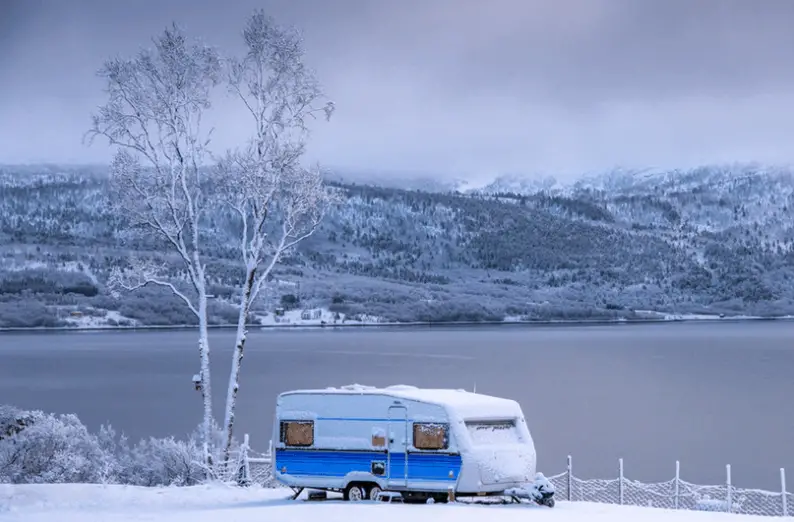
If you have any plans of full timing in a travel trailer then you need to pay special attention towards the insulation specially during cold weather or winter time. Travel trailer is definitely better than a Canvas pop-up Camper. But if you compare it with bigger motorhome it may not provide you great insulation. When the mercury is falling you know how difficult it is inside a RV. Travel trailers are hard-sided but even a small gap can make the temperature fall very rapidly inside the travel trailer.
8. Parking difficulties
Parking a travel trailer at a normal location can be challenging because you are talking about an overall length then that can be lengthier. You will have your car or truck in addition to a lengthy travel trailer so overall parking can be difficult not only at normal parking locations but also at Campsite locations. Most campground will have different parking length limitations. They also have different lengths for travel trailer and motorhomes. In most cases you will see travel trailer lengths limitations is less as compared to what they have for motorhomes.
You Might Also Like
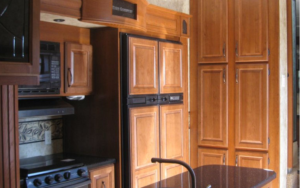
How long do RV refrigerators last
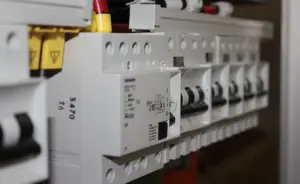
15 RV Electrical Problems And Troubleshooting Them
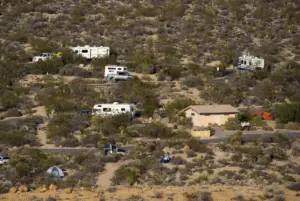
Top 5 Full Hookup RV Campgrounds in Northern California
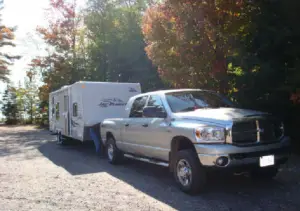
Best Jayco RV’s Under 5000 lbs

- Find a Location
16 Best Travel Trailers of 2023: Ultimate Buying Guide
The Coleman Lantern LT 17B is a 21.5-foot-long travel trailer that sleeps five and weighs just over 3,000 pounds dry . This small package camper offers a queen bed, two bunk beds, and a dinette. The two-burner stove and microwave make for simple cooking, and the fireplace and air conditioner allow you to camp comfortably in cool and warm climates.
For those who need a little more space, the Coleman Lantern 285BH offers just under 33 feet of travel trailer and sleeps up to eight campers. In addition to the queen bed and double bunks, a reclining sofa and booth dinette give your family the convenience of camping without sacrificing living space. Pass-through storage and plenty of cabinet space ensure you won’t forget the necessities, either.
Heartland Mallard
Heartland’s Mallard concept allows you to camp in style and comfort with various unique floor plans to fit your needs. These popular travel trailers are ultra-light and feature an open concept to marry convenience with function.
Heartland Mallard M335
For those seeking a more open floorplan for their travel trailer, the Heartland Mallard M335 fits the bill. The Mallard M335 comfortably sleeps three people, thanks to three slide-outs and a king-size bed.
The rear-living area allows you to entertain a group of friends or family in style. Its kitchen features a large microwave, an eight cubic-foot refrigerator, and a kitchen island with plenty of counter space and a full-size sink.
Heartland Mallard IDM185
Need something a little smaller but with extra sleeping space?
The Heartland Mallard IDM185 offers two single bunks, a queen bed, and a dinette that can fold down for extra sleeping space. Asmall bathtub in the bathroom helps the kiddos stay clean after a long day of outdoor fun
Forest River Ozark
The Ozark line of travel trailers from Forest River is lightweight and easy to tow, but they don’t sacrifice amenities. Our two picks from this brand pack plenty of features and show why they’re some of the nicest travel trailers you can buy.
Forest River Ozark 1530VBK
The Forest River Ozark 1530VBK is an excellent fit for smaller families who don’t mind getting cozy. This 18-foot-long trailer weighs just under 3,000 pounds, but don’t let its short length deceive you.
Two flip-down bunks and a queen bed give you the sleeping space you need, while the kitchen countertop and two-burner stove make cooking for your campsite convenient. A relatively roomy bathroom—complete with a 36 in. x 24 in. shower—rounds out the benefits of this top travel trailer.
Forest River Ozark 2800THKX
For those who need a travel trailer with toy-hauling capabilities, the Forest River Ozark 2800THKX is a 33-foot, 7-inch long camper that combines many of the best features of travel trailers with excellent storage for your ATV or bike. This family-friendly toy hauler sleeps six.
Other features include a full bathroom with linen space, plenty of kitchen counterspace, washer and dryer prep, and a stove with an oven. This model is excellent for families or friends who want to take their toys – and the comforts of home – on the road.
Heartland Pioneer
Heartland builds many of the top travel trailers, including their Pioneer model. The Pioneer starts at 22’5-3/4” and 3,690 pounds. It provides many unexpected amenities, such as an eight-cubic-foot gas/electric refrigerator. Some floorplans even include fireplaces.
Heartland Pioneer RL250
Heartland’s Pion eer RL250 is a rear-living model with a dry weight of 6,134 pounds. This 30.5-foot-long travel trailer sleeps five. Thanks to a slide-out with a sofa and dinette, you can provide plenty of entertaining space for you and your guests. The angled kitchen and double sink make cooking and cleaning easy and convenient.
Heartland Pioneer RD210
The Heartland Pioneer RD210 is a more compact model from Heartland that doesn’t sacrifice comfort. This camper sleeps four thanks to a queen bed in the front and a folding dinette and sofa in the rear.
While it doesn’t have a slide-out, there’s still plenty of seating. Campers can also use the three-burner stove, oven, and double sinks.
East to West
East to West makes two different models that made our list of best travel trailers. These campers feature standard features like king-size beds, enclosed underbelly, and plenty of storage.
East to West Silver Lake 27KNS
The Silver Lake 27KNS is a spacious travel trailer that sleeps up to eight people. It’s equipped with modern amenities, including shaker-style cabinets, a booth dinette, oven and stove, microwave, double bunk beds, and a bathroom with plenty of residential-sized shower space.
East to West Della Terra 29KS2
The East to West Della Terra 29KS2 is 32 feet long and comfortably sleeps four people. It has two slide-outs and an island kitchen with ample counterspace for your cooking and entertaining needs. The Della Terra also provides excellent storage space, with plenty of cabinets.
Explore all East to West Della Terra RVs.
Coleman Rubicon
Coleman’s Rubicon line of lightweight travel trailers offers flexible floorplans you can tow with most vehicles, making them some of the most recommended travel trailers available.
Coleman Rubicon 1200RK
The Coleman Rubicon 1200RK is relatively affordable, making it great for couples new to RVing who want to take a travel trailer on their journeys. It’s 13’5” long and weighs just over 1,600 pounds. This means you won’t have to invest in a full-size super-duty truck to tow it where you want to go.
Other convenient features include a fireplace, outdoor camp kitchen, side mount A/C unit, and the ability to park inside a garage.
Coleman Rubicon 1628BH
For those needing more space and features than the Rubicon 1200RK, the Rubicon 1628BH might be for you. This travel trailer sleeps up to five people and comes equipped with a queen bed, a set of bunks, a kitchenette, and a booth dinette.
Dutchmen Atlas
The Atlas travel trailer from Dutchmen is another well-loved model that can sleep up to eight people, depending on the floor plan. Most Atlas models have slide-outs that expand the space and allow you to entertain with many of the comforts of home.
Dutchmen Atlas 2922BH
The Dutchmen Atlas 2922BH is a 33’10” trailer that weighs just over 7,000 pounds. This model comfortably sleeps eight, thanks partly to its slide-out sofa sleeper.
In addition, the 2922BH provides two double beds in the bunk room and a queen bed up front. An L-shaped kitchen with a refrigerator, microwave, stove, and double sink makes cooking and prep a breeze. The bathroom is relatively roomy for a camper and even offers a mirror medicine cabinet.
Explore all Dutchmen Atlas RV models.
Dutchmen Atlas 3202BH
At 36’10”, the Dutchmen Atlas 3202BH is another bunkhouse-style model that comfortably sleeps up to 12, making it one of the biggest travel trailers on our list. A double slide-out with home theater seating and a u-shaped dinette gives you plenty of space to entertain, whether cooking meals or catching a movie after a long day outdoors.
Dutchmen Atlas 2202RB
For those who want a 26’10” option, the Dutchmen Atlas 2202RB comfortably sleeps three people. The 2021 model features a single slide-out that accommodates the sofa with a chaise lounge and refrigerator.
In addition, a three-burner stove, oven, and microwave give you plenty of cooking options. One of the best features of this Atlas floor plan is the bathroom, with a residential shower and plenty of space to move around.
Starcraft Superlite
The Starcraft Superlite features fiberglass walls to lighten the trailer but keep it going strong for years. Other standard features include low-maintenance roofs, dual liquid propane tanks, and residential vinyl flooring that is easy to clean.
Starcraft Autumn Ridge 26BH
The Starcraft Autumn Ridge 26BH is 29’6” long and weighs 4,640 pounds. It comfortably sleeps eight people and offers a surprisingly roomy camping experience for its size.
This model offers privacy with two separate sleeping compartments: a queen-sized bed up front and double bunks in the back. The bathroom with tub/shower makes this a perfect unit for those with kids who may need a soak after a long day of hiking outdoors.
Shop the Best New and Used Travel Trailers
Finding the perfect vehicle for outdoor excursions has never been easier. Simply visit one of Camping World’s RV dealerships where our friendly and knowledgeable staff can help answer any questions and help you find the perfect travel trailers to meet your needs. Visit us today or use the list above as a guide to get started.
Popular Types of Travel Trailers
Different types of travel trailers make sense for varying needs. For some people, a tiny teardrop camper makes for comfortable camping. Others might require a full-size model with many of the same comforts of home.
Homes on Wheels

When people picture the absolute nicest travel trailers , they probably imagine the “homes on wheels” concept. These fully equipped models come with bathrooms, kitchens, bedrooms, and — in some cases — home theaters and fireplaces. While these travel trailers can put you in the lap of luxury, they’re often the most expensive options.
Teardrop campers get their name from their distinctive shape. These small, lightweight travel trailers usually have enough space for two people to sleep and a few basic amenities like a small kitchenette, storage space, and maybe even a toilet or shower.
Teardrop campers are popular because of their size, ease of towing, and affordability. They’re great for people who want to camp in remote locations or places where traditional RVs might not fit or be allowed.
Toy Haulers

Toy hauler campers are travel trailers that carry recreational “toys” like ATVs, bicycles, and motorcycles. The rear part of the trailer resembles a garage area with a ramp for loading and unloading. Toy haulers, including those that mid-size SUVs can tow, can come in different sizes. Some are fifth wheel models with multiple slide-outs and other amenities, including sleeping areas, kitchenettes, and bathrooms.
The combined living space and garage functions make toy haulers great for outdoor enthusiasts who want to travel to participate in activities like off-roading or motocross. Toy haulers are often heavier than other travel trailers due to the added weight of the garage. Make sure your vehicle can safely tow the trailer and your equipment.
Pop-up campers are travel trailers that are lightweight and easy to tow. They usually feature collapsible walls and roofs that can be raised to provide headroom and living space. A collapsed pop-up camper is much smaller than a traditional travel trailer. This makes them easier to tow and store than other types of popular travel trailers.
Pop-up campers are an excellent fit for budget-conscious campers who want convenience without the expense or weight of larger models. They’re a perfect fit for off-road adventures, too. If there’s a downside, it’s that they don’t provide much insulation or protection from the elements compared to other models.
Pros and Cons of Travel Trailers
Like any camping equipment, owning a travel trailer has pros and cons. Before you buy one of the popular travel trailers on our list, consider the following:
Pros of Travel Trailer Ownership
- Lots of space: Travel trailers can offer lots of living space. This makes them an excellent choice for families or friend groups who want to travel together.
- Great amenities: The best travel trailers typically have features like full-size beds, kitchenettes with sinks and stove top burners, microwaves, refrigerators, A/C and heating systems, and slide-outs that can expand the living area.
- Flexibility for traveling: Unlike motorhomes, you can unhitch your travel trailer from the tow vehicle once you reach your destination. This lets you explore the surrounding area without taking the whole camp along for the ride.
- Affordability: Compared to drivable motorhomes, travel trailers tend to be more affordable in both purchase price and maintenance costs.
Cons of Travel Trailer Ownership
- Towing challenges: A travel trailer requires the right tow vehicle with enough power to pull the weight. Inexperienced drivers may find maneuvering on the road or backing up into tight spaces challenging. For more information on determining if your vehicle will work, check out our tow guide .
- Storage space: Larger travel trailers require a lot of space. In most cases, HOA or municipal regulations prohibit storing them on your property. That means finding and paying for a permanent storage location.
- Maintenance costs: Travel trailer maintenance costs can add up quickly, like any vehicle or home on wheels.
Frequently Asked Questions About Travel Trailers
Before we wrap up, let’s address some common questions about travel trailers:
What is the most reliable brand of travel trailers?
While all the travel trailers on our list are great options, reading reviews and talking to people who know the products well is important. Jayco, Thor, Coleman, and Winnebago have spent decades building their reputation for quality travel trailers.
Is it worth it to own a travel trailer?
Whether or not you view the travel trailer as a good investment depends on your unique situation. Every family is different. If you want to explore the great outdoors regularly but not at the expense of home comforts, a travel trailer can offer the right balance of amenities and flexibility.
Travel trailers do require maintenance and a suitable vehicle to tow them around. If you don’t like the idea of dealing with a trailer, other RV options—including Class C RVs and camper vans—may be a better fit.
What is the average lifespan of a travel trailer?
Travel trailer lifespans depend on many factors, mainly usage, maintenance, and storage conditions. You can enjoy your travel trailer anywhere from 10 to 20 years with proper care and maintenance. If you don’t maintain it or frequently expose it to harsh weather or neglect, it can severely limit your use time.
How much should I spend on a travel trailer?
How much you spend on a travel trailer depends on what you think is essential. You can find used, lower-end models for under $10,000. Larger travel trailers with luxury amenities can cost upwards of $100,000. Consider your budget and what features are essential, and don’t forget to factor in storage fees.
If you’re curious about the affordability of a travel trailer or payment plans, ask about RV financing .
What questions do you have about some of the best travel trailers? Let us know in the comments below.
Leave Your Comment Cancel Reply
Save my name, email, and website in this browser for the next time I comment.
Shop By RV Type

Your Adventure Awaits
Copyright © 2023 cwi, llc all rights reserved.
- RV Glossary |
- Privacy Policy |
- California Privacy Rights |
- Do Not Sell or Share My Personal Information |
- Targeted Advertising Opt Out |
- Terms of Use

The Savvy Campers

What to Look for in a Travel Trailer (2024 Buyers Guide)
It took us over a year to find the perfect travel trailer that fit our needs. We looked at all different brands and price points. What was most difficult is that many brands have almost identical trailers, but with one small difference. We learned there is not the perfect trailer, we found ourselves stating time over time, “if only this was a little different:, or “if only this feature was a little to the left like the other brand”. If you can find a trailer that gives you 90% or more of what you want, it is the perfect one for you. Below is the Travel Trailer Buying Guide we have created with the steps and questions we asked when we were travel trailer shopping which helped us find our perfect trailer. Learn about our favorite trailers under 3,000 pounds and under 5,000 pounds .
How heavy of travel trailer can you tow?
The first question you need to ask, is if you are using a current vehicle, or will be buying a new vehicle for your towing needs.
If you are utilizing your current vehicle, research your tow rating to know what you can safely tow. Trailer Life has tow guides they publish every year to help you determine your capacity.
After you determine you are able to tow a certain amount, lets say a maximum of 7,000 pounds. You will want to multiply that number by 80% to give you some leeway. The 7,000 towing capacity will turn into a 5,600-pound trailer completely loaded. By only utilizing 80% of your towing capacity, you are giving yourself some extra capacity to not strain your tow vehicle too much. With our current setup, we are about 50% of our tow capacity.
Typically the dry weight listed on a travel trailer is before accessories and add ons, so I would add on another 400 pounds. Your awning, batteries, propane tanks, etc. typically are not listed in the dry weight. Remember all that food, clothing, ice, water, beer, games, BBQ , extra propane that you packed? Well that weighs more than you think. The easy way to determine this added weight is to unload your trailer, grab a scale, weigh yourself with no items, then as you reload the trailer, weigh yourself every trip and mark it down. Chances are that this may be another 500+ pounds of items you add.
In our case, our travel trailer’s dry weight is 3,700 pounds, optional accessories of about 400 pounds, tank water capacity of 680 pounds, and food and gear is 500 pounds, our total weight may be 5,280 pounds. We have added 1,580 pounds to our starting weight that needs to be within our towing capacity. Given our capacity to tow is 9,400 pounds, a loaded 5,280 pound trailer is right around 56% of our rated towing capacity. I wanted to stick to around 50-60% capacity as we go over lots of mountain passes and steep grades where we camp as not to overwork the truck. To get the best idea of your weight, tow to a weigh station and weigh once with the vehicle, then once with the trailer and subtract the vehicle weight to get your exact towing weight. This will come in handy while tuning your weight distribution hitch. Learn about the average weight of travel trailers .
What length of travel trailer is right for us?
Once we have determined the weight of what travel trailer we can tow, next determine if there are any size limitations to where you will be parking it for storage. Don’t buy a 27’ trailer if you can only fit 22’ in your driveway unless you want to pay for offsite storage. Along with fitting your trailer where you will be storing, consider the locations you will be camping, and if there any size limitations in these sites.
We typically camp in national parks and one specific spot we have to book 6 months in advance and you get what you get come January 1 st when booking opens. If you get an 18’ pull through spot don’t think a 25 foot trailer will fit in there. We purchased a Winnebago 2106DS which is 21 foot from the bumper to the tongue. We previously rented a 1700BH which actually measured 25’ from bumper to tongue. The listed sizes on the model numbers don’t don’t necessarily relate to the true size of the vehicle. If you plan on going to national parks, check out Recreation.gov to find stats on your favorite campgrounds and make sure to find a trailer you can fit in these parks. An example of campground stats is to the right.
What is the best travel trailer floorplan?
Once you have a good idea of size and weight, now is the time to consider your needs. Do you have 3 kids and need a bunkhouse, is it just you as a single person looking to get away. Are you staying for just weekends or for months at a time? I cannot help you decide on what floorplan to get, but I can tell you that we started looking for a 24’ bunkhouse, almost stepping up to a 26’ as they also had a couch. I had been researching trailers for some time and read to always buy smaller than you think. We rented a 1700BH and realized that for our needs we needed a place to sleep as we have a newborn and a place to hang out in while it rains.
I was trying to get my wife to purchase an 18 footer, but we ended up with a 21’ and am glad we went a little bigger. For the size we gained a larger bathroom, and a straight murphy bed which allows us to both get out of the bed on our own side in the middle of the night to use the restroom. VERY IMPORTANT! You do not want to have to crawl over your significant other unless you have to, especially if you have a baby trying to sleep 5 feet away. Make sure you try the bed out with your significant other before you buy, some couches that fold down for the “master bed” are not long enough to fit an adult. I am glad we did not find this the hard way. Awning size is also important if you plan to spend time out in the sun, or the rain. We looked at similar units and some had 10’ awnings and some had 16’ on about the same size trailer.
How much storage do travel trailers have?
Make sure to consider storage options while trailer shopping, you need to have room for all of your hiking gear, bbq, wood, food, clothes, rugs, chairs, etc. Everything needs to fit somewhere. The space under the front of the trailer understood as pass through storage is also called the “basement”. The door size is critical, make sure it will fit the size of your bbq or generator or larger item you want to store in there. Rubbermaids are available in many sizes, on my unit, my basement is limited to 11” in the middle and I was able to find Rubbermaid’s that were 10.5” to fit in there. YES, something finally actually worked out.
Should we get a slide out?
Slide outs are great, they expand your living space at the press of a button, but they do come with their downsides, they will add weight, up to 1000+ pounds depending on the size, and they can leak and may not be insulated as well as the total hard shell trailer. We opted for a slide out to expand our living area with the needed room to put our babies pack and play. One important item to look out for is make sure you can walk around to make lunch or use the bathroom with the slide closed. It comes in handy to be able to use the trailer when on the road or stopped for a break without having to move out the slide.
Food Storage in your Travel Trailer
Making sure you have a 6 cubic foot refrigerator and freezer in your travel trailer is important but not necessary. As you can see from our messy fridge photos 6 cubic foot fridge holds A LOT of food. We recently went camping for 7 nights and fit all of our food, beer, drink mixers, bag of ice, and a full-size Costco lasagna with room to spare. For shorter trips, a smaller fridge would work great as well, or you could opt to use a cooler in conjunction with your fridge. Pantry’s for dry storage are helpful so you can see what food you have and make food prep easier. Our Winnebago has a pantry about 1’ deep and about 2.5′ wide with three shelves and fits a lot of food. We saw many trailers with minimal food storage places so be careful when looking.
4 Season Trailers?
Weather comes in all shapes and sizes, from hot to cold. You cannot go wrong with finding a unit with better insulation which will help you in the heat as well as the cold. An enclosed underbelly that is heated is a great plus, however, this may not solve your problem if you do want to camp in 0 degree weather. You may need additional 12v tank heaters. The problem is that it is only heated when the heat is on, if you go on a winter hike and turn the heat off for the day, the area underneath isn’t heated and still could freeze. If you had 12v tank heaters it would be.
The meaning of four season can vary from trailer to trailer so make sure you understand what you are getting. A trailer with exposed dump valves is truly not a four season trailer. Our unit is a “4 season” travel trailer, and I am surprised by all the cold areas in certain spots. The windows let a lot of cold air in as well as the metal window frame gets very cold. If you can find one, get one with the thermal windows if you will be doing extended winter stays. If you are just staying the occasional weekend in the winter, don’t bother on the extra money, the little bit more comfort will not be too noticeable. Ducted heating along with the 4 season package will help out with comfort, our unit has two ducts, one in the restroom and one in the main room. The only disadvantage is that the main duct blows right on the thermostat causing the trailer not to get fully warm towards the front. I plan to either move the thermostat and/or add a duct to blow at the bedroom area in the near future.
Do Travel Trailers have Warranties?
From what we have seen, travel trailers typically have a one year warranty . We have seen a few brands with a two year warranty with Jayco being one of them. Some dealers offer a “lifetime” warranty but you need to spend money every year for the dealer to “check it out” which may or may not be worth it.
Fun Features on Travel Trailers
Don’t get blinded by the remote control everything, integrated wifi extender or built in Fantastic fan, yes these are nice additions that you may eventually get, but make sure you get a good base trailer to start with. If they are adding fancy features on a cheap trailer, what are they skimping out on to make that price point? We have found many new trailers come with awesome features, learn more about our favorites they come with .
How many windows do you need in a Travel Trailer?
We enjoy our windows and they are necessary for us to be happy as we are going camping to enjoy nature not sit in a dark box. If you are cooped up in the trailer due to a thunderstorm, wouldn’t it be nice to watch? Good ventilation is also important when camping in the summer months. Having two windows on either side of the bed are perfect for crosswind to help you cool down at nights.
Make Trailer Shopping Fun
It is a lot to work through all of these items to see what trailers fit in your wheelhouse and then narrow it down from there. Above all of these items, make sure you have FUN while travel trailer shopping, this can be a very stressful time as there are so many different brands that seem so similar, but could be drastically different. Do your research before you buy on the dealer just as much as on the trailer itself, make sure to check out different forum websites to see how other owners like their units as well as ask as many questions as you can think of.
There may be important things for you to look at in your particular situation but these are the items that fit our needs and what were important to us in our travel trailer buying decision process.
Be the first to be notified about FREE tips, hints, coupon codes, and email-exclusive information. All for FREE!
Related Posts:

Similar Posts
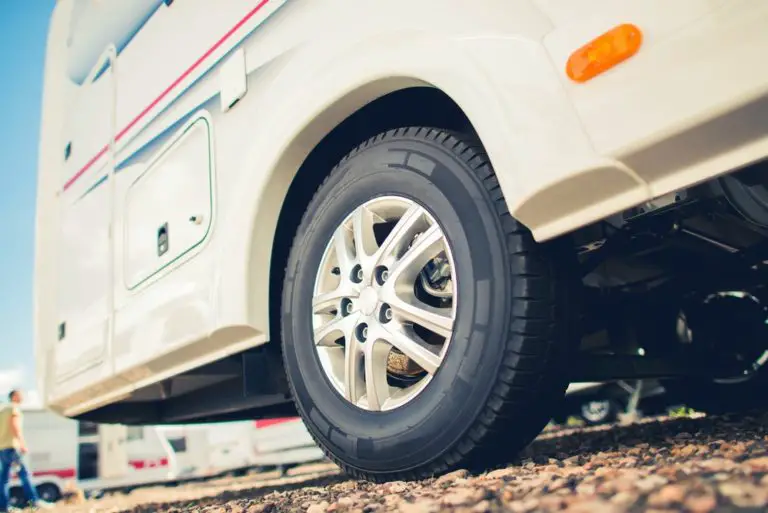
How Long Do the Brakes Last on a Travel Trailer?
When you purchase a travel trailer, it is absolutely necessary to have brakes on it. Regular vehicle brakes are not equipped to stop both the vehicle and a trailer that can weigh between 1,200 and over 9,000 lbs., not including the weight of extra items you put inside the trailer. Travel trailer brakes typically last…
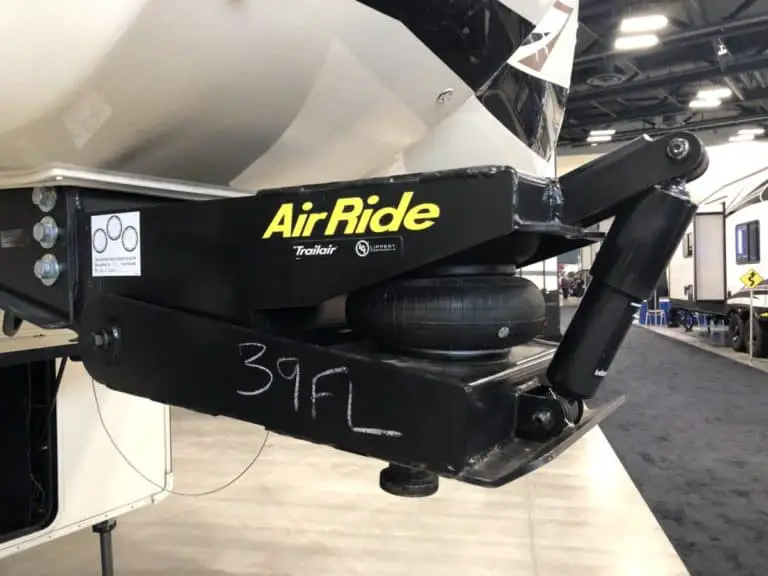
What’s the Difference Between 5th Wheel and Gooseneck Trailer Hitches for Campers? A Comprehensive Guide
While a 5th wheel and gooseneck trailer hitch are both capable of hauling large campers, they are vastly different in some ways. So, it’s essential to understand their respective benefits and downsides before you make an expensive purchase that potentially won’t suit your lifestyle. The difference between a 5th wheel and gooseneck trailer hitches on…
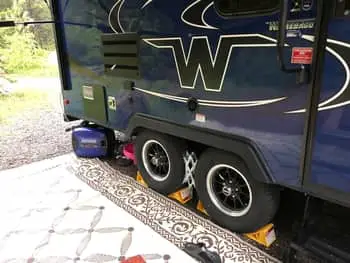
Best 6 RV and Camping Generators Reviewed for 2023
Many travel trailer owners go from plug in campground to plug in campground, but many will also go into the back country where there is no power available. Without power, your batteries will drain down and eventually leave you with no heat, water, light, etc. A good way to keep your batteries charged as well…
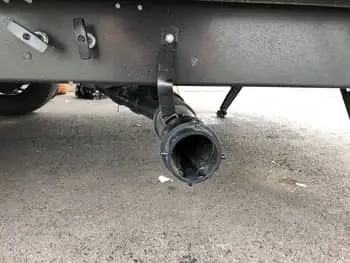
How Long will a Black Water Tank last in a RV?
When we go camping, there is always the question of will we need to move the RV to dump tanks in the middle of our trip, or how long can we go without dumping. This post should give you a clear idea of how often and when you will need to dump. How long will…
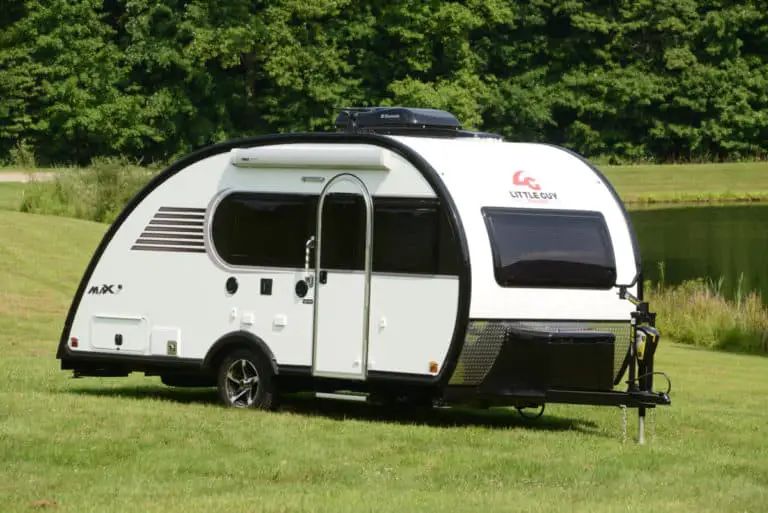
Is A Single Axle Travel Trailer Safe?
Whether you are hauling an RV, boat, or anything else that requires a trailer you will have to worry about what could happen if there’s a blowout or a braking issue. However, there is a fairly simple answer as to which travel trailer is safer between single axles and tandem axles. Is a single axle…
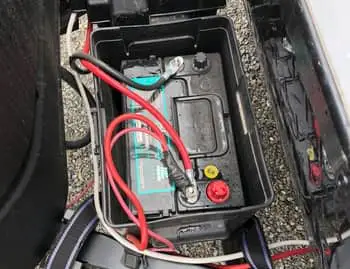
How Long Do Travel Trailer Batteries Last?
When looking to buy our new Travel Trailer, this battery life question kept coming across our minds. We have spent many nights in our trailer dry camping and we have a good idea of how long you will get out of your batteries. How long do travel trailer batteries last? Travel trailer house batteries typically…
Join our Newsletter to stay up to date on the latest RV topics and receive our FREE RV Inspection Cheat Sheet Today. Use this tool to inspect new or used campers you are looking at purchasing.
No thanks, I’m not interested!

Welcome To The General RV Blog!
Because RVing Is Awesome…
The Ultimate Travel Trailer Guide & the Best Travel Trailer Campers
Last Updated on November 17, 2023 by Christina
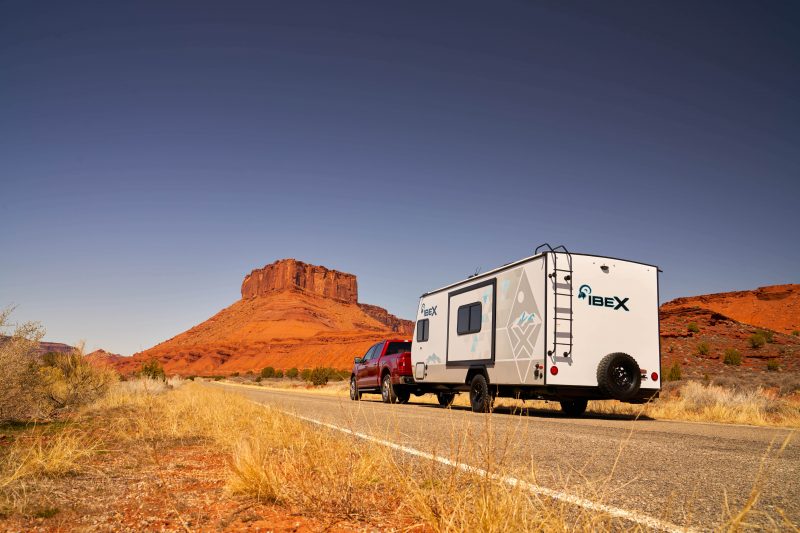
Not only are travel trailers the most popular type of RV, they are the most affordable. More families than ever are heading out to create their own Great American Road Trip and, for many, it starts with the perfect RV. Buying a travel trailer can seem intimidating, but with the right information, it can be an exciting and empowering decision.
Large families are going to have much different needs than solo travelers. Families who love kayaking and biking will need different travel trailers than those who want to travel light and park in major urban areas. Travel trailers are built with solid walls, hitch to a truck or SUV and come in all shapes and sizes. They are safe and typically have slide-outs to create wide-open living spaces.
One of the benefits of traveling with a trailer rather than a motorhome is that when you set up camp, you can unhook the trailer and leave it set up while you use the vehicle to explore the area. When you travel by motorhome, you either need to drive your whole RV for sightseeing days or tow a separate vehicle behind it.
Ready to shop now? Check out our current deals on travel trailers for sale .
Table of Contents
What is a travel trailer, what are the primary differences between travel trailers, fifth wheels and toy haulers, how big are travel trailers, is a travel trailer hard to tow, where can you go camping in a travel trailer, who are typical travel trailer owners, what are the advantages and disadvantages of owning a travel trailer, how much do travel trailers cost, financial options for purchasing a travel trailer, what’s the best travel trailer for me.
- Before you buy: 10 Best Travel Trailers at General RV
Modern Buggy Little Buggy 10RK travel trailer
Forest river salem 169rsk travel trailer, winnebago micro minnie 2108tb travel trailer, forest river wildwood 28fkg travel trailer, grand design reflection 315rsts travel trailer.
- Keystone Residence 40LOFT destination trailer
- Coachmen RV Apex Nano travel trailer
Jayco RV Jay Feather travel trailer
Keystone rv cougar travel trailer, prime time rv avenger travel trailer, is a travel trailer worth it.
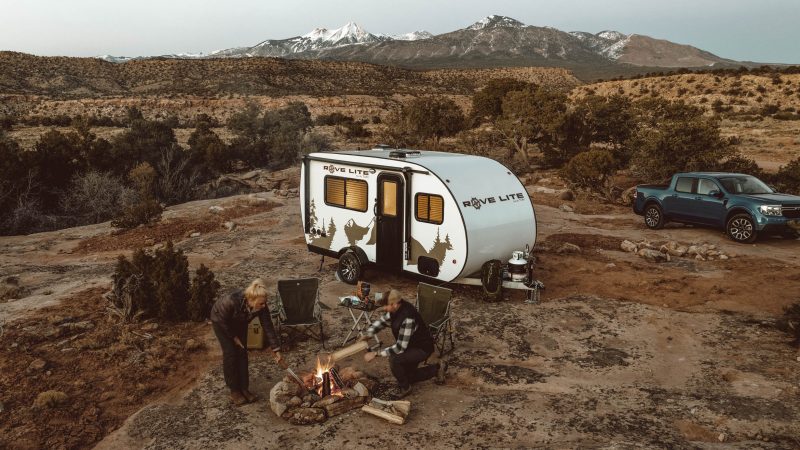
Unlike motorized RVs that have an engine and can be driven on their own, travel trailers are pulled behind another vehicle. Travel trailers come in all sizes, including everything from tiny jelly bean-shaped models with a small kitchen in the rear to a full blown house-on-wheels, with multiple slide-outs and residential-sized appliances. Their length can vary, starting at 12 feet long and going up to 35 feet long or more. Weight also varies with the size, from as low as 1,200 pounds up to nearly 10,000 pounds.
Sometimes called a bumper-pull (when they first became popular in the early 1950s, they were attached to the bumper of the tow car), the modern travel trailer employs a hitch secured to the frame of your tow vehicle. This truck or SUV will include specialized hardware to make towing safe and easy. Travel trailers are relatively easy to set up once you arrive at your destination. You can unhitch it, leave it and still have a vehicle to explore.
While travel trailers, fifth wheels and toy haulers are all towable RVs, this is where their similarities end. There are some pretty significant differences between the three. Below are brief descriptions of fifth wheels and toy haulers and what makes them different from travel trailers.
Fifth Wheels
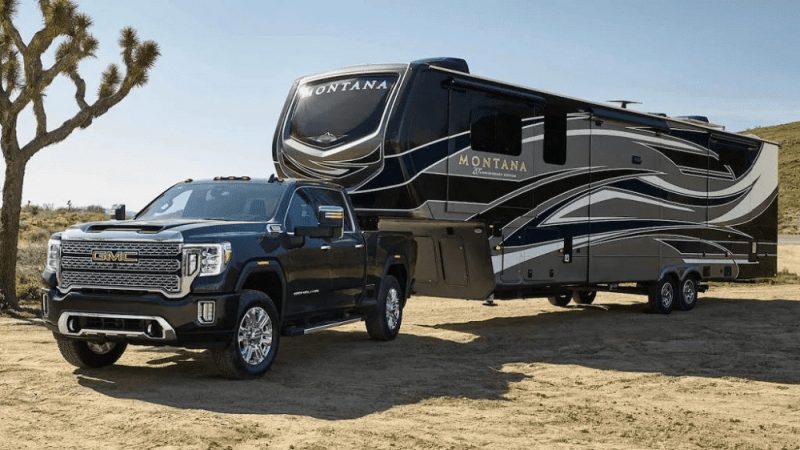
Fifth wheels are the largest towable trailers available and some rival motorhomes for the amount of space and the amenities they offer. In fact, they’re popular for full-time living as well as for traveling. They can have multiple slide-outs, outdoor kitchens, kitchens, bathrooms and an entertainment area. They often include an upstairs area, above the truck bed, for sleeping. Fifth wheels can sleep up to eight people.
Fifth wheels connect with a U-shaped coupling mounted in a truck bed, which, generally, make them easier to tow. This can be attributed to the design of the fifth wheel and the kingpin hitch, which moves the load forward into the bed of the truck. However, because fifth wheels are so large, you’ll need a large pickup truck to tow it. For many fifth wheels, a half-ton truck like a Ford F-150 or Toyota Tundra with maximum towing capacities from 9,740 to 13,200 pounds GVWR will do the job. But many fifth wheel owners prefer a heavy duty truck like a Ram 2500 or a Ford Super Duty F-250, which tow a maximum of 12,760 to 18,500 pounds GVWR.
Due to their higher roofline, fifth wheels generally have higher interior ceiling height than travel trailers. In fact, fifth wheels typically have the highest ceilings of all types of RVs. Fifth wheels are often equipped with high-end features making them more expensive than travel trailers on the whole. When it comes to living full-time in an RV, fifth wheels are the preferred choice. They tend to have a more residential feeling providing a true sense of being home-away-from-home. However, due to the towing requirements that comes with fifth wheels, many consumers in the towable RV market will steer toward travel trailers because most everyday trucks and SUVs are equipped to handle towing them.
Toy Haulers
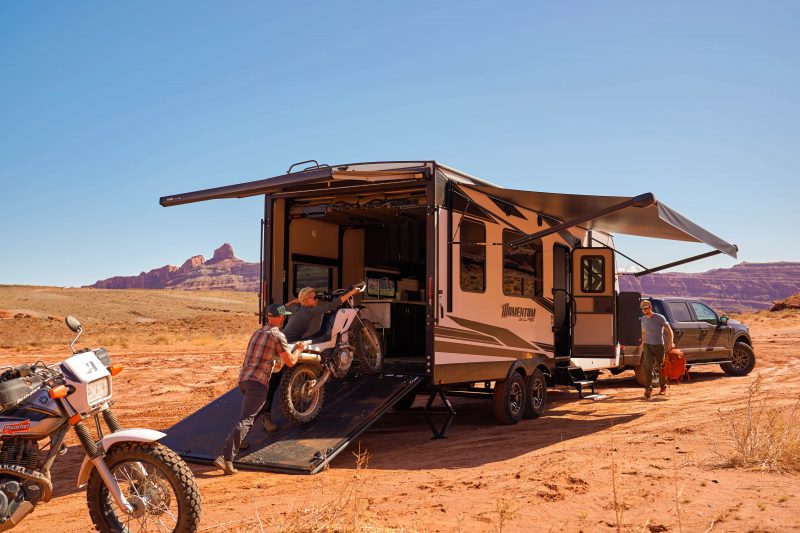
The sizes, prices and maneuverability are about the same for both toy haulers and travel trailers. Toy haulers are built on a sturdier frame and, therefore, can be much heavier than travel trailers. The dry weight for the average toy hauler is around 10,000 pounds, but models can range from 4,000 pounds up to 15,000 pounds. They also have a garage area which can take away from the interior space of the trailer. The most common type of toy hauler is the fifth wheel, partly because it has a more secure connection to the towing vehicle. Certainly, if you have motorcycles, quads, sand toys or lots of recreational toys – like cross-country bikes, kayaks, inflatable boats, wind surfing equipment or other toys – then a toy hauler will meet your needs better than a travel trailer. However, toy haulers come in travel trailer floorplans with standard towing hitches, as well.
If you’re a traveling family, the extra space in the garage will provide extra sleeping spaces for the kids, as well as an indoor play area. The garage can also be converted to a space for homeschooling a young family. Pets are another reason you might choose a toy hauler. The garage area is also a great place to bring your wet, sandy or muddy pets inside, but still keep the dirt under control.
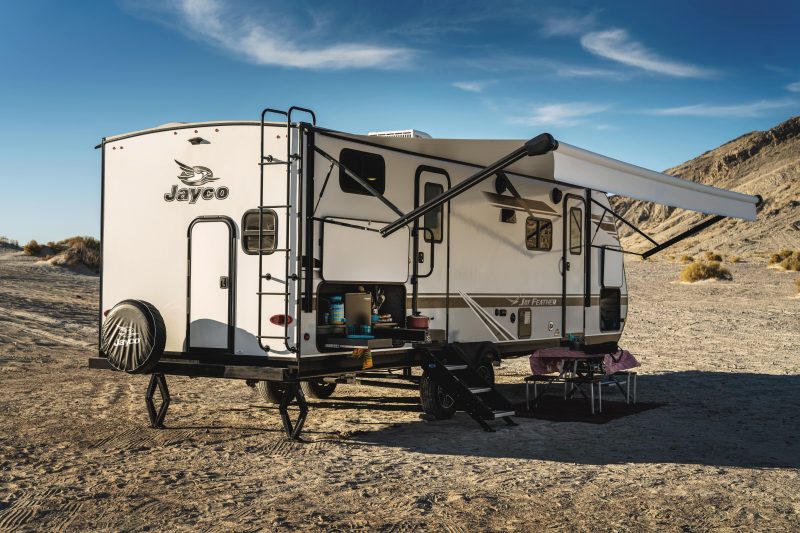
Travel trailers come in a wide range of sizes and styles. That said, most travel trailers typically range anywhere from 12 feet to 35 feet long. A simple, 12-foot travel trailer allows enough comfortable space for one or two people (most likely a couple). Meanwhile, a 35-foot trailer can allow enough space for up to 10 people to sleep comfortably. Every state has laws regarding the length, height and width restrictions of travel trailers. These all vary somewhat, but, generally, the consensus is that trailers must have widths no greater than between 8 feet and 8.5 feet.
Most states generally restrict RV travel trailer length to 40 feet, although some states allow for additional length, with a maximum of 43-feet-6-inches. This doesn’t include the tow vehicle. In most states, the maximum combined length is usually between 50 feet to 65 feet.
Travel trailers vary in weight from 1,200 to almost 9,000 pounds. They come in various lengths and builds, allowing for a diverse weight range. Smaller travel trailers have an average maximum weight of about 3,500 pounds (GVWR). Some larger travel trailers can reach more than 10,000 pounds when fully loaded.
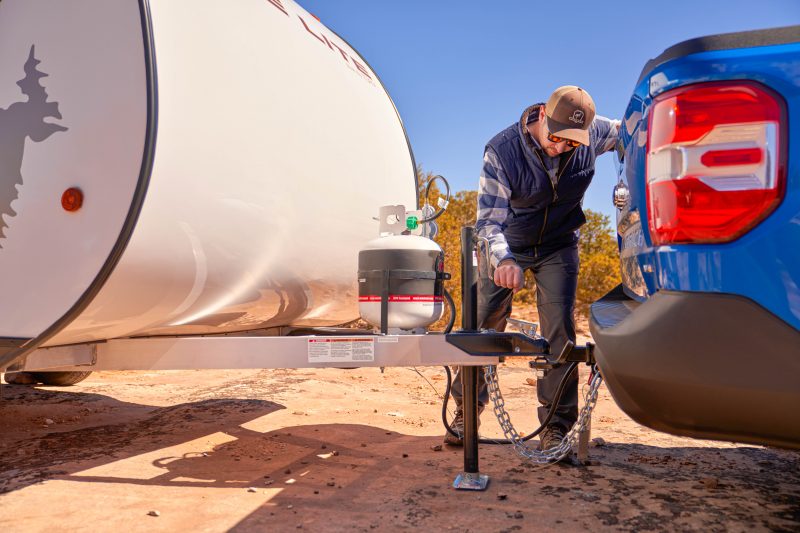
From Gen Zs to Boomers, RVing in a travel trailer, of any type, offers freedom and a sense of self-sufficiency. However, towing a travel trailer can bring some unexpected stress and safety concerns for first-time RVers. Trailers add weight and that added weight changes the handling dynamics and braking of the tow vehicle. That’s why you need to make sure your trailer and tow vehicle are properly matched.
The towing capacity of a vehicle is how much weight it can tow. The towing capacity is determined mainly by the type of axles the truck has and their ratings. Usually, towing capacity applies to SUVs and trucks, since most sedans or smaller cars don’t have large towing capabilities. Keeping your trailer’s weight in mind is integral as well. If your trailer weighs too much for your tow vehicle, it increases the stopping distance and likelihood of damage to your tow vehicle or RV.
There are two important weight-related factors when it comes to RV trailers: GVWR (Gross Vehicle Weight Rating) and tongue weight (TW). GVWR is the safe maximum weight of the trailer when it’s loaded for camping with water, fuel, supplies, and cargo. The TW is how much downforce the loaded trailer places on the hitch. Both numbers are displayed on the metal Federal Certification/VIN ID tag located on the front left side of a travel trailer. You can also find the specifications listed on the trailer manufacturer’s website.
Those two numbers set the basis for choosing the vehicle best suited for towing a travel trailer. Tongue weight of RV trailers, sometimes referred to as “hitch weight,” will be typically between 10 and 15-percent of the trailer’s GVWR. RV trailer weights can vary widely by brand, type, and size. That’s why it’s important to narrow down these numbers to the specific trailer you plan to tow and then make sure those weights match your vehicle’s towing limitations. You can also find your vehicle’s towing capacity on General RV’s towing guide.
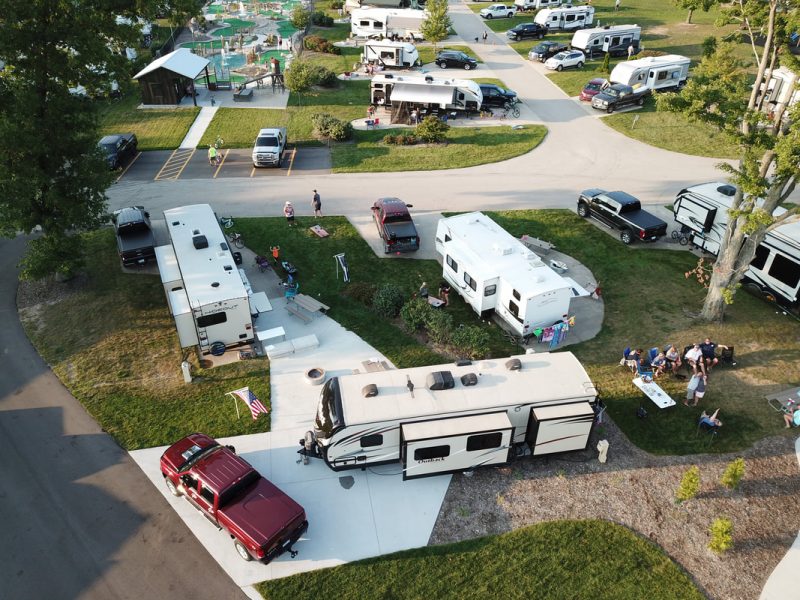
The options for where a travel trailer can go generally depend on the vehicle towing it. There are roughly 4,510 RV parks and campgrounds in the United States, including 113,000 federally-managed campsites at national parks, 166,000 campsites dispersed across state parks and untold numbers in private facilities.
The Bureau of Land Management, or BLM, is a federal agency under the U.S. Department of the Interior that oversees more than 247.3 million acres of land. Much of it is available free to the public for dry camping or boondocking, without hookups to electricity, water or sewage. In fact, there are many lightweight travel trailers specifically designed for off-grid RV excursions.
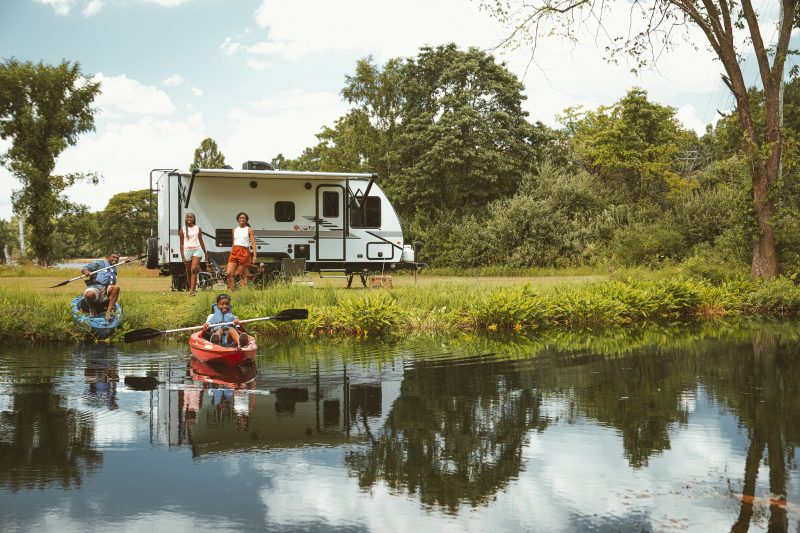
Recent surveys show more than 11.2 million households in the U.S. own an RV. 38 percent of those RVs are travel trailers. Most commonly used during the summer and fall months, travel trailers are especially popular among young families and first-time RV owners. The vast majority of owners hit the road with their spouse and more than a quarter travel with children under 18 or a pet.
Studies also show very few travel trailer owners prefer to travel alone. Meanwhile, more than half of owners are female. State parks are the most popular option for travel trailer owners, followed by private campgrounds and national park campgrounds.
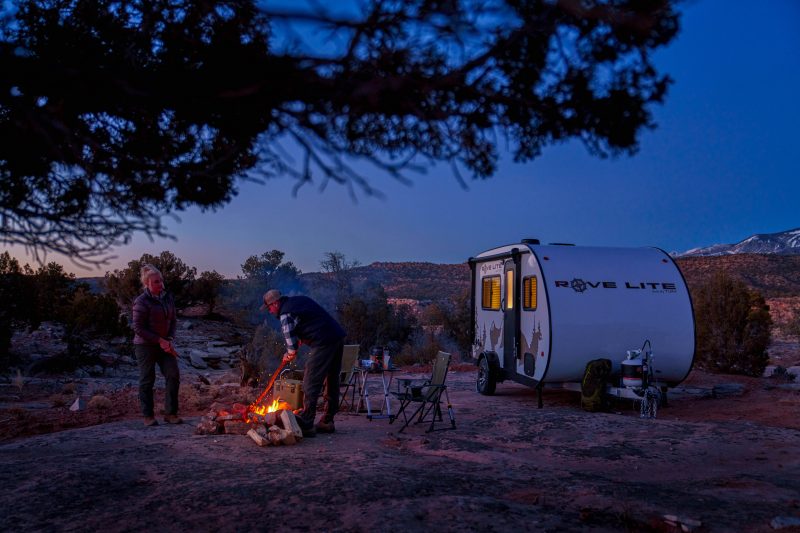
Advantages of a travel trailer
Travel trailers have a lot of advantages that make them a popular RV choice. First, even newer travel trailers come with a much lower price tag than other types of RVs, making them a more affordable option. They also come in a wide range of lengths and sizes. If you already have a truck or an SUV, you can likely find a travel trailer you’ll be able to tow. Additionally, travel trailers also allow you to utilize the full space of the truck or SUV for passengers, storage or even additional toys – like ATVs or motorcycles.
Travel trailers are all about variety and the floor plan variety is no different. There are lots of options to choose from. For example, a floor plan with a bunkhouse is excellent for families with kids. Finally, with any trailer, being able to unhitch the RV and take the tow vehicle elsewhere is always the biggest advantage to travel trailers.
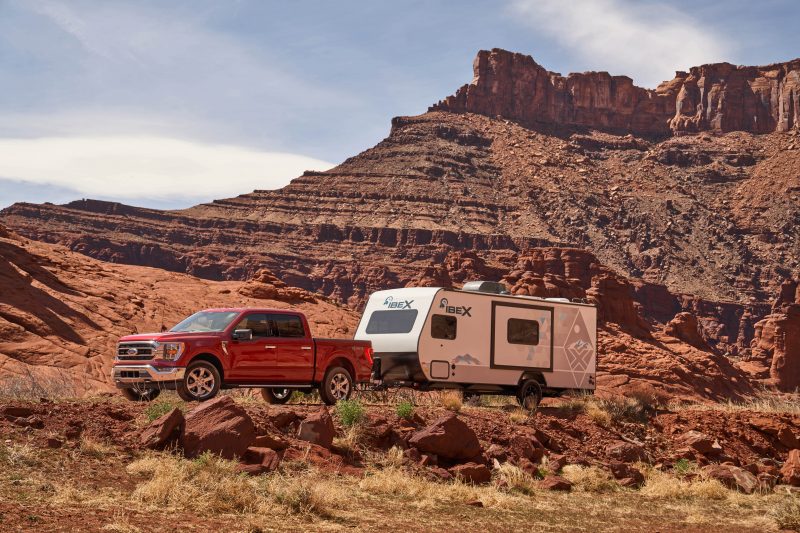
Disadvantages of a travel trailer
One major downfall of the travel trailer is towing experience. An uncontrollable sway is possible if proper sway control and weight distribution hitches are not used or if they are hooked up incorrectly. Since many require a weight-distribution hitch, bumps in the road can be much more noticeable with a travel trailer.
Another disadvantage is that travel trailers have less storage space than most other RVs. While many RVs have an abundance of outdoor storage space underneath, a travel trailer typically does not. That means if you want to bring something on your trip, it needs to fit inside your RV or in your tow vehicle. Along with storage, most travel trailers have lower weight carrying capacities, meaning you cannot bring along as much stuff.
Travel trailers also have fewer amenities than larger RVs, mainly due to their lower cost and weight restrictions. Even though they have high sleeping capacities, you cannot legally have passengers riding in a travel trailer. This limits, and may complicate, the logistics of large family camping trips.
A travel trailer is the least expensive way to enjoy a recreational vehicle or RV lifestyle. Travel trailers are significantly cheaper than motorhomes for the fact they have no engine and must be towed. Travel trailer prices can range from $10,000 to $200,000 for a travel trailer. On average, most new travel trailers cost between $20,000 and $50,000. The size of the travel trailer is the first factor — the bigger you go, the more you will pay. Brand, quality, features and amenities will also play into the final purchase price. If you’re trying to stick to a strict RV budget, don’t skimp on quality. Instead, choose an RV manufacturer known to make high-quality trailers.
A number of financial options are available when it comes to purchasing your travel trailer. While some may pay in cash, most will finance their purchase over the course of several months. Monthly payments can be reduced by providing a large down payment at purchase. This could also help secure a lower interest rate, leading to even more savings in the long-term. Many RV dealers and banks offer great financing options.
Creating an RV budget will help you stay within your financial boundaries and help narrow your travel trailer RV search. Be sure to also include parts or accessory upgrades, regular preventative maintenance and RV insurance in your budget. You will also need to account for storage costs if you are unable to store your travel trailer on your property when not in use. RVing is growing in popularity at an exponential rate because it can be enjoyed on nearly any budget. Read about some ways to save money while RVing and stretch your dollars, so you can enjoy more adventures.
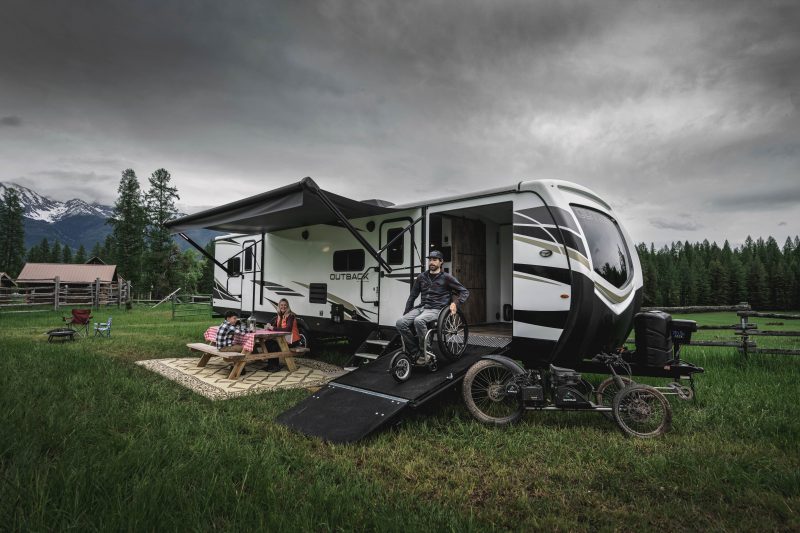
It is essential to determine the best travel trailer to suit your needs, aesthetics and dimensions on the outside and inside. You should select the right travel trailer your vehicle will be able to pull. Make sure the floor plan is suitable for your requirements. There should also be enough room to fit the things you’re looking for. Make a list of those things you’d like to take and make sure you have enough space. Additionally, you’ll want to ensure that the bathroom and shower are spacious.
The best travel trailer brands at General RV
Coachmen rv travel trailers.
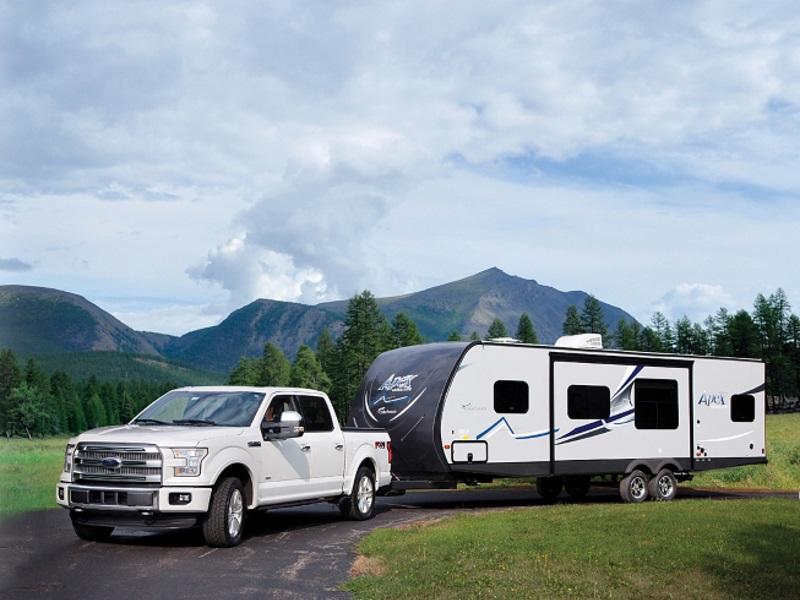
Coachmen RV has been manufacturing RVs since 1964, earning an excellent reputation for reliability. Considered one of the top RV manufacturers on the market, Coachmen has up to 15 travel trailer models available.
Forest River RV Travel Trailers
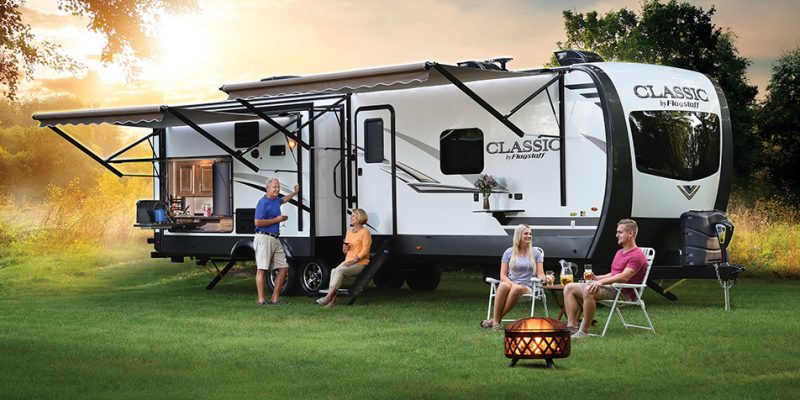
Since opening its doors in 1996, Forest River RV has become one of the most popular names in the RV world. Forest River manufacturers RVs in nearly every category, with almost four dozen models of travel trailers alone.
Grand Design RV Travel Trailers
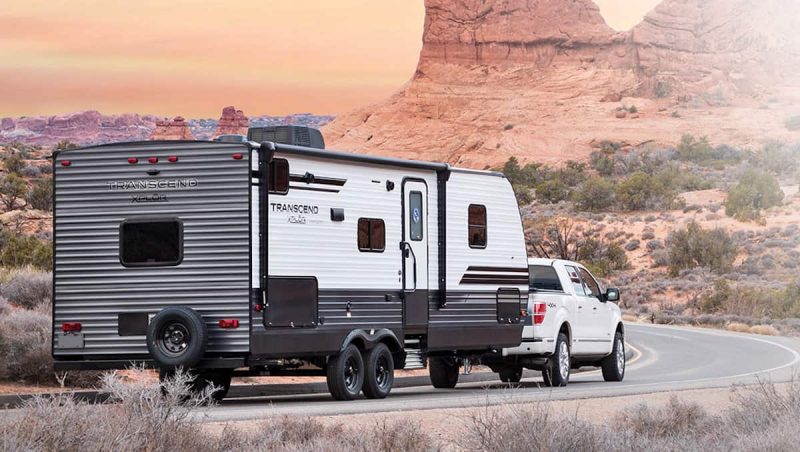
Grand Design RV manufactures high-quality towable fifth wheels and travel trailers. From affordable, luxury extended-stay vehicles to amenity-packed toy haulers, Grand Design delivers variety and reliability.
Jayco Travel Trailers
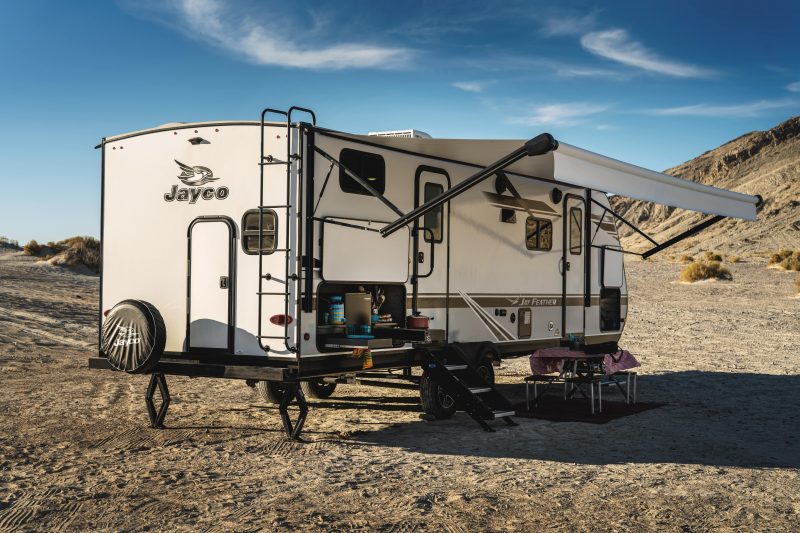
Travel trailers are the most popular kind of RV and Jayco travel trailers are built using several exclusive methods, materials and technologies that make them popular and reliable. With a wide range of sizes and floorplan options to fit many family sizes, you will find a Jayco travel trailer to accommodate all your travel needs.
Keystone RV Travel Trailers
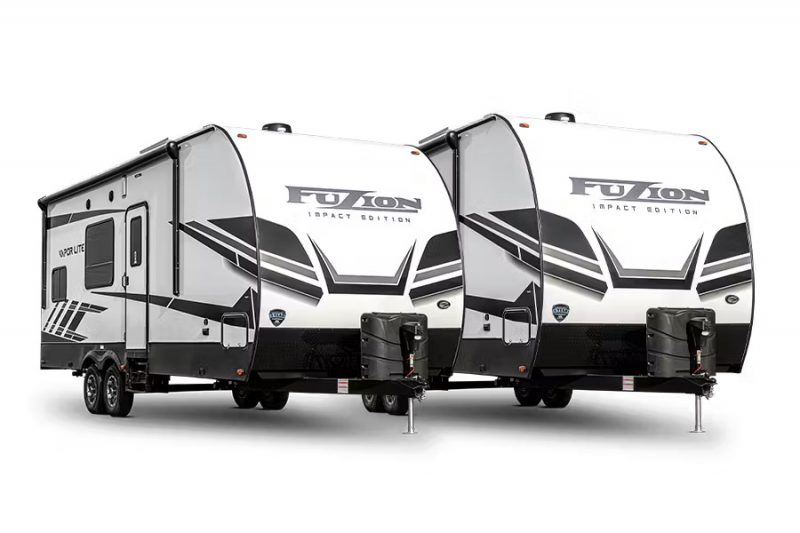
Keystone RV Company is the top manufacturer of towable RVs in North America — with more than one million owners, 5,000 team members and over one million square feet of manufacturing in Goshen, Indiana and Pendleton, Oregon. With more than 200 floorplans available, Keystone RV Company has the perfect travel trailer for every camper.
Prime Time RV Travel Trailers
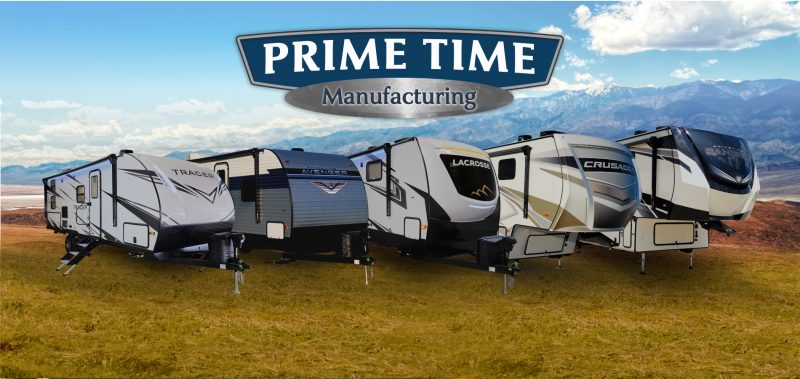
Headquartered in Wakarusa, Indiana, Prime Time Manufacturing proudly builds a full line of towable RV products to meet the needs of experienced, casual and first-time RV customers. A division of Forest River, Inc., their unwavering commitment to quality and a customer-first service philosophy has made Prime Time one of North America’s favorite RV manufacturers.
10 Best Travel Trailers For Sale at General RV
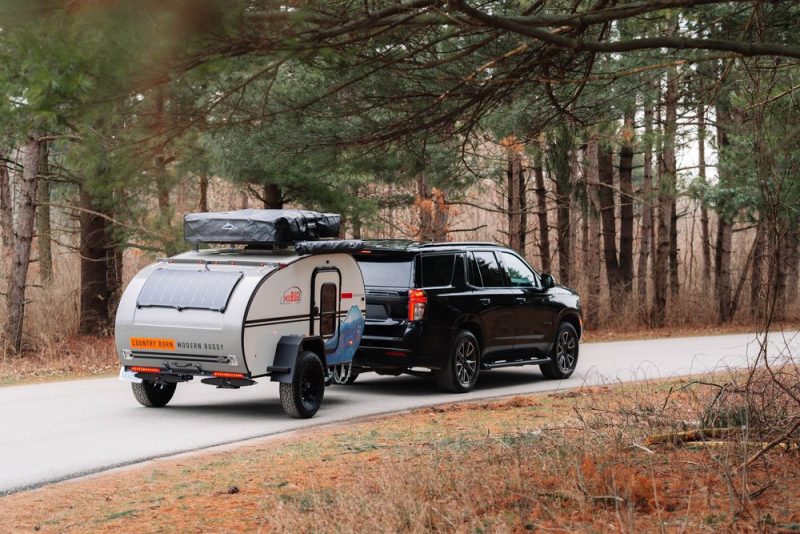
Adventure begins with the Little Buggy from Modern Buggy RV . The Little Buggy RK is the perfect choice for outdoor enthusiasts looking for a light-weight, affordable and easy-to-use option for their overland adventure. With its compact size and low weight, it can be towed by a large number of vehicles, making it a versatile choice for any road trip. The RK features a fully-functional kitchen, solar power, a queen-size mattress and real birch wood cabinetry. It can comfortably accommodate up to four people with the addition of the rooftop tent option, making it an ideal choice for a small family or group of friends. The best part about this RV is its simplicity, which makes it easy to set up camp and maintain, allowing you to focus on enjoying your outdoor adventure.
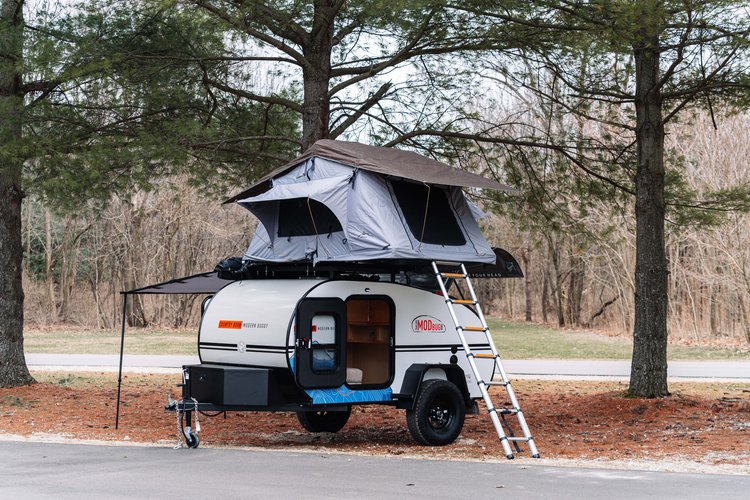
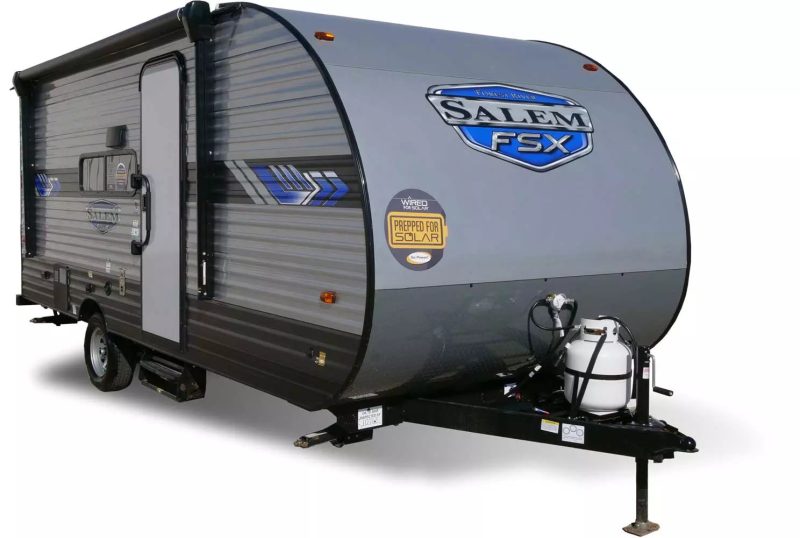
The Forest River Salem 169RSK travel trailer is perfect for couples who want to explore the great outdoors together! A rear private bedroom with a queen bed slide allows for more interior space, and includes a dresser with wardrobes on either side. Plus, the split-style bathroom will come in handy when one person wants to freshen up in the shower while another uses the private toilet and sink. You can prepare your best home cooked meals with the two-burner cooktop, then enjoy it at the front U-shaped dinette which can also transform into a queen bed for extra sleeping space. Enjoy making breakfast each morning at the outdoor kitchen under a 15′ power awning which creates a little more outdoor living space.
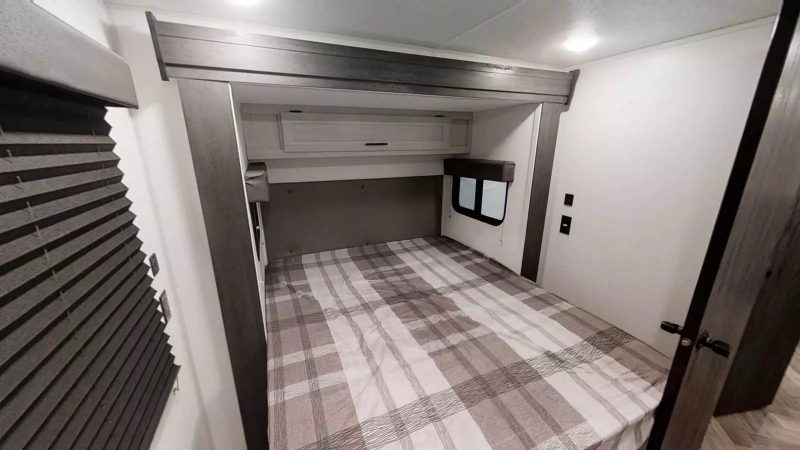
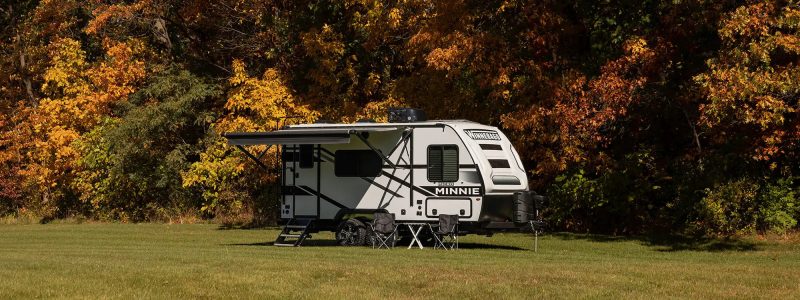
Start out on your boundless journey in one a Winnebago Micro Minnie travel trailer! Towing is made simple with the 7′ width to keep your Micro Minnie in your rear-view mirror. Despite their compact sizes, the Mirco Minnie does not lack in features. Two twin beds up front convert into a king-size bed. The booth dinette slide also converts into extra sleeping space. The spacious galley includes a sink, refrigerator, two-burner cooktop and even a convection microwave oven. Each Micro Minnie also comes with flexible exterior storage to make packing quick and easy, a 200-watt solar panel for off-grid camping, and Dexter TORFLEX torsion stub axles for smooth towing!
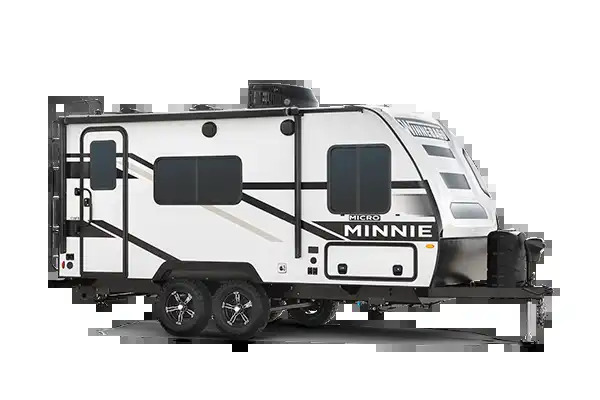
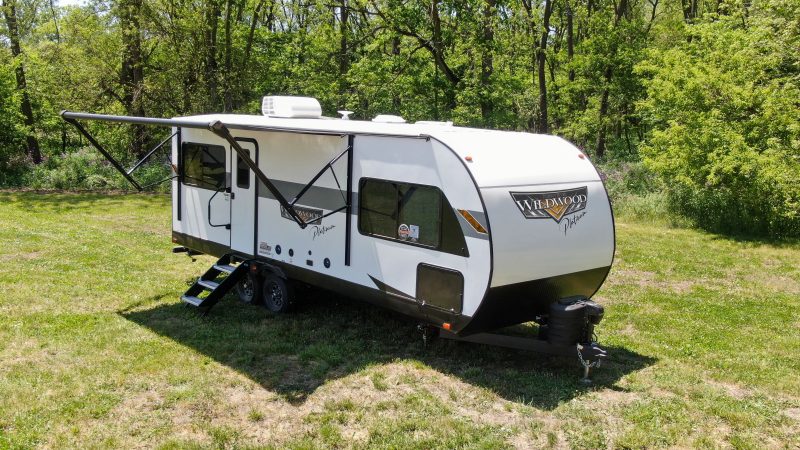
Enjoy years and years of memories with any Forest River Wildwood travel trailers! Two slide outs provide you with more space to relax, as well as a front kitchen with ample counter space. The middle bedroom includes a king bed, a desk with TV prep above where you can work away from home if needed, and even a closet with washer and dryer prep. This RV also includes a spacious full rear bath with its own exterior entry door, a walk-in shower, a linen closet for clean towels and recessed storage for necessities. You will find a plethora of amenities and features throughout the 2024 Forest River Wildwood.
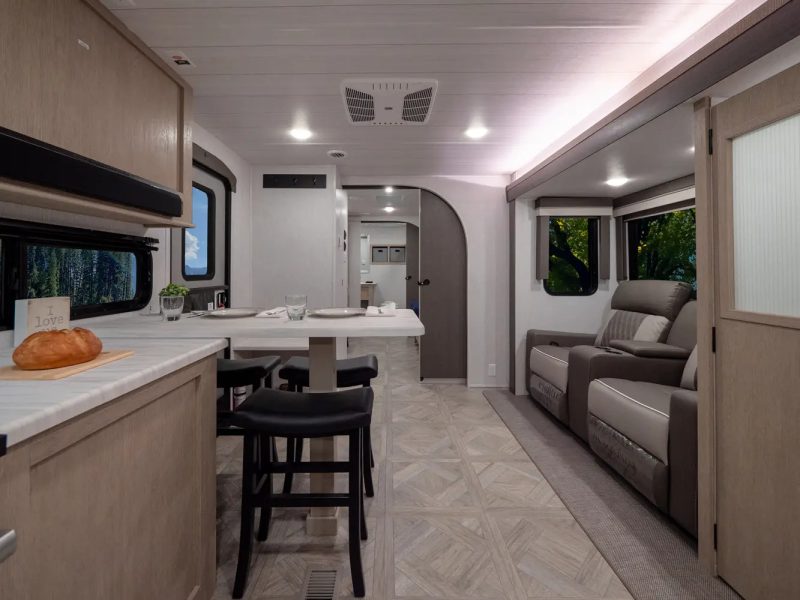
Choose luxury, value and towability over all others when you take home a Grand Design Reflection travel trailer! The chef of the group will love the gourmet kitchen including the 16 cu. ft. refrigerator, the center island when preparing and serving meals and the hutch with overhead cabinets to display and store dishes and such. This area also includes two slide outs for more floor space and furniture to relax including theatre seating with cupholders, a booth dinette and a rear tri-fold sofa that offers sleeping space for two. Get cleaned up in the full bathroom, and retire to your front bedroom with a slide out queen bed, a front full-wall wardrobe with washer/dryer prep, a dresser and an additional wardrobe with drawers.
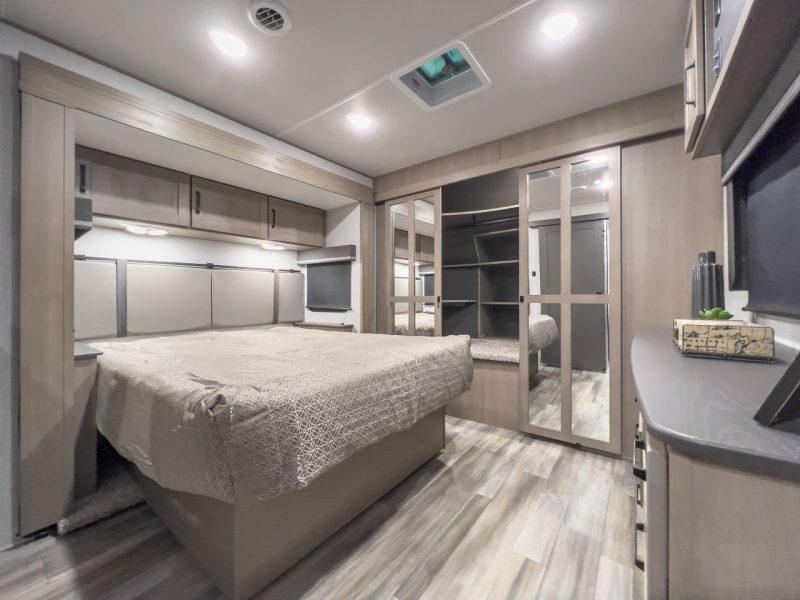
Keystone Residence 40LOF T destination trailer
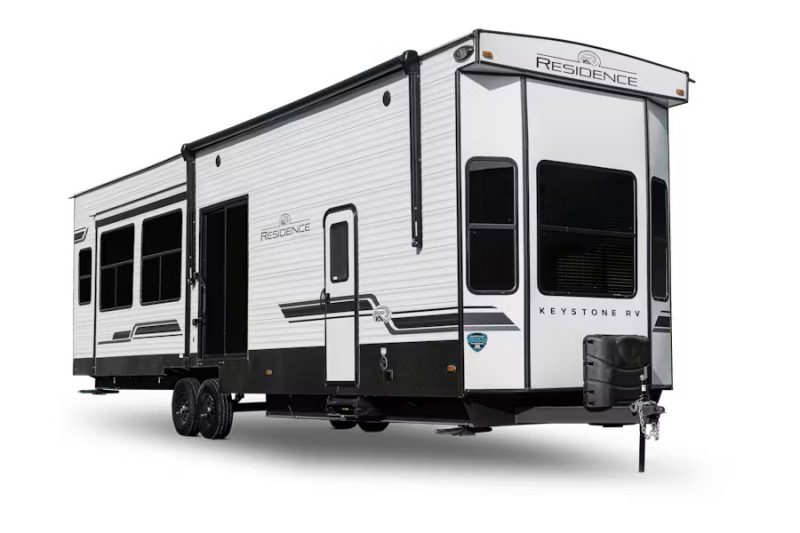
When you choose a Residence destination trailer by Keystone RV , you can live like a local wherever you decide to roam. You will love the ample cabinet space to store your belongings, along with upgraded appliances, spacious baths and higher ceilings! Additional interior comforts include designer upholstered window valances, solid hardwood cabinetry, bedside reading lights, and a shower with surround and a glass door. Since there is a heated and enclosed underbelly, you can plan to camp year around, and the Dexter E-Z Lube axles will make towing easier than ever. You will also find a 12″ powder coated I-beam frame and a fully walkable crowned roof for durability, and you can choose between aluminum or laminated sidewalls.
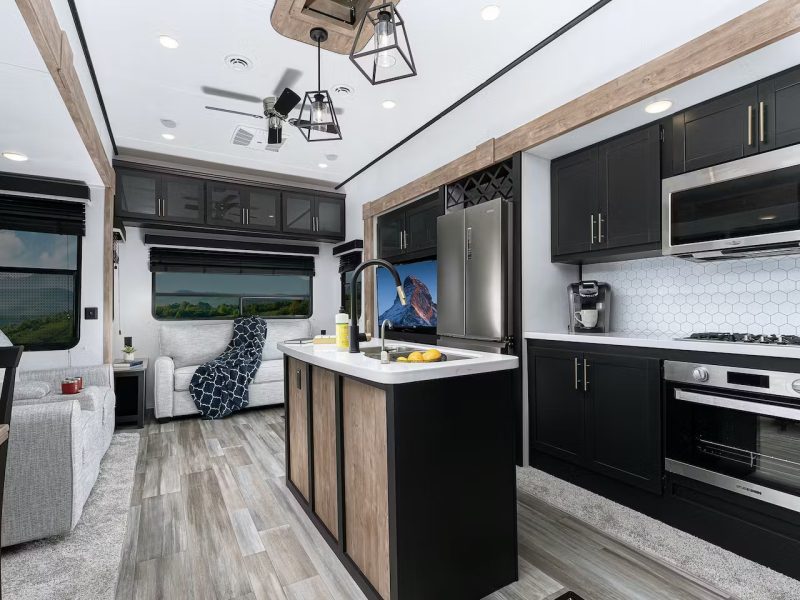
Coachmen RV Apex Nano travel trailer
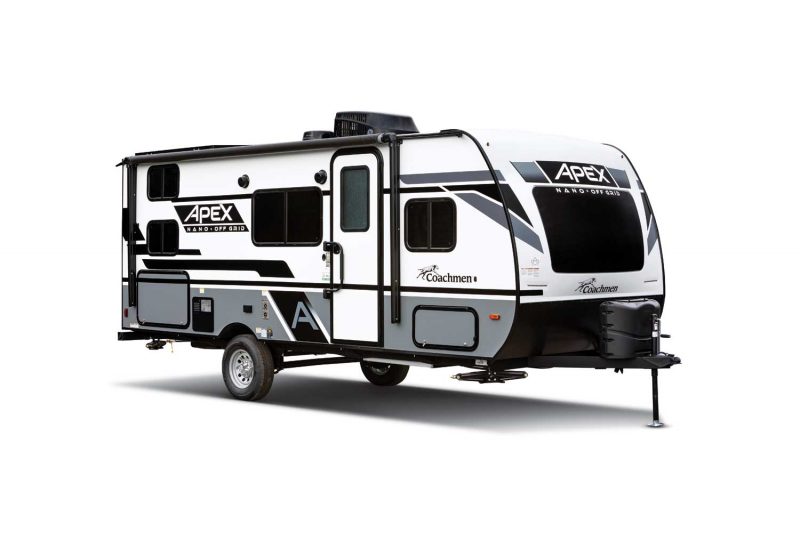
The Coachmen RV Apex Nano travel trailers were designed to be towed by today’s half-ton trucks, minivans and SUVs. These lightweight and durable travel trailers from Coachmen RV are perfect for families new to RVing or seasoned travelers. The mandatory Nano Package comes with a wide range of construction features that are sure to impress, as well as standard kitchen and bathroom amenities that promises a luxury living experience. These 7-foot 6-inch-wide lightweight trailers, consisting of four models in both slide and non-slide versions, weigh as little as 2,604 pounds.
Construction features include welded aluminum framing, vacuum-bond laminated fiberglass side walls and composites designed for less weight. Inside, the trailer has double-bowl sinks and crowned 6-foot 6-inch ceilings. The Nano sleeps four to six people, with generously-sized dinettes that fold down into beds. Three of the models also have queen beds. Spacious interior cabinets and large exterior compartments provide ample storage.
Coachmen claims the Nano has some of the largest payload capacities in the single-axle market, with cargo ratings up to 1,200 pounds in the slide models. All Nano models also have 30-gallon freshwater, gray- and black-water tanks.
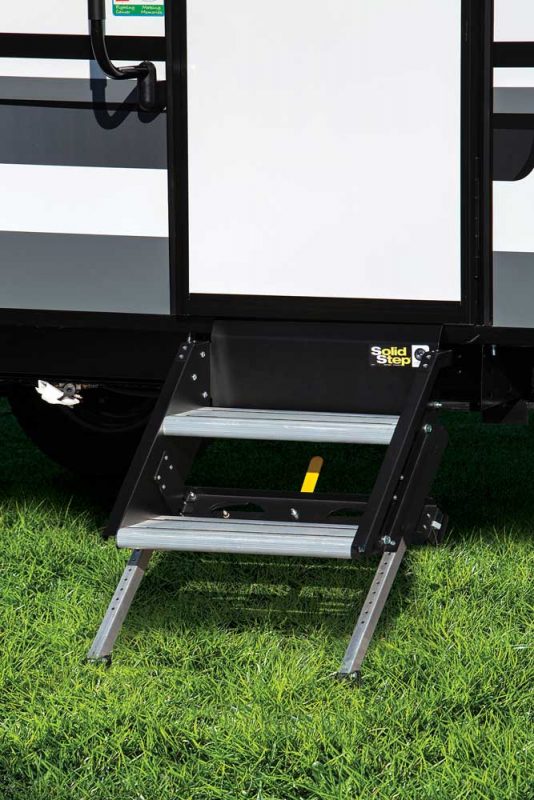
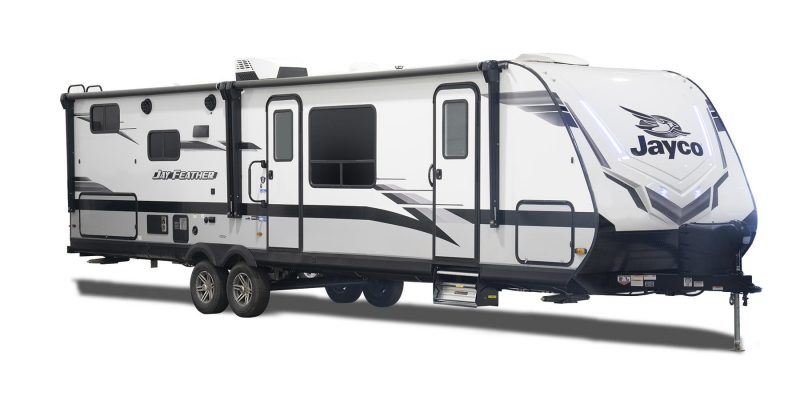
The Jayco RV Jay Feather travel trailer’s lightweight, rock-solid fiberglass construction features two distinct interior design concepts with new fixtures and flooring throughout. Whether you’re looking for a smaller camper with lots of sleeping space or luxurious amenities in an easy-to-tow trailer, there’s a Jay Feather for you.
Each Jay Feather is built on an American-made chassis with an integrated A-frame which runs through the main foundation preventing the hitch from buckling. These travel trailers include Stronghold VBL vacuum-bonded, laminated flooring and walls, plus the Magnum Truss Roof System, which is 50 percent stronger than other roofs in the industry. The interior equipment includes residential-style kitchen countertops, four-inch high-density dinette cushions with vinyl backing and residential vinyl flooring with cold crack resistance, for years of enjoyment.
There are many reasons to choose a Jayco Jay Feather travel trailer. It’s lightweight, easy to tow and includes a sport package with enhanced graphics, a front-molded fiberglass cap and an enclosed underbelly. Plus, may more great features!
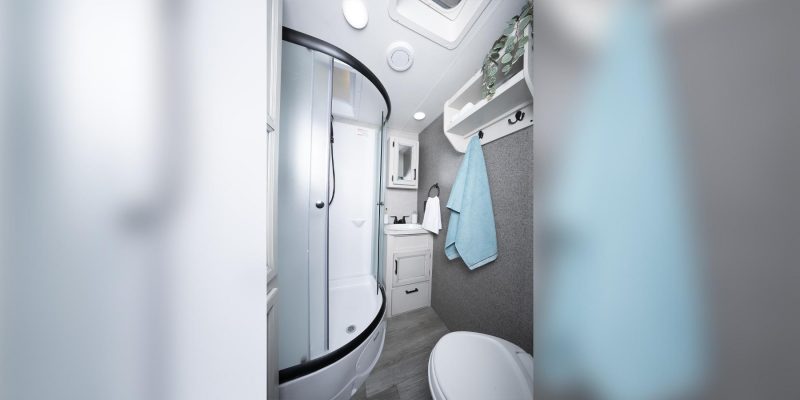
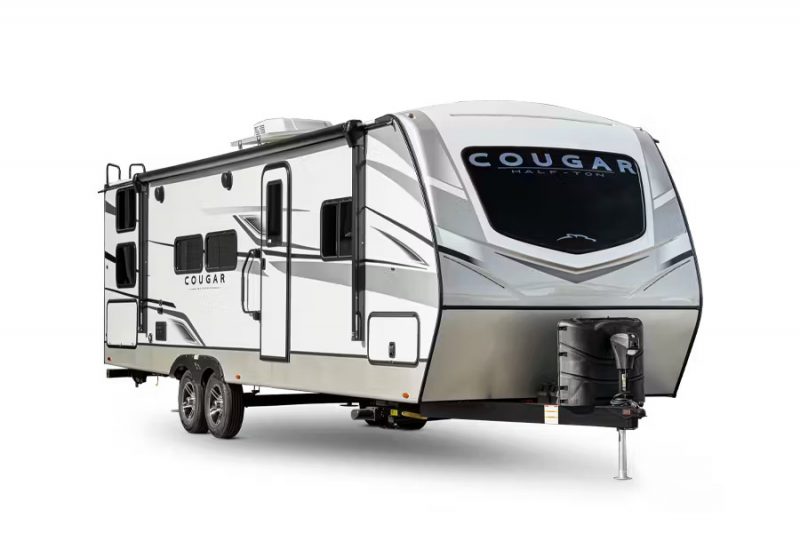
Committed to cutting-edge innovation, quality, style and affordability, the Keystone RV Cougar travel trailer offers a wide selection of floorplans designed to be towed by both half-ton and full-sized trucks. The limited edition Cougar Sport offers two new, even lighter models. The Cougar line-up is designed to grow with your family, from your first RV to your last.
MaxTurn technology with Road Armor shock absorbing hitch pin and Hitch Vision, creates unparalleled towing control. The innovative iN-Command smart RV control system and Climate Guard all-season protection make the Cougar an obvious choice for full-time or extended-stay camping. The SolarFlex solar energy system comes standard as a SolarFlex 200, but you can upgrade this system to a SolarFlex 400i or SolarFlex 600i-L to suit your needs. Some new features of the Cougar include a 16-cubic-foot, 12-volt refrigerator, an on-demand water heater and the new exterior graphics package.
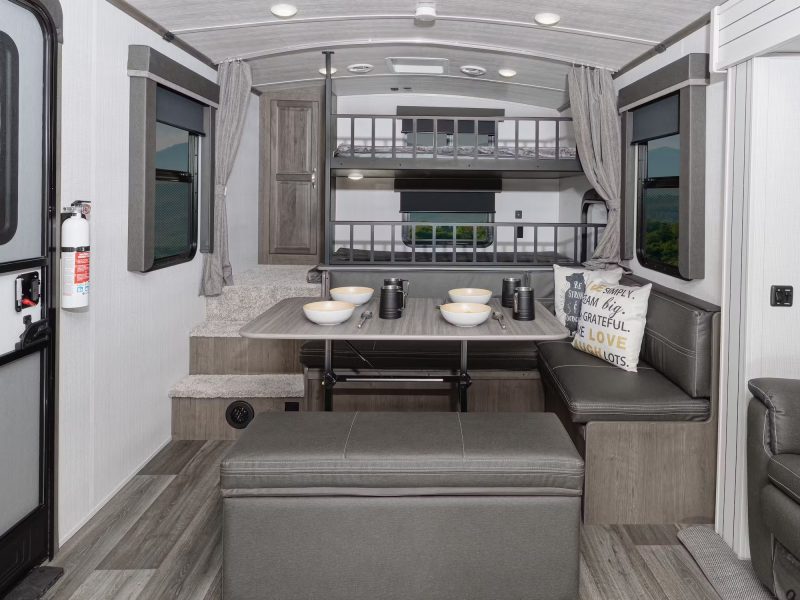
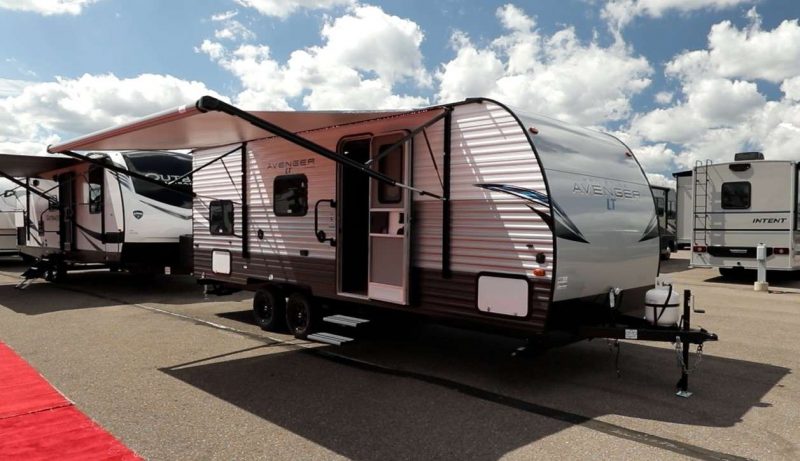
The Avenger travel trailers by Prime Time RV were created to maximum customer satisfaction and enjoyment with innovative construction and best-in-class features and design elements. These double-axle trailers offer couples’ floorplans and family-friendly bunk models.
Each Avenger is built on a powder coated l-beam frame and includes an enclosed underbelly to protect against debris and control the inside climate. The Avenger also features safety chain hooks on the A-frame, a one-piece TPO roof membrane and an aluminum exterior skin making the travel trailer lightweight. The interior offers premium cabinetry, LED interior lighting, seamless Carefree Congoleum flooring for durability and more.
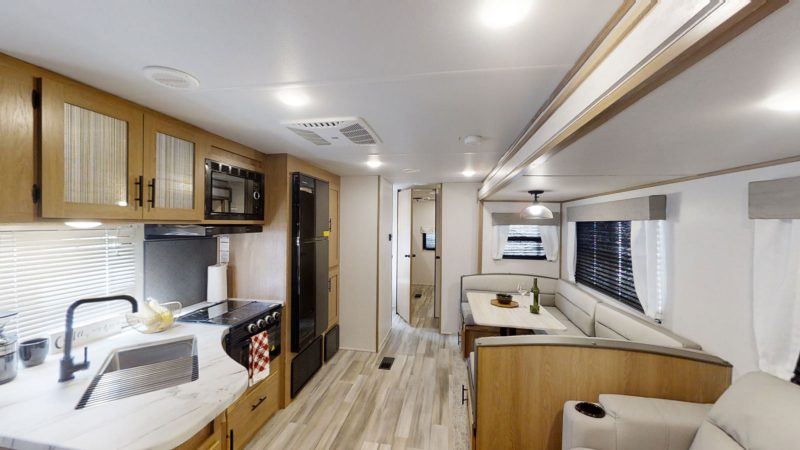
More travel trailers to check out at General RV
Forest river rv salem travel trailer.
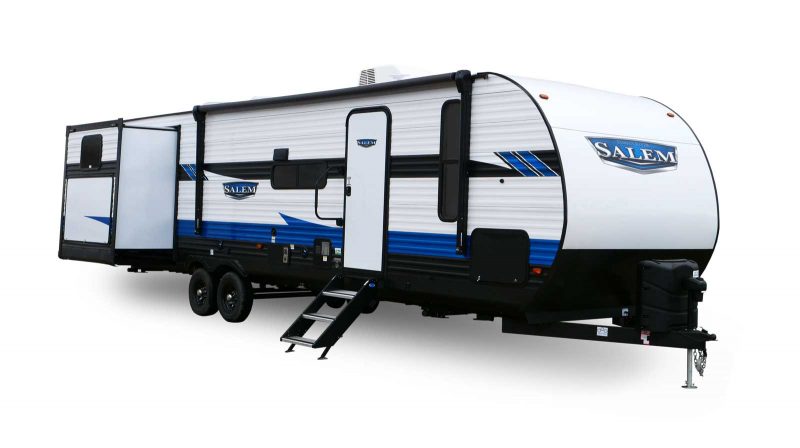
The Forest River Salem travel trailers may come in a tiny package, but they are fully featured, lightweight and easy to tow. They are perfect for either the first-time camper or seasoned travelers and have a modern residential living space to be a comfortable home away from home.
Each model includes residential features to maximize comfort. There are full bath and kitchen amenities, comfortable sleeping spaces and plenty of storage areas for your belongings. The durable construction means you can plan to camp for years to come and you will love how easy it will be to tow these trailers.
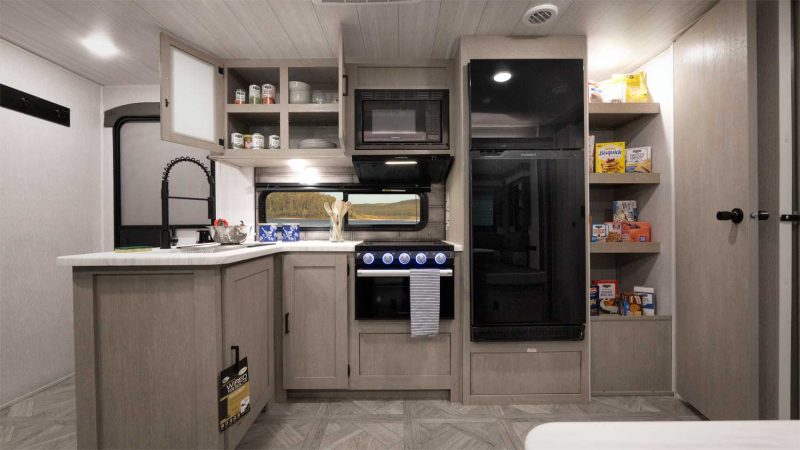
Forest River RV Wildwood travel trailer
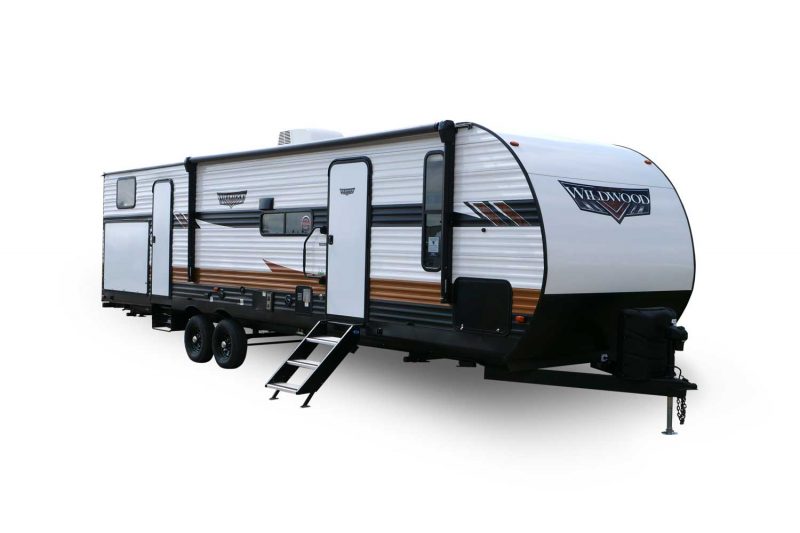
Forest River made convenience and quality a priority in these Wildwood travel trailers . From a spacious kitchen to plush bedroom, everything about this RV was designed to take you on grand adventures in comfort and style.
The Wildwood gives you a spacious living room area thanks to two slide-outs. The Versa-Lounge seating system allows you to configure your space for maximum comfort, while theater seating gives you a great spot to watch the game. The island kitchen is well equipped with a stove top, oven, residential refrigerator and pantry. The bathroom features a walk-in shower, plus a skylight and linen cabinet, while the front bedroom includes a walk-in closet.
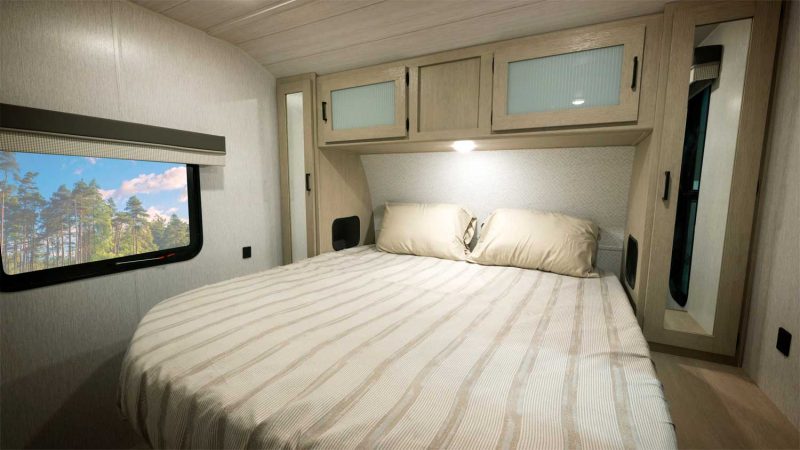
Grand Design RV Imagine travel trailer
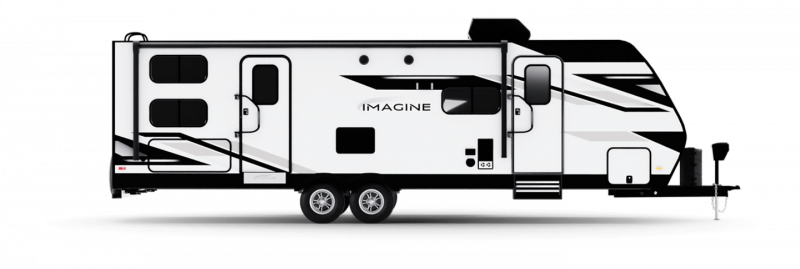
Whether you’re leaving the world behind for the weekend or sticking around for a stay-cation, with the Grand Design RV Imagine travel trailer it’s as easy as tow and go. Down to every detail, the Imagine offers everything your family needs for adventure — and a good night’s sleep.
The Imagine is one of the best mid-profile travel trailers on the market today. It has an aluminum frame and fiberglass sides. The different floor plans are between 29 feet and 37 feet and weigh from 7,850 pounds to 10,200 pounds. Each model includes exceptional features like a 165W roof-mounted solar panel, high-capacity furnace, residential cabinetry, nitrogen-filled radial tires and a universal docking station. Additionally, you’ll enjoy upgraded residential furniture, residential countertops, exterior speakers and large panoramic windows.
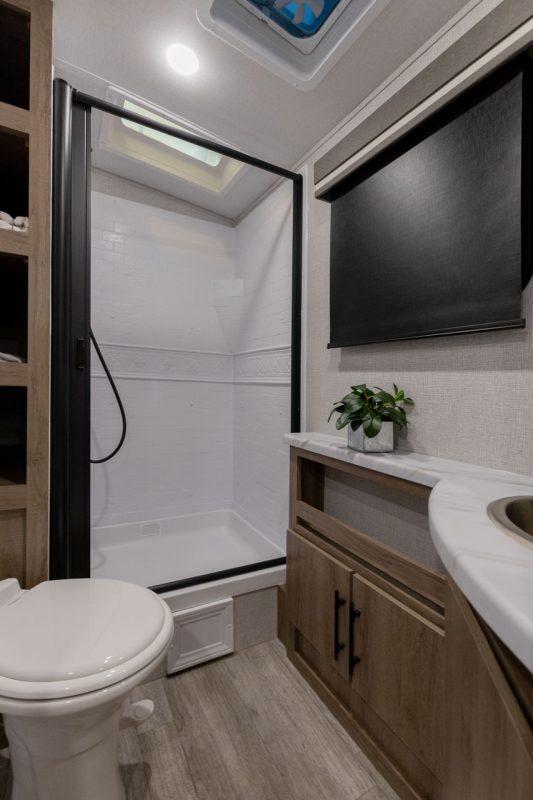
Grand Design RV Transcend Xplor travel trailer
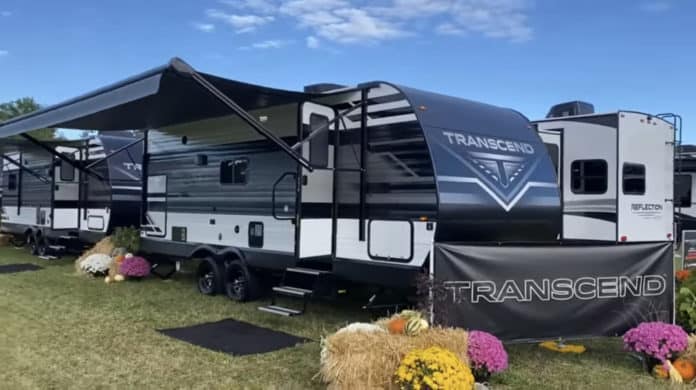
Featuring open floorplans, functional and towability for many of today’s half-ton trucks and SUVs, the Transcend Xplor travel trailer is built for adventure. Throw in unmatched quality, backed by an industry-leading warranty, and there’s no reason not to Xplor. The Transcend Xplor features a unique, industry exclusive StongWall aluminum exterior that is 25 percent thicker than the competition, giving it the strength and durability to hold up to years of use.
You will also appreciate oversized tank capacities, a power tongue jack, an all-in-one utility center, plus many other exterior conveniences. Step inside to find a deep-seated stainless steel sink, residential countertops, solid hardwood drawer fronts and upgraded residential furniture. These travel trailers include multiple packages, like the Power Package, featuring exterior speakers and back-up camera prep, along with the Solar Package featuring a 165-watt roof-mounted solar panel and a solar charge controller.

Keystone RV Passport travel trailer
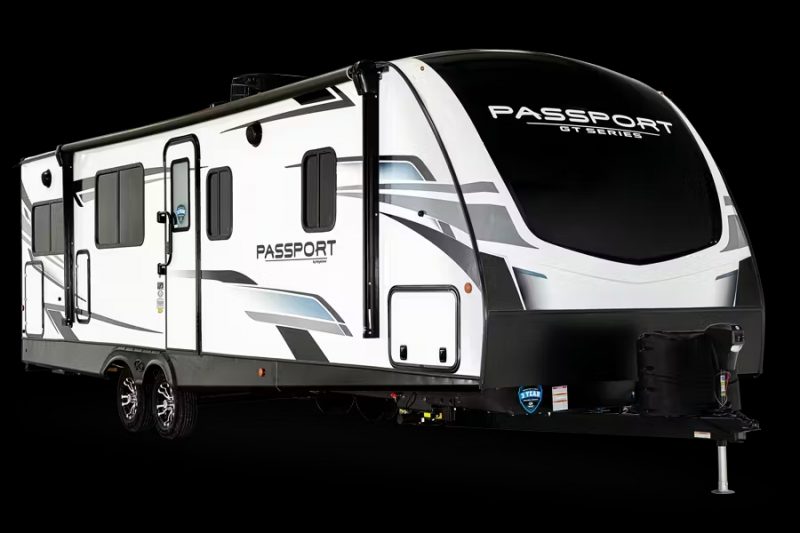
The Keystone RV Passport travel trailer has developed a reputation as a lightweight travel trailer that truly delivers the total package. More functionality, more standard features and seemingly endless interior and exterior storage with every floorplan, keeps the Passport at the front of the pack. Now celebrating it’s 15-year anniversary, the Passport has been campers’ top choice for over a decade.
The Passport is known as the Swiss army knife of RVs for the multi-functional features and best-in-class storage, to help make your camping trip memorable. Even though they are smaller in size, they still offer all of the features campers love, like rear cargo doors and flip-up bunks. Another multi-functional feature is the Murphy bed on some models, which reveals a sofa when not in use. The Pivot furniture, exclusively from Keystone, features a levered dinette seat back that shifts to create an expansive L-shaped sofa to seat the whole family.
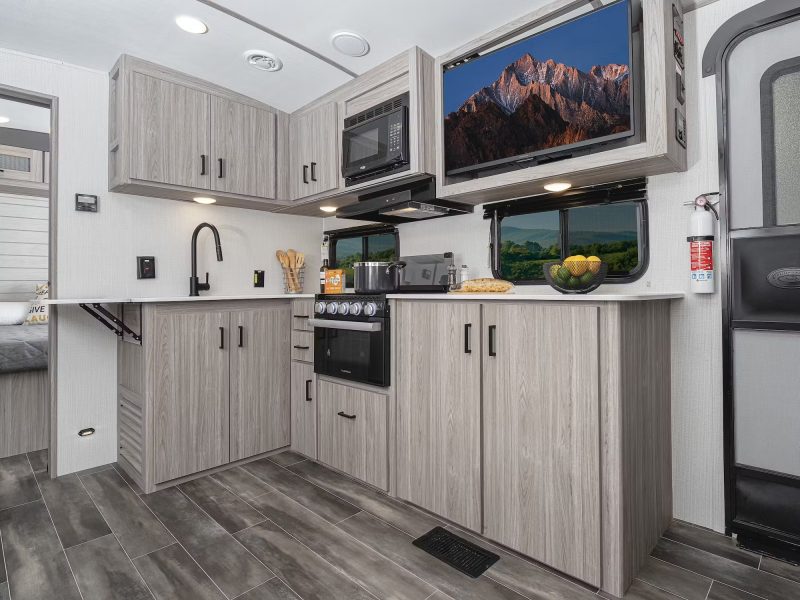
Keystone RV Springdale travel trailer
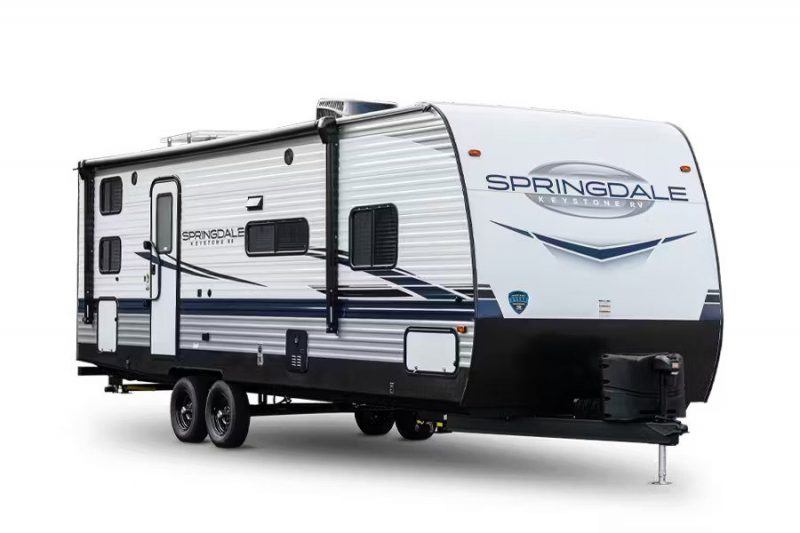
No matter how you define family, Keystone RV Springdale travel trailer’s affordable travel trailers have a model for you. Springdale travel trailer bunkhouses are available in every configuration imaginable. Owners will find extra storage in unexpected places and effortless camping, thanks to power stabilizers, tongue jacks and awnings, as well as unique features like a full solar power package and larger campsite windows.
Each Springdale is built using a floorplan-specific I-beam frame with full width outriggers, maximum 16-inch O.C. wood sidewall construction and Dexter E-Z Lube axles. The Keystone Exclusives provide color-coded unified wiring, Tuf-Lok thermoplastic duct joiners, in-floor heating ducts and 4G LTE and Wi-Fi prep. Models range from tiny to large for weekend warriors, bunkhouse models for families and friends, non-slide and slide floorplans, plus destination trailers giving you a glass patio door and a place to return to time and time again.
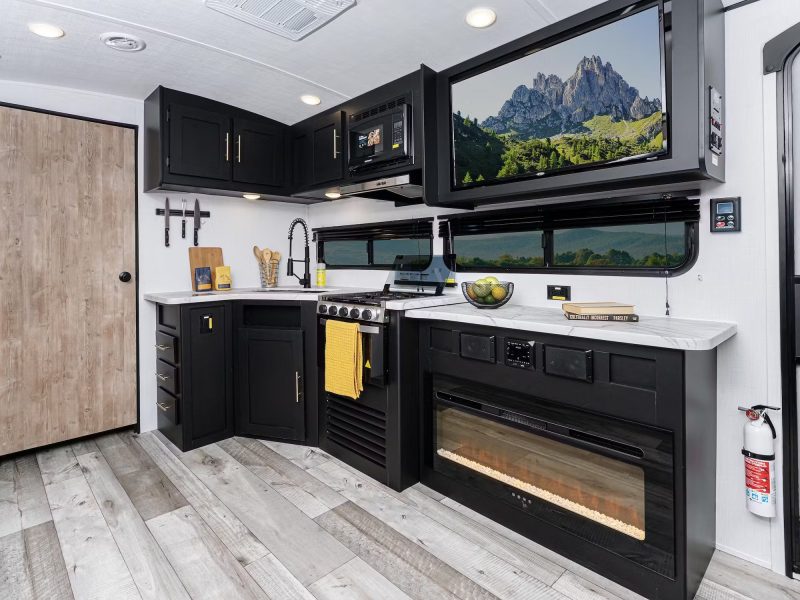
There are many different types of trailers to suit a variety of needs — from tiny teardrops with galley kitchens in the rear to massive 39-foot trailers that can sleep up to 10 people. With a huge selection of floorplans and models, the travel trailer is a great option for your first RV; whether you’re a family of six or a solo traveler.
Owning an RV can lead to significant savings compared to the costs of a typical vacation with flights, rental cars, accommodations and meals. However, travel trailers, like any RV, also come with long-term maintenance costs, storage fees and other expenses to consider.
Finally, choosing the right RV comes down to meeting all of your needs, including price points. General RV’s towable experts can answer all your questions and provide recommendations based on your unique needs. Visit your local General RV dealer to explore our huge selection of travel trailers for yourself. We have thousands of travel trailers in stock, including all the best brands from top manufacturers. After you’ve found the perfect RV, we’ll provide a personalized orientation to get you on the road with confidence.
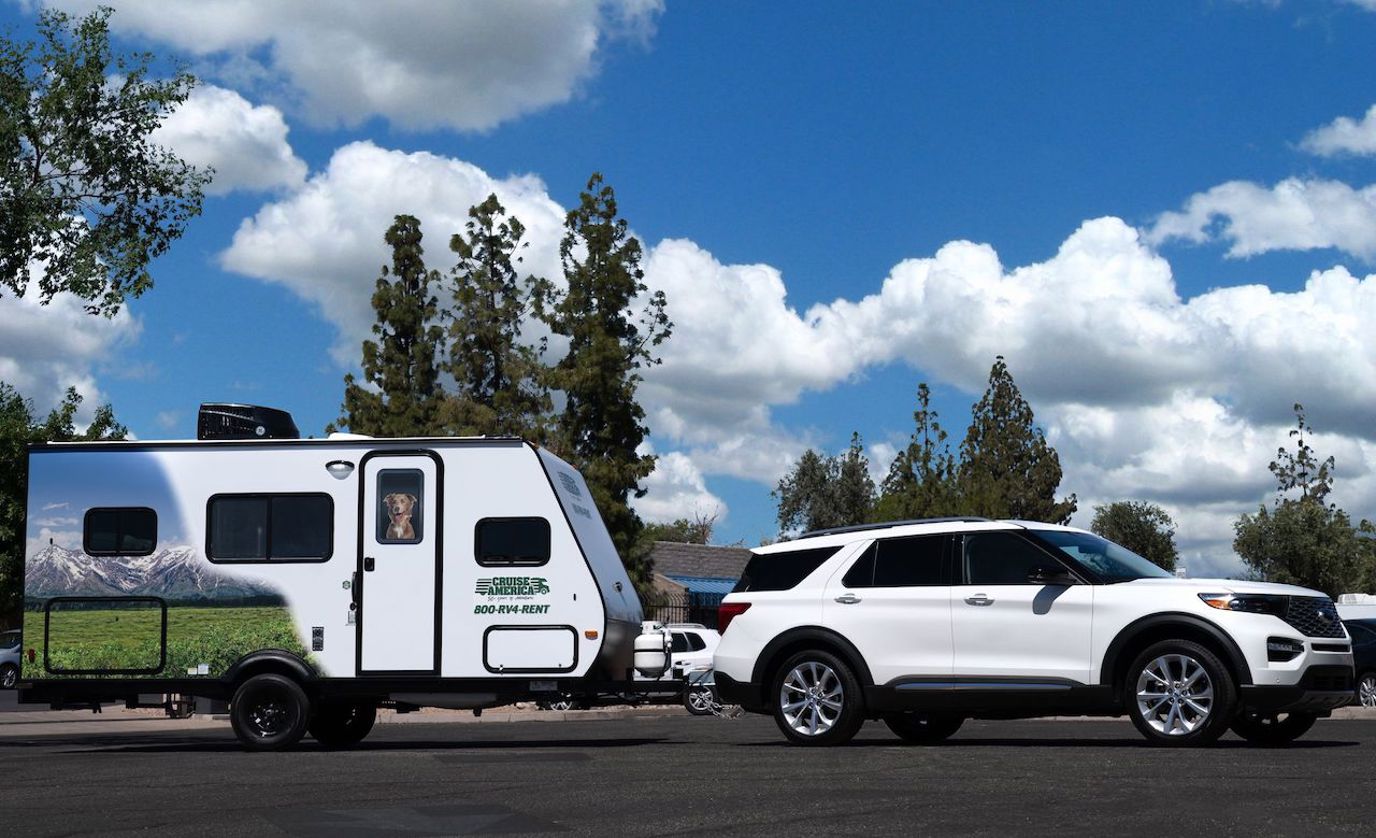
Should I Buy a Travel Trailer?
When it comes to travel trailers, two questions immediately spring to mind: Should I buy a travel trailer? Or should I rent one? You may have trouble coming up with the answers, and it's understandable why. After all, in terms of convenience and cost, both options have their advantages and disadvantages.
You will have to decide which option is the best for you, your budget, and your travel plans—buying or renting, which is more realistic for your needs? Read on to get help sorting it all out!
Buying a Travel Trailer: Is It Right For Me?
Having your own travel trailer presents several advantages for road trips, but you know what? Sometimes renting a travel trailer is the wiser choice. Owning your own travel trailer might make sense for your neighbor who spends half the year someplace else, but are your travel habits the same?
To decide whether buying a travel trailer is right for you, you have to examine what kind of traveler you are. Consider how a travel trailer might fit into your travel plans now and in the future.
What Are Your Travel Plans?
Buying a travel trailer isn’t a small purchase, so before pulling the trigger, there are several things you need to consider. Ask yourself some questions: What kind of traveler are you? What types of trips are you planning to take? Who will you travel with? Your answers to those questions will help you determine if buying is worth it or if renting suits you better.
So, are you a casual vacationer, or are you an aspiring road tripper? Have you grown used to the creature comforts of hotels, or are you charmed by the idea of basically bringing a hotel along with you wherever you go? How many people will be making use of the travel trailer?
Consider, too, how often you go on trips. If you're planning on embracing the traveling lifestyle to the fullest, you'll definitely get your money's worth in the end. Then again, even if you really love to travel, but you and your family only do it once per year, does it make sense to buy a travel trailer? Maybe not; perhaps renting a travel trailer is the better option.
What is the Cost of Renting a Travel Trailer?
Does renting a travel trailer make more economical and convenient sense for you and your traveling needs? Again, if you're the type of road tripper who ventures out once or twice per year, there's probably no need to buy a travel trailer; renting is the smarter choice. But how much will that cost compared to buying one or staying at a hotel?
In real numbers, renting a travel trailer can cost anywhere from $50 to $125 per night, though that doesn't consider other costs (such as overnight fees at whichever campground you're staying at). Still, if you only travel once or twice per year, you'll spend far less than you would have to stay at even a cheaper-end hotel.
Your savings, when it comes to the cost of renting a travel trailer vs buying, are considerable. If you own a trailer, you'll need to insure it; renting saves you that expense. And when you own your travel trailer, you're responsible for its maintenance, but when you rent one, the rental agency is ultimately responsible for keeping it in working order.
What Are The Benefits of Owning Your Own Trailer?
Eventually, you may find that you're traveling in a trailer more often. In that case, "Should I buy a travel trailer?" becomes much easier to answer. And, if you thought renting a trailer makes trip planning easier, wait till you hear about the benefits of owning one!
If you own your travel trailer, you never have to worry about arranging to rent one or your preferred trailer not being available; it's already in your driveway or your garage! If you suddenly have the urge to get on the road, all you have to do is hitch it to your ride and set off!
Another benefit is that you can stock your trailer's kitchen before you leave with items you already have, cutting down on costs such as eating out. You also never have to worry about cleaning the trailer out before returning it to the rental place; when you own your own trailer, it's your home away from home. Keep whatever you want in there!
Buying & Renting a Travel Trailer For Your Next Trip
To buy a travel trailer or rent one? That is the question. Whenever you have the answer, what comes next? Cruise America stands ready to help.
Whether you're in the market to rent or buy a travel trailer or an RV, Cruise America has what you're looking for. Visit Cruise America today to see what buying and rental options are available, and get on the road!
Related Articles

Festival Camping Tips for RVers

RV Trip Planning with Roadtrippers for Summer Adventures

Top Brewery RV Camping Spots with Harvest Hosts
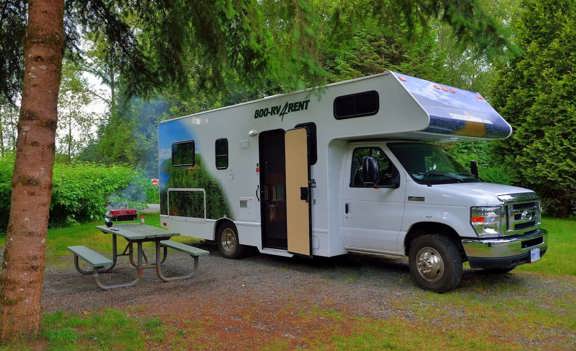
Best Locations in Michigan for Summer RV Camping
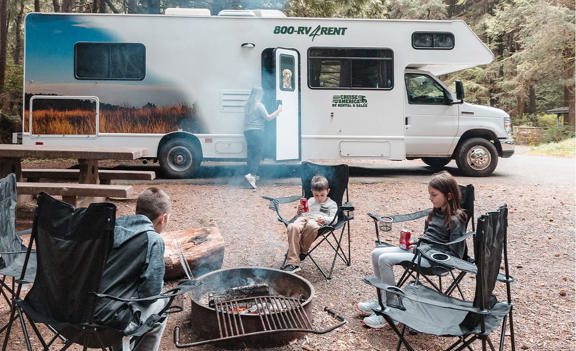
My Favorite Tradition: Mother’s Day Camping

11 Mother’s Day Trip Ideas: Best Places to Go for Mother’s Day
Share this RV trip idea with friends & family
- Skip to primary navigation
- Skip to main content
- Skip to primary sidebar
- Skip to footer
Journey With Confidence
Everything You Need To Know About Towing A Travel Trailer

Photo courtesy Ford
Hitch Up the Easy Way With Our Travel Trailer Towing Guide
Some 56 million Americans are expected to hit the highways, byways, and backroads this summer with a recreational vehicle, according to the latest RV Industry Association (RVIA) surveys. Another 10 million RVers will join them in 2022. About 1-in-5 of those hitting the road will be hitching up and towing a travel trailer—everything from teardrops to tent trailers and travel trailers to toy haulers as individuals, families, and friends head out to enjoy all the freedom and adventure our great country offers.
For more than 110 years, automobile owners have been towing recreational vehicles so they can explore America. Towing a travel trailer is part of adventure-seekers’ DNA, and we’ve been doing it as long as automobiles have been around.
The urge to explore at one’s own pace with a travel trailer in tow was hugely popular in the 1950s and ‘60s . Today, that popularity in RVing is once again thriving as Americans look for ways to travel the nation comfortably and safely.
The safest way to travel
“More and more Americans are ready to travel this summer, and 56 million of them are planning to go RVing in an RV they rent, own, or borrow,” said Craig Kirby, President and CEO of RVIA . “Even with other forms of travel returning, the desire to use an RV to get outdoors and experience an active outdoor lifestyle is stronger than ever. RVing has been cemented as a mainstream travel option that is here to stay.”
The appeal of exploring the country while towing a travel trailer appeals to all age groups and interests, too. The popularity of RVing has even attracted media attention from the Wall Street Journal , which ran “ The Safest Way To Travel This Summer ” in a May 2020 issue.
This surge in the popularity of RVing comes to light when you try to book reservations for an RV campground space at county, state, and national parks . You can also see it on the road; the number of cars, pickups, vans, SUVs , and crossovers towing travel trailers has never been greater.
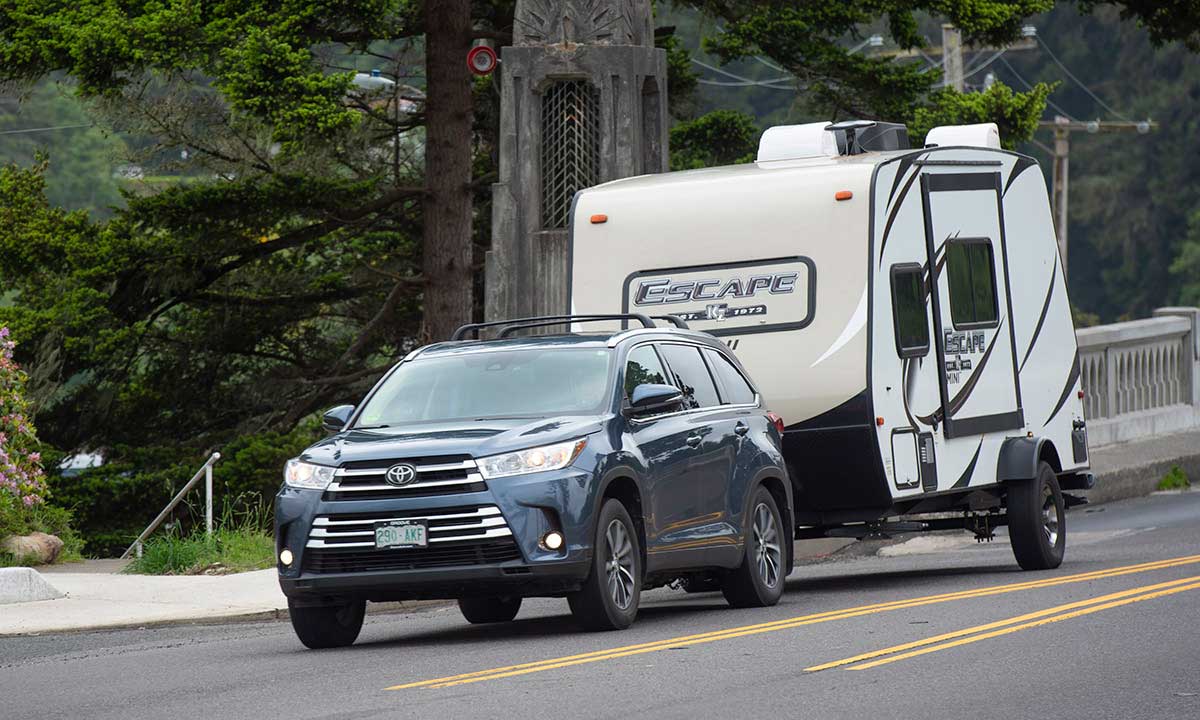
Americans hitting the road to vacation with an RV trailer in tow is at an all-time high. Make sure your travel trailer is the proper Gross Vehicle Weight Rating (GVWR) and doesn’t exceed the maximum tow rating of the vehicle towing it.
Safety concerns towing a travel trailer
From Gen Z to Boomers, RVing via a travel trailer of any type offers freedom and a sense of self-sufficiency. It’s both a practical and comfortable form of lodging. You can disconnect your tow vehicle and have a base camp to explore the area around you.
But towing a travel trailer can bring some unexpected drama and safety concerns for millions of first-time RVers. Trailers add weight to the back of the tow vehicle, and that added weight changes the handling dynamics and braking of the tow vehicle. That’s why you need to make sure your trailer and tow vehicle are properly matched.
This guide explains the basics of towing a travel trailer so your RVing experience is easier, safer, and more enjoyable.
The basics of towing a travel trailer
Towing a travel trailer consists of three components: the vehicle, the hitch, and the RV.
Within those components are variations based on the vehicle’s towing capacity, the weight of the RV , the hitch setup, and towing-related accessories to tie everything together safely.
In this towing guide, we are specifically talking about “tow-behind” or “bumper-pull” RV trailers that attach to the hitch ball on a hitch mounted under the bumper of a pickup, SUV, crossover SUV, or car, not a 5th wheel or gooseneck hitch that mounts in the bed of a pickup truck.
You can easily avoid drama and stress by properly matching the tow vehicle, hitch, and travel trailer. But get one of those wrong, and you have a recipe for disaster.
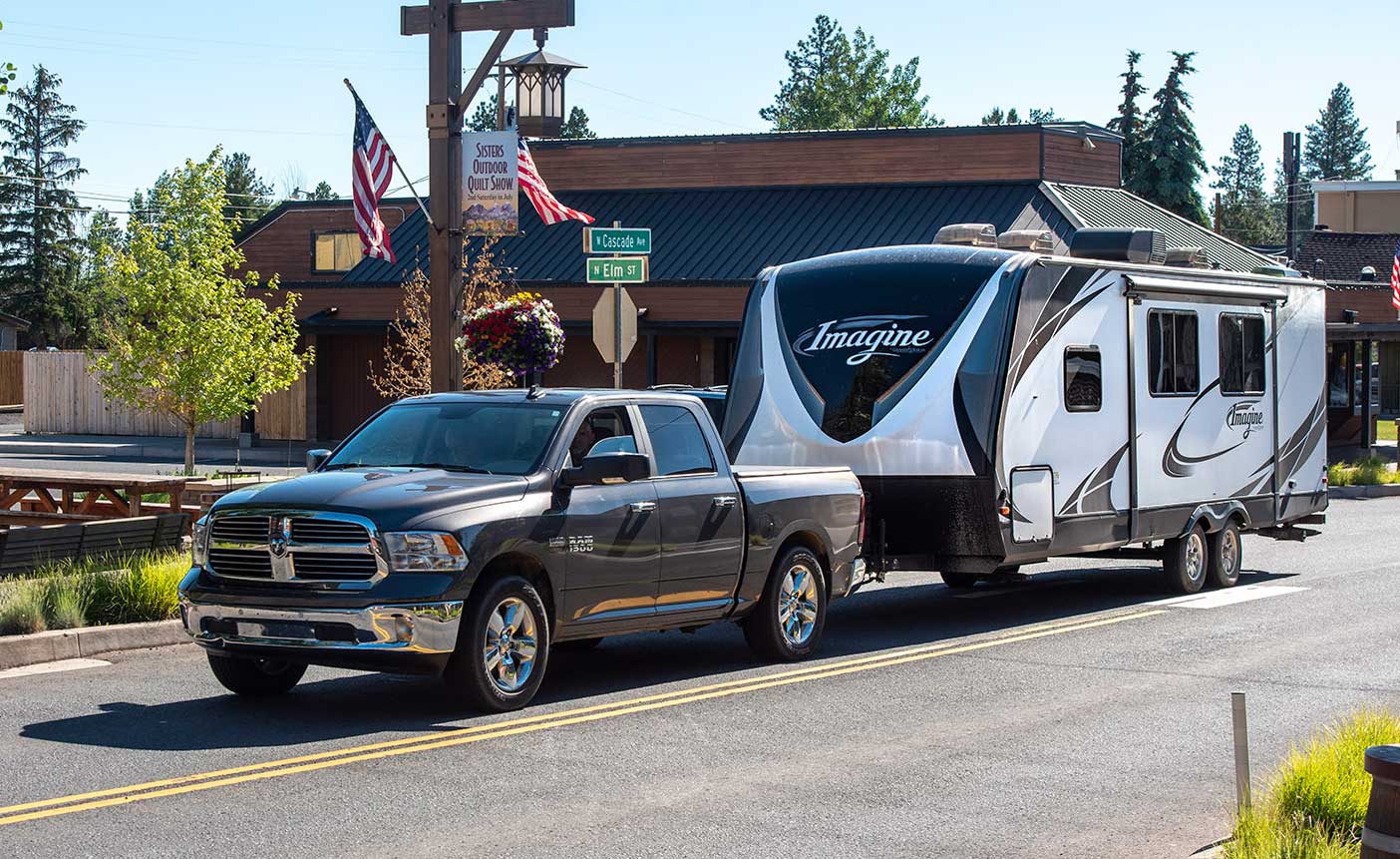
The best vehicle for towing any trailer is the one that fits both your personal needs and requirements while the trailer falls within the limitations set by the vehicle’s manufacturer.
What is the best vehicle for towing a travel trailer?
So, let’s begin with the tow vehicle. One question I get a lot from first-time RVers is, “What’s the best vehicle for towing a travel trailer?” The answer is, “It all depends.”
It all depends on what type of trailer you want to tow, whether you intend to tow with a vehicle you currently own, or maybe you have neither a tow vehicle nor a travel trailer and want to get both.
The most important aspect of towing a travel trailer is making sure the vehicle is up to the task of towing the trailer you plan on attaching to the hitch ball.
Here’s the deal when it comes to tow vehicles: The vehicle manufacturer determines how big (heavy) a trailer the vehicle can safely tow—not you. From a legal standpoint, that’s it, but I’ll explain more later in this RV trailer towing guide.
RV trailer numbers you need to know
There are two important weight-related factors when it comes to RV trailers: GVWR (Gross Vehicle Weight Rating) and tongue weight (TW).
GVWR is the safe maximum weight of the trailer when it’s loaded for camping with water, fuel, supplies, and cargo. The TW is how much downforce the loaded trailer places on the hitch.
Both numbers are displayed on the metal Federal Certification / VIN ID tag located on the front left side of a travel trailer. You can also find the specifications listed on the trailer manufacturer’s website.
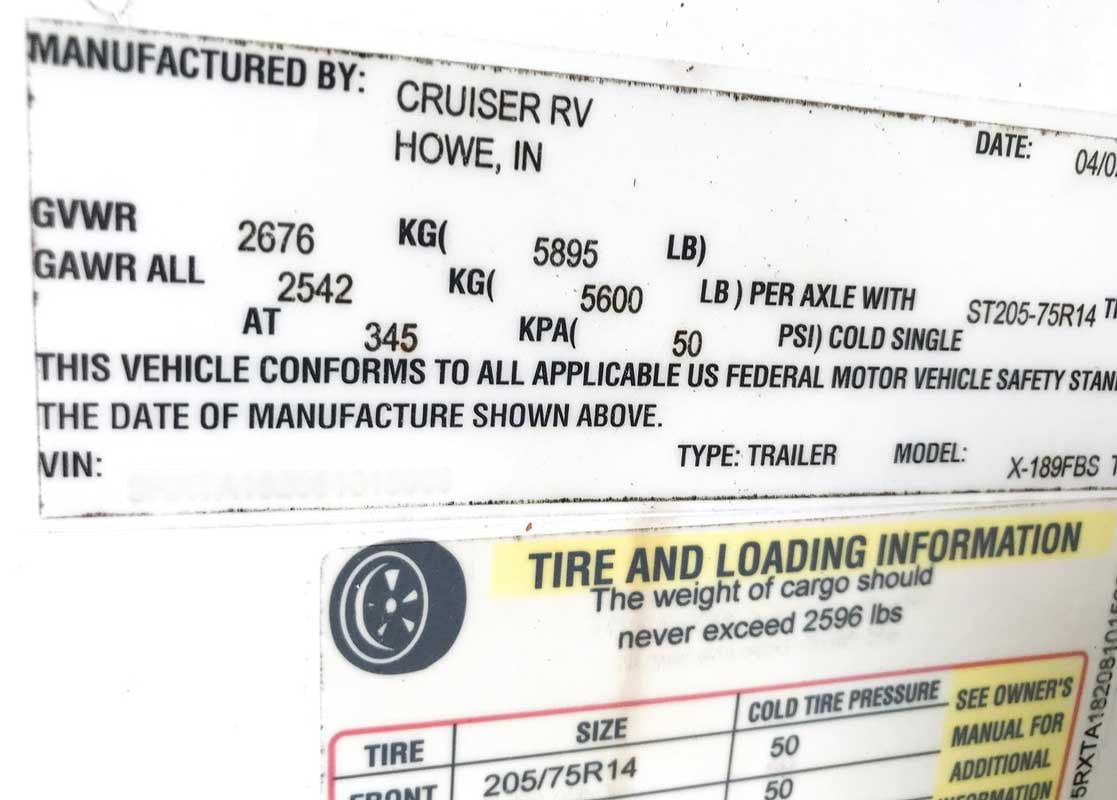
Every RV trailer has an ID/VIN decal or metal tag somewhere on the left front. It shows the trailer’s GVWR, which is the maximum it can weigh fully loaded. This is a critical number to know when matching a tow vehicle to a trailer. The trailer’s GVWR should never exceed the tow vehicle’s maximum tow rating.
Concentrate on those two weights, not the RV’s bells and whistles or nice furnishings. Those two numbers set the basis for choosing the vehicle best suited for towing a travel trailer.
Tongue weight of RV trailers, sometimes referred to as “hitch weight,” will be typically between 10- and 15-percent of the trailer’s GVWR.
For example, a 32-foot trailer like the Forest River Aurora 28BHS , weighing 7,600 pounds GVWR, has a TW of 730 pounds, while the 32-foot Grand Design Imagine 2800BH has a GVWR of 7,995 pounds and a hitch weight of only 604 pounds.
So, do your research. RV trailer weights can vary widely by brand, type, and size. That’s why it’s important to narrow down these numbers to the specific trailer you plan to tow and then make sure those weights match your vehicle’s towing limitations.
Payload calculator
A website called Keep Your Daydream Today does a great job of explaining all the weight-related towing nuances, and the site has a nice payload calculator that can be downloaded to figure out what you can safely tow per the vehicle manufacturer’s listed tow ratings.
How big of an RV trailer can my vehicle tow?
Now that you know the trailer’s GVWR and TW, it’s time to focus on the tow vehicle. Towing a travel trailer from your home to a campground begins with dropping the trailer tongue on a hitch ball. But the most critical aspect of safely getting from Point A to Point B is having the right vehicle for towing.
Your tow vehicle needs to have the power to pull the trailer up hills and maintain reasonable speeds over the open road. More importantly, the tow vehicle has to be properly equipped for towing, per the vehicle manufacturer’s guidelines, and have the factory tow rating capacity to handle the load it’s towing.
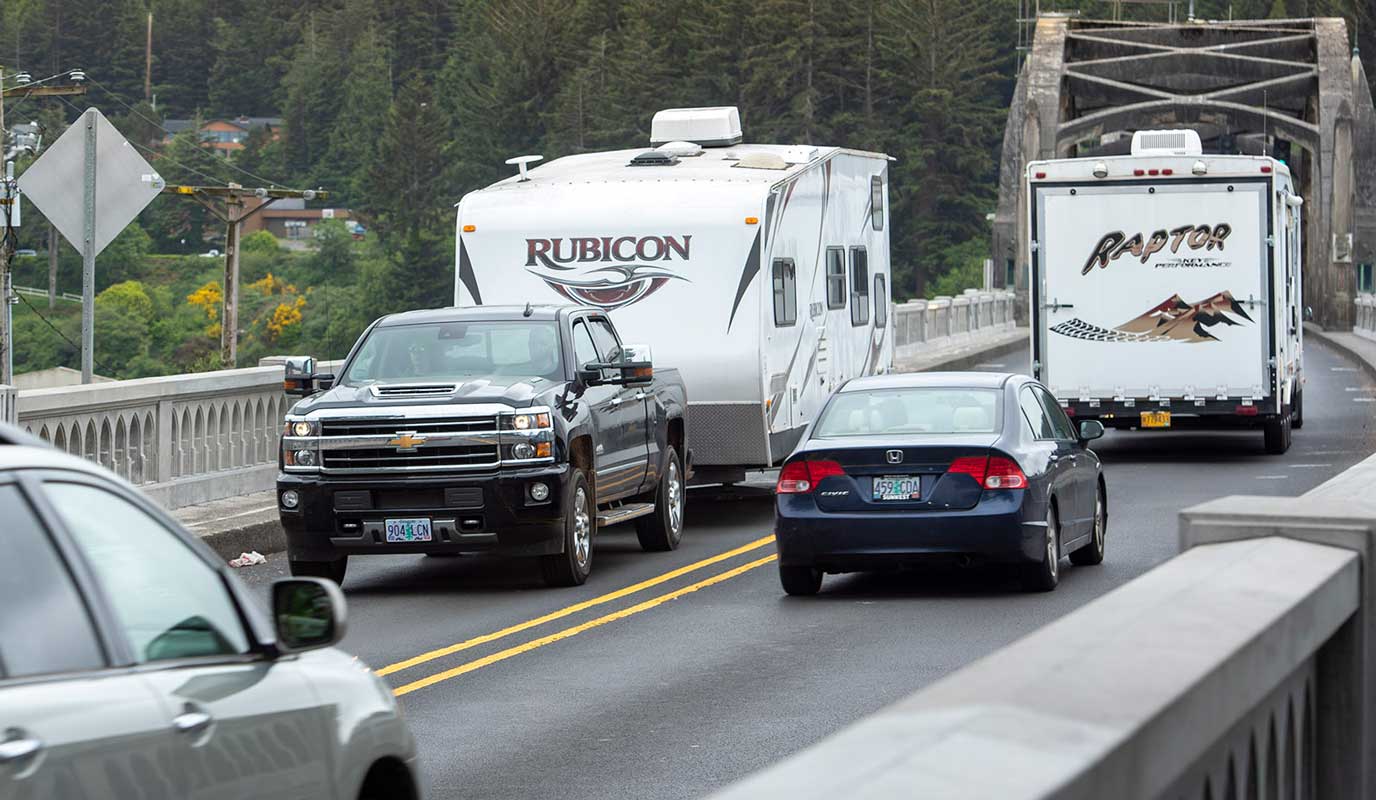
Having the right tow vehicle for the trailer takes all the drama out of the RVing experience and maximizes the safety factor for others on the road.
The only one who can set the limit on how much weight any vehicle can tow is the vehicle manufacturer.
To find your tow vehicle’s maximum trailer towing capacity, and what it needs to be properly equipped per the vehicle manufacturer’s specifications, dive into the towing/trailering section of the owner’s manual. There you’ll find the bare-bones information.
RV tow rating information
But what you really want is the detailed tow rating information. For that, you’ll have to dig deeper. The information is usually on the vehicle manufacturer’s fleet/commercial website under a heading like “RV & Trailer Towing Guide.”
When matching a trailer to a tow vehicle, a good rule-of-thumb is to keep the trailer’s GVWR at less than 75 percent of the tow vehicle’s trailer towing capacity.
So, if the tow vehicle is rated for a maximum of 6,000 pounds, the chosen trailer should have a GVWR of 4,500 pounds or less. Likewise, if the tow vehicle is rated to tow 10,000 pounds, a good trailer weight is 7,500 pounds or less.
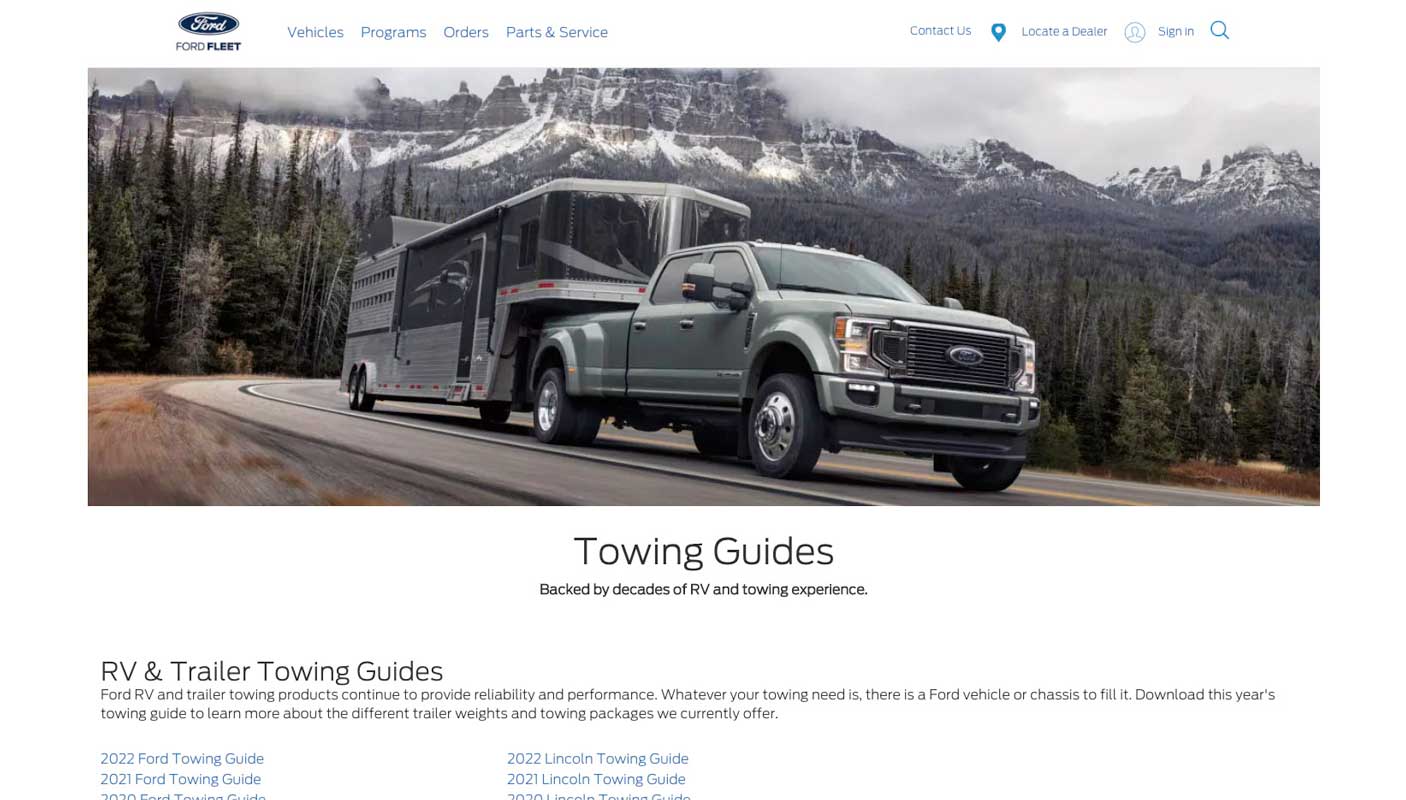
You can find detailed trailer towing information on the vehicle manufacturer’s fleet/commercial website under a heading like “RV and Trailer Towing Guide,” “Towing Guides,” or “Trailering Guide.”
Where to find pickup truck manufacturer trailer towing ratings
To make tracking down trailer tow ratings of the Big Three pickup manufacturers easy, here are those website links:
- Chevrolet: www.gmfleet.com/Guides
- Ford: www.fleet.ford.com/towing-guides
- GMC: www.gmfleet.com/GMC Trailering Guide
- Ram Truck: www.fcausfleet.com/ramtrucks/towing-guide
It’s easy to find the trailer towing limits for cars, SUVs, and crossover SUVs. Pickups are a whole different story.
Pickup truck ratings for towing a travel trailer vary by year, make, model, cab configuration, transmission, and axle ratio. They can also vary related to the type of hitch setup, whether “conventional weight-carrying” (towing-on-the-ball) or using a weight-distributing hitch system. So read the numbers and annotated information carefully.
Vehicle’s trailer tow ratings can’t be changed
As you review trailer tow ratings, you’ll see that just because a vehicle has a hitch doesn’t mean it can tow whatever is attached to the hitch ball. Every vehicle that rolls off the assembly line has a towing limitation, just as it has a unique VIN.
Once a vehicle leaves the manufacturing assembly line, its tow ratings and cargo-carrying capacities are set in stone—just like the VIN. Those ratings could have higher/lower capacities, depending on the engine and transmission package, axle ratio, and other options available on that particular model vehicle. This is especially true of pickup trucks.
Even though installing aftermarket products like air bags and anti-sway bars can improve the ride and handling when towing a travel trailer, such modifications do not change that particular tow vehicle’s limitations as set by its manufacturer.
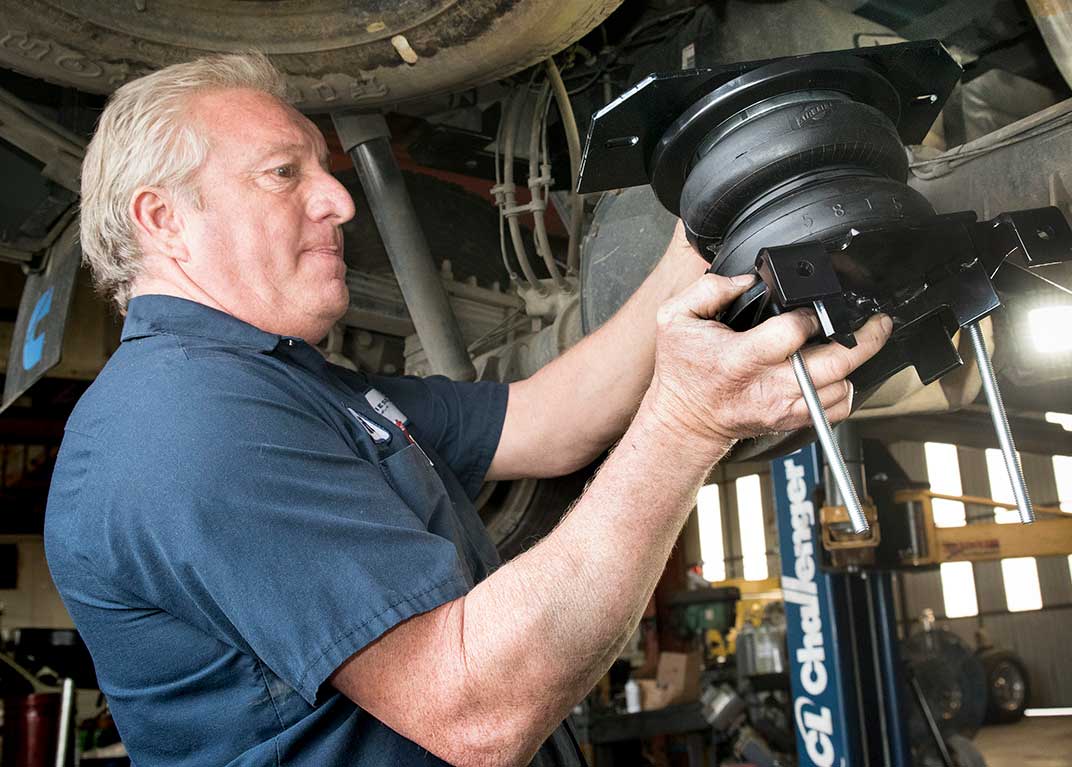
Installing overload springs, anti-sway bars, air helper springs, a heavier-duty hitch, or making other vehicle suspension, drivetrain, or engine modifications does NOT change the vehicle’s tow rating or load capacity. Those ratings are set by the vehicle manufacturer when the vehicle is built.

Why are vehicle manufacturer trailer towing ratings important?
Why is it important to know the trailer towing limits of your vehicle? Safety. Warranty. Liability.
Vehicle manufacturers set vehicle tow ratings and load capacities with safety, warranty, and liability at the forefront. They do so using special test procedures specified under SAE J2807 , which is a strict vehicle manufacturing safety standard focused on keeping the driver and occupants reasonably safe when towing trailers.
At the same time, SAE J2807 testing protocols allow the vehicle manufacturer to set a comfortable weight limit for the vehicle to function reliably through the warranty period when used for such towing and cargo-carrying tasks.
Among the battery of tests within SAE J2807 are emergency accident-avoidance and vehicle control tests with a loaded trailer in tow. If the vehicle being tested doesn’t pass these tests in a manner deemed safe by the vehicle engineering team, then the trailered weight is reduced and the vehicle re-tested until it meets the safety standards. When it meets the safe standard, that’s the maximum trailer towing capacity for that particular vehicle.
Towing a travel trailer that’s heavier than the vehicle is rated for towing, or not having the tow vehicle properly equipped, can put the burden of liability on you if you’re in an accident. Your insurance company could very well deny coverage because under the law, you, the driver, are considered negligent .
Trailer tow ratings can be confusing. But they are very important from a safety and vehicle handling standpoint.
Real-world lessons in trailer weight ratings
A neighbor recently joined the millions of Americans towing a travel trailer on his family’s first RV adventure. He hitched a beautiful Forest River 2021 rPod 190 travel trailer to the hitch of his 2017 Lexus RX 350 AWD. His first weekend on the road towing the trailer “scared him to death” because of trailer sway. He couldn’t understand why his Lexus handled so poorly when it was “rated” to tow 3,500 pounds—according to the trailer salesperson—and the trailer only weighed 2,900 pounds.
We looked at the numbers. He had two issues. First, the “dry weight” of the rPod was 2,900 pounds, but the GVWR was 3,800 pounds. Second, his Lexus was rated to tow 3,500 pounds only if equipped with “a sway control device with sufficient capacity” per the owner’s manual. Otherwise, the trailer towing capacity was limited to 2,000 pounds.
So, he installed a Blue Ox SwayPro 350 weight distribution hitch and made sure the trailer’s GVWR didn’t exceed 3,500 pounds.
He and his wife have spent anywhere from 3 to 5 days traveling around the Pacific Northwest at least twice a month, loving the RV life! For now, the Lexus and rPod are a happy match for their lifestyle.

Even though a salesperson says the vehicle you are buying is “perfectly capable” of towing such-and-such trailer, have the trailer’s GVWR number memorized, and then have the salesperson show you the maximum towing specs for the specific vehicle. In pickups, the difference in axle ratios alone can make a 2,000-pound or greater difference in a tow rating. In smaller vehicles, the same can be true for different engines.
Don’t rely on salespeople for accurate towing info
Another friend bought a 2021 Ram 1500 Laramie 4×4 Quad Cab and an equally nice 26-foot Backcountry Mountain TRX trailer so the family of four could enjoy the outdoor lifestyle during summer and fall. The salesperson at the Ram dealer said the Hemi-powered 4×4 could tow as much as 12,750 pounds, so no problem towing the 9,995-pound Outdoors RV camper.
But what he found out later when looking up the maximum trailer tow ratings in the Ram towing guide was that his particular pickup, with the standard 3.21 axle ratio, was limited to just 8,330 pounds. Fortunately, he persuaded the dealer to swap his new pickup for an identical one that was equipped with the “premium” 3.92 axle ratio, which was rated to tow 11,430 pounds—a much better match to the trailer and much safer for his family.
To that end, you must go back to the basics of weight when it comes to how much your vehicle can tow. You need to know the GVWR of the trailer and the maximum trailer capacity of your specific tow vehicle.
If the trailer’s GVWR is more than the trailer tow rating of your tow vehicle, find a lighter trailer or a tow vehicle with a higher trailer towing capacity.
A good rule-of-thumb in choosing a trailer is its GVWR be no more than two-thirds the max trailer tow rating of the vehicle. This gives you a margin of error on the safe side. Your tow vehicle must also be properly equipped as specified by its manufacturer.
What is the best 4X4 for off-grid RVing?
So what’s the best 4×4 vehicle for towing trailers when camping off the grid and exploring roads less traveled? Most people think the obvious answer is one of the many Jeep models, such as the iconic Wrangler Unlimited Rubicon or Grand Cherokee. They’re partially correct.
Jeep Models
Setting fuel economy and price aside, the Jeep Rubicon 392 is king, setting the highest bar among the Jeep line when it comes to overall backcountry and off-road performance. Its V8 power, technology, and agility are amazing.
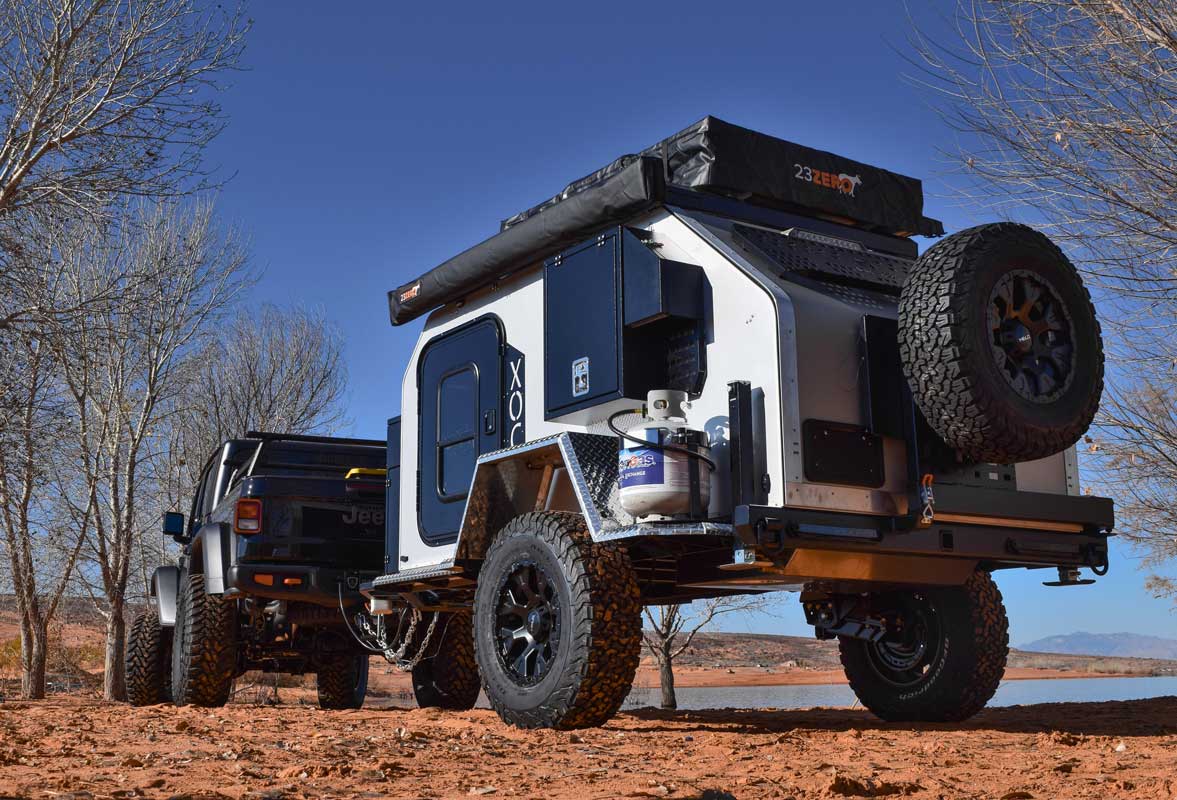
Jeeps are the icon for off-pavement/off-road travel. But the soft, pliant suspension takes away some of their towing ability, limiting most models to towing trailers less than 3,500 pounds. Off-road trailer manufacturers such as Vorsheer, which makes the 2,600-pound (GVWR) XOC, build their trailers to accommodate these tow ratings. Photo courtesy Vorsheer Mfg
But the Jeep Wrangler’s soft, pliant suspension, across all models, is also its downfall when it comes to tow ratings. They are among the lowest in this class of SUV, with a maximum towing capacity of just 3,500 pounds for the 6.4L V8-powered Rubicon 392 to as little as 2,000 pounds for the base model two-door Wrangler Sport with the 3.6L V6.

Jeep’s Grand Cherokee is an excellent tow vehicle for those who do a lot of highway RVing and backcountry travel with “light off-roading.” Some models can tow up to 7,650 pounds.
The Jeep Grand Cherokee has higher tow ratings ranging from 4,000 to 7,200 pounds (Hemi V8-powered SRT). But the Jeep Gladiator pickup is the best choice with a trailer towing capacity of up to 7,650 pounds, depending, of course, on the model and axle ratio.
Ford Bronco
A new contender when it comes to the best 4×4 for RVing off-grid is the latest iteration of the iconic Ford Bronco . Ford’s new SUV leads the pack for four-wheeling in overall performance, with excellent fuel economy, suspension travel, and traction capabilities.
Broncos equipped with the 2.7L EcoBoost V6 and 10-speed automatic combo are ideal for towing. The trade-off for the Ford Bronco’s off-road prowess is a limited trailering capacity of up to 3,500 pounds when equipped with the optional Class II Trailer Tow Package.
If money isn’t an option and you want the very best 4×4 for off-grid travel and towing RV trailers, the 702hp Ram 1500 TRX , with a tow rating of 8,100 pounds, wins. Hands-down. It’s won both Four Wheeler and MotorTrend magazine’s Truck of the Year and several other prestigious automotive pickup awards this year.
Hitch types and hitch capacities
The term “properly equipped” means the vehicle has the factory towing package, which can vary from vehicle to vehicle and from manufacturer to manufacturer. But it always includes a factory-installed receiver hitch and wiring to connect between the tow vehicle and the trailer.
Properly equipped also means using the proper hitch type for the weight of the trailer. There are two hitch types for towing a trailer using a receiver-type hitch: weight carrying and weight distributing.
Attaching the trailer to the hitch ball bolted on the shank that comes out of the hitch is called “weight carrying” because the full load of the trailer’s tongue weight is carried by the hitch assembly.
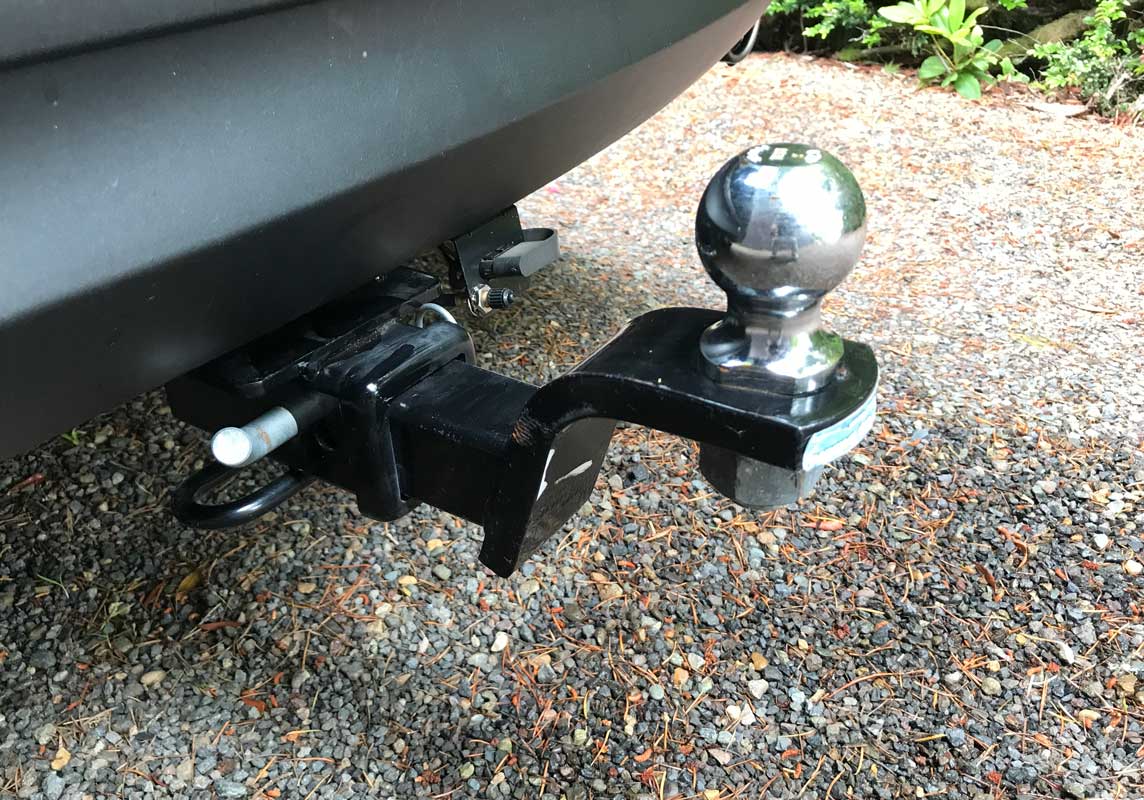
This is a typical “weight-carrying” hitch setup that comes from the factory. It accommodates a “shank” with a trailer ball mount. The load capacity of a hitch can be found on the hitch manual’s decal—the same with the shank. The hitch ball capacity is imprinted on the top of the ball.
The towing capacity of the hitch is determined by the hitch manufacturer, and the maximum load/towing capacities are listed on the hitch, the hitch shank, and on top of the hitch ball. Hitches come in five classifications depending on the size of the opening for the receiver (shank) and load capacity.
The typical factory hitch on cars, crossovers, smaller SUVs is Class I or II.
Midsize pickups, SUVs, and vans generally come with a Class III hitch.
Full-size pickups usually have a Class IV hitch, while some 1-ton diesels use a Class V hitch.
Hitch classes and Gross Trailer Weight
NOTE: Changing the size of the hitch to one with a higher capacity DOES NOT change your vehicle’s tow rating.
Understanding hitch balls and capacity
The most important connection point between the tow vehicle and the trailer is the shiny round thing sticking up from under the bumper—the hitch ball. You’ll have a big problem if the ball isn’t the correct size to fit the trailer coupler, or the ball isn’t installed on the shank (mount) with the correct amount of torque on the nut.
Standard RV trailer hitch balls come in three different diameters: 1-7/8″, 2”, and 2-5/16″, while shank sizes varying from ¾” to 3″ depending on the hitch capacity. The smaller 1-7/8″ hitch balls have a towing capacity of up to 3,500 pounds and are typically found on cars, smaller SUVs, minivans, and crossovers.
Hitches equipped with 2″ tow balls are rated for 8,000 pounds and are typical of that used on smaller travel trailers and overlanding/adventure-style off-road trailers. The larger 2-5/16″ hitch balls are rated from 12,500 pounds to 21,000 pounds and are common on RV trailers that weigh more than 8,000 pounds.
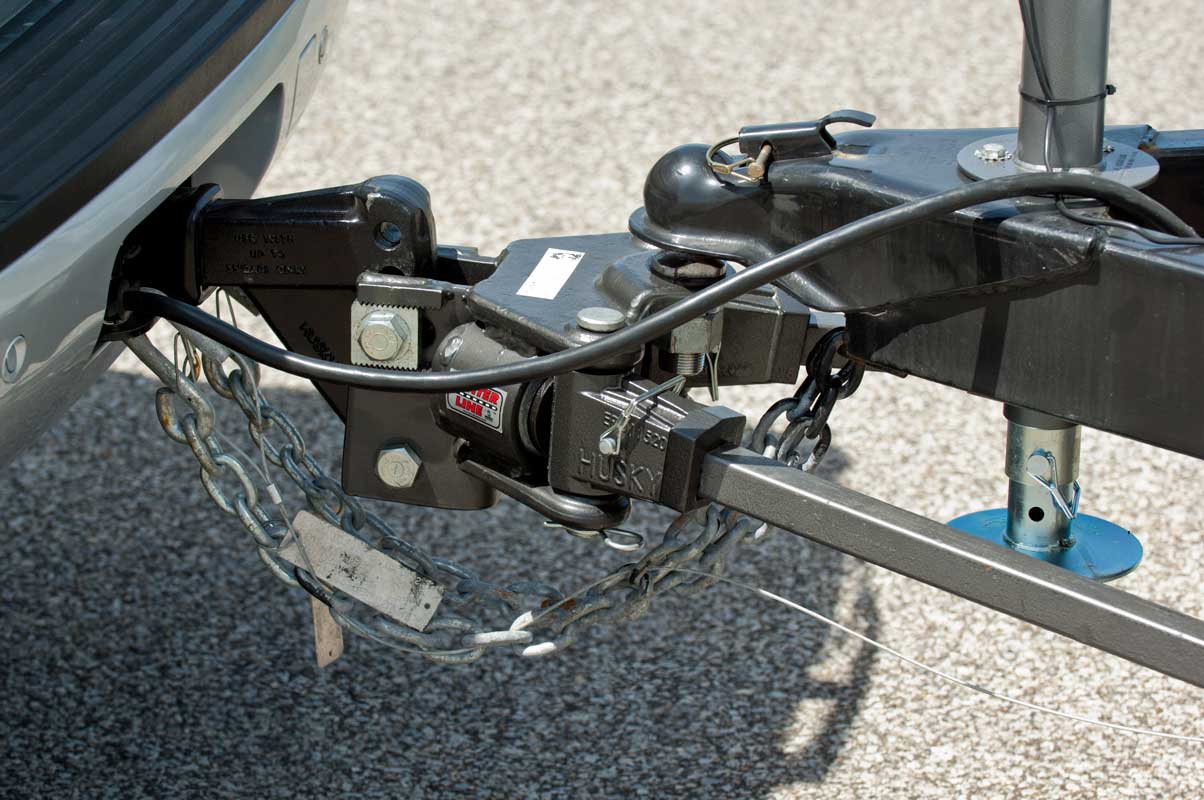
A typical weight-distribution (WD) hitch has two “spring bars” that extend from the hitch head to the trailer. The bars act like wheelbarrow handles, so some of the weight of the trailer on the hitch can be shifted fore and aft to better balance the tow vehicle/trailer combo. A WD hitch also greatly reduces trailer sway.
How do weight distribution hitches work?
A weight distributing hitch , or weight distribution hitch, uses a special head with provisions for attaching one or two long arms that attach to the trailer frame that can be adjusted to transfer some of that tongue weight fore and aft so the tow vehicle is better balanced.
The typical WD hitch also incorporates an anti-sway device or design for better trailer control.
“The weight distribution feature will transfer some of the weight to the front axle, as well as some being transferred back to the trailer’s axle(s)” explains Josh Jones, a customer service rep at Progress Manufacturing , makers of the Equl-i-zer Hitch and Fastway trailer towing components. “Basically, 1/3 of the tongue weight is transferred from your tow vehicle back to the trailer, and the remaining 2/3 is evenly distributed on the front and rear axles of your truck. This gives all four tires equal contact with the road, improving steering and braking, and the hitch’s built-in sway control eliminates sway before it starts so you have a smoother, more enjoyable towing experience.”
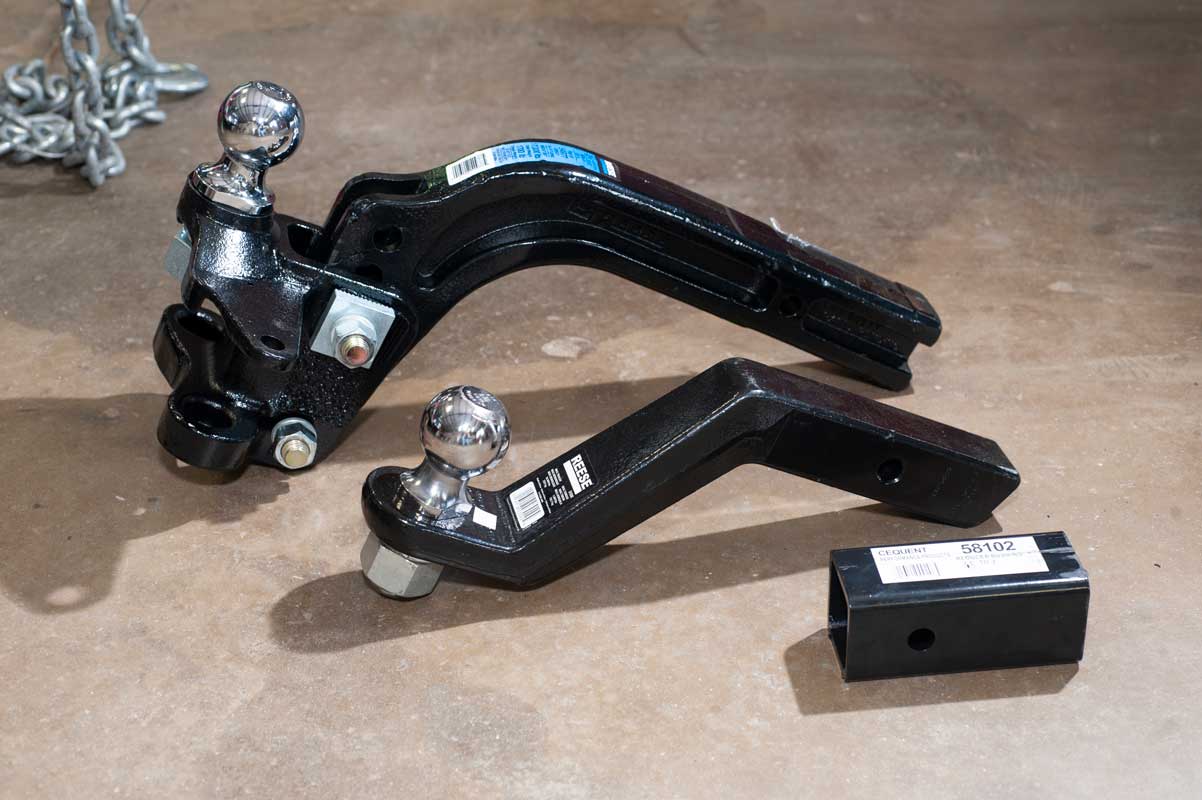
Both weight-distributing (top) and standard hitches have maximum trailer towing ratings. Using a reducer sleeve (bottom) to step down from 2.5” or 3” hitch receivers to 2” also reduces trailer towing capacity.
That’s why the “weigh-carrying” tow capacities of a vehicle, especially full-size pickups, vans, and SUVs, are usually considerably less than a “weight-distributing” setup because more weight is put on the rear axle when one is just towing on the ball.
These dual-capacity tow ratings really apply to pre-2018 and older heavy-duty pickups with some max trailer towing limits of 5,000 pounds towing-on-the ball unless a weight-distributing hitch is used. Also, using the 2″ adapter sleeve in newer pickups’ 2.5″ receiver hitches significantly reduces both the weight-carrying tow limit and maximum tongue weight.
The Best 2022 Pickups For Towing Trailers With GVWR Under 5,000 Pounds
Brake requirements for rv travel trailers.
Attaching a trailer to your tow vehicle places an additional load on its braking system. That means the heavier the trailer, the less responsive the brakes and the longer it takes to stop the vehicle. That’s why most state motor vehicle laws require trailers over a certain gross weight must have their own trailer braking system .
Some state trailer laws require a braking system on trailers with a GVW of 1,500, some 3,000 pounds, and some 6,000 pounds GVW. Other states require the tow vehicle/trailer combo must stop within a certain distance from a designated speed, or the tow vehicle be able to hold the trailer while stopped on a “hill of any grade under all conditions.”
Thankfully the RV trailer manufacturers make the braking aspect of towing a travel trailer easy by equipping their trailers, even the lighter off-road/overlanding camp trailers, with electric brakes on trailers that weigh more than 1,500 pounds. This way, the trailer can be sold in any state and meet the legal brake requirements.
As for trailer brakes, the typical RV trailer has electric-actuated brakes along with a “breakaway” system in the event the trailer decides to go for a little side trip on its own. (Breakaway systems are required on trailers with a GVW greater than 3,000 pounds.)
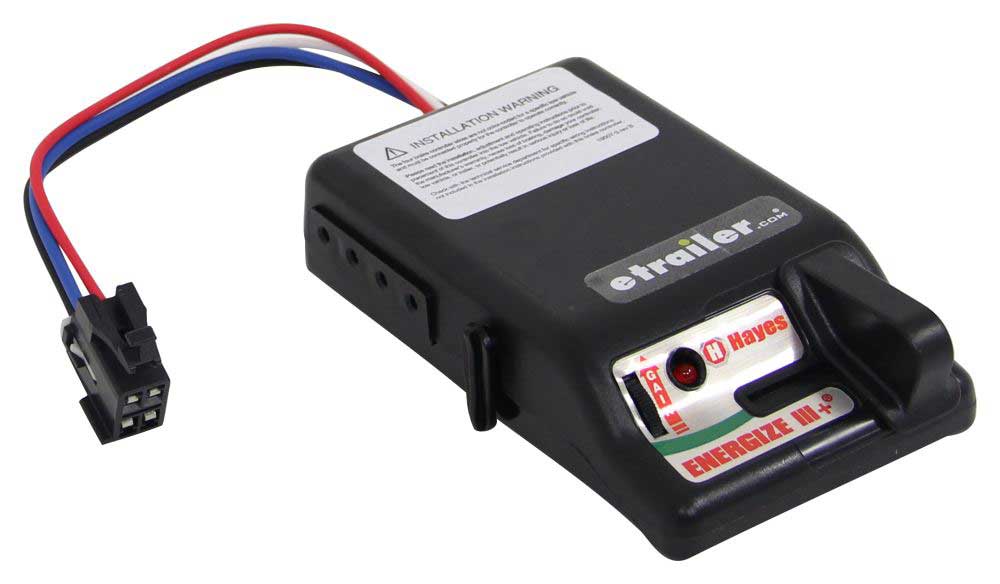
Aftermarket electric brake controllers send electronic signals to the trailer brakes when the driver hits the tow vehicle’s brake pedal. There are lots of types of controllers, and most allow the driver to manually apply the trailer brakes via a dash-mounted controller if needed. Photo courtesy eTrailer.com
How do RV trailer brakes work?
Electric-actuated RV trailer brakes on bumper-pull can be either drum or disc, much like those that stop your tow vehicle. The braking is applied when an electrical signal is transmitted from the brake pedal to a separate device in the vehicle called a brake controller , which then signals and activates the trailer’s brakes.
In an electric drum brake system, the braking signal goes to an electromagnetic actuator inside the brake drum that pushes the brake linings into the drum. On an electric-over-hydraulic disc braking system, the signal from the controller activates a hydraulic pump that pushes fluid in the brake lines to the calipers that engage the brake rotor.
Some of the newest pickups and SUVs have built-in brake controllers, while older pickups and most cars, crossovers, and SUVs will need an aftermarket brake controller unit installed. Either way, it’ll be up to you to make the proper brake controller adjustments per that particular brake controller’s instructions.
Both braking systems require the proper trailer plug, the correct trailer wiring setup in the tow vehicle, and a charged battery in the trailer to operate safely. Part of most vehicle manufacturers’ “Towing Package” includes such wiring and plug for the trailer wiring harness.
Typical travel trailer weights
When you shop for RV travel trailers, you’ll see a wide range in gross vehicle weight ratings (GVWR), even in the tiny trailers and off-road trailers. For instance, the typical teardrop trailer comes in between 1,500 and 2,500 pounds, with the more robust overlanding off-road trailers coming in with a GVWR between 2,500 to 4,500 pounds. Pop-up tent and hard-sided campers generally have GVWRs between 2,000–4,000 pounds.
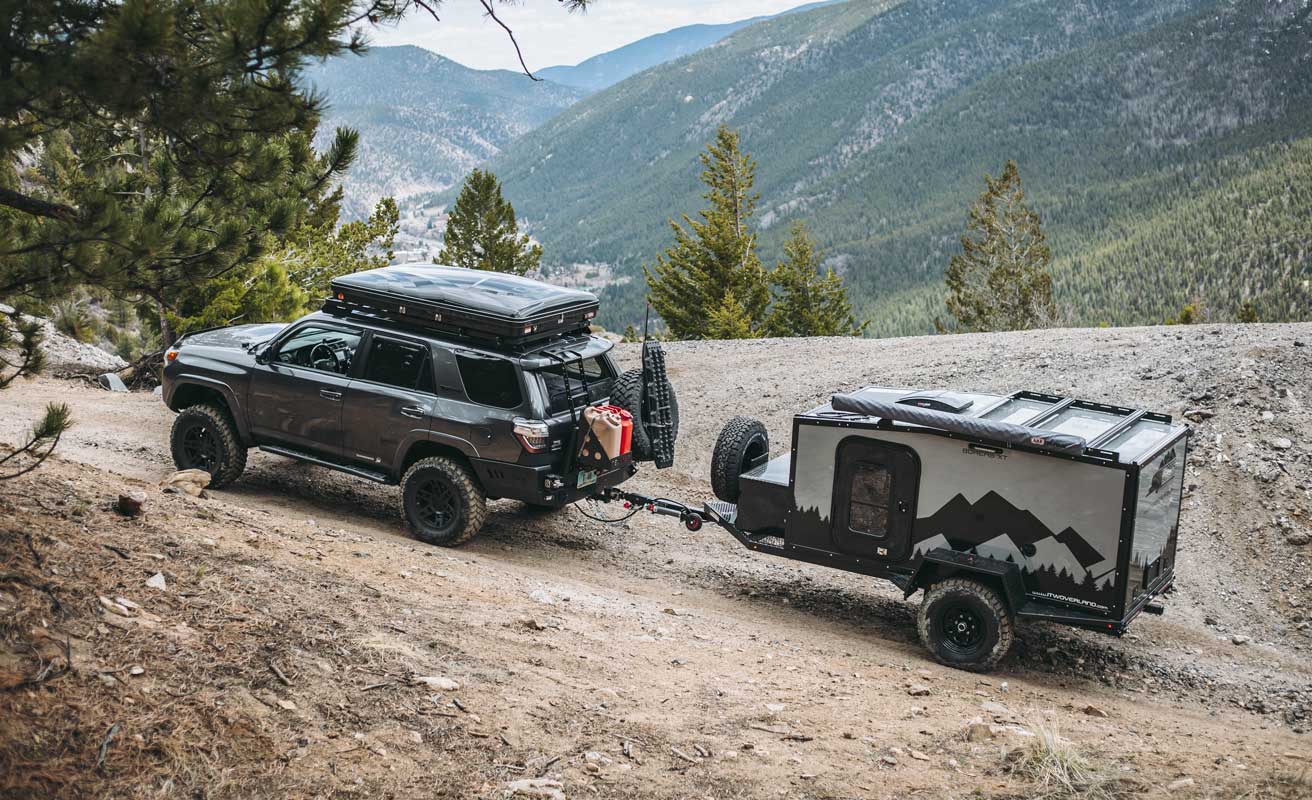
RV trailers are available to fit just about any lifestyle. They also vary in weight, so it’s easy to find the perfect travel trailer to fit your tow vehicle. Some adventuresome RVers—of an estimated 10 million taking vacations with a trailer in tow—will be doing so on roads less traveled. Photo courtesy Boreas Campers
More traditional bumper-pull RV trailers have an average GVWR range related to their length, design (camper or toy hauler), and number of slideouts. Midsize RV trailers in the 23- to 28-foot range have a maximum loaded weight between 6,000 and 8,000 pounds.
Start shopping around for the 30-foot-plus bumper-pull trailers and the GVWRs can top 10,000 pounds, which is nearing the upper limit for most full-size pickups and SUVs towing with a weight-distributing hitch.
Popular trailers for towing and average weights
While there are hundreds of travel trailer brand and specification combinations we could list, we’ll focus on some well-known RVs to give you a sense of what to look for when shopping for a trailer to tow:
Where do electric pickups fit in with towing RV trailers?
Electric vehicles, aka EVs, are slowly making their way into the automotive market but still only make up less than 2 percent of the new car market in the U.S., according to Pew Research and other market watchers.
EVs, whether car, SUV, crossover, or pickup, are excellent modes of transportation for city and urban settings. Not so much so in rural America, where the availability of designated plug-in sites is few and far between. EV vehicles also cost a lot more than their gas and diesel counterparts. If the current federal tax incentives or EV tax credits are phased out, that price disparity will be even greater.
Then there’s the cost of EV ownership over the life of the vehicle to consider, along with trade-in value. After all, all batteries wear out, and the packs in EVs are no different.
What will it cost to replace an EV’s battery pack in 100,000 miles or 10 years? It’s not going to be cheap. A Greencars.com article claims that cost could be as high as $15,000, not including labor.
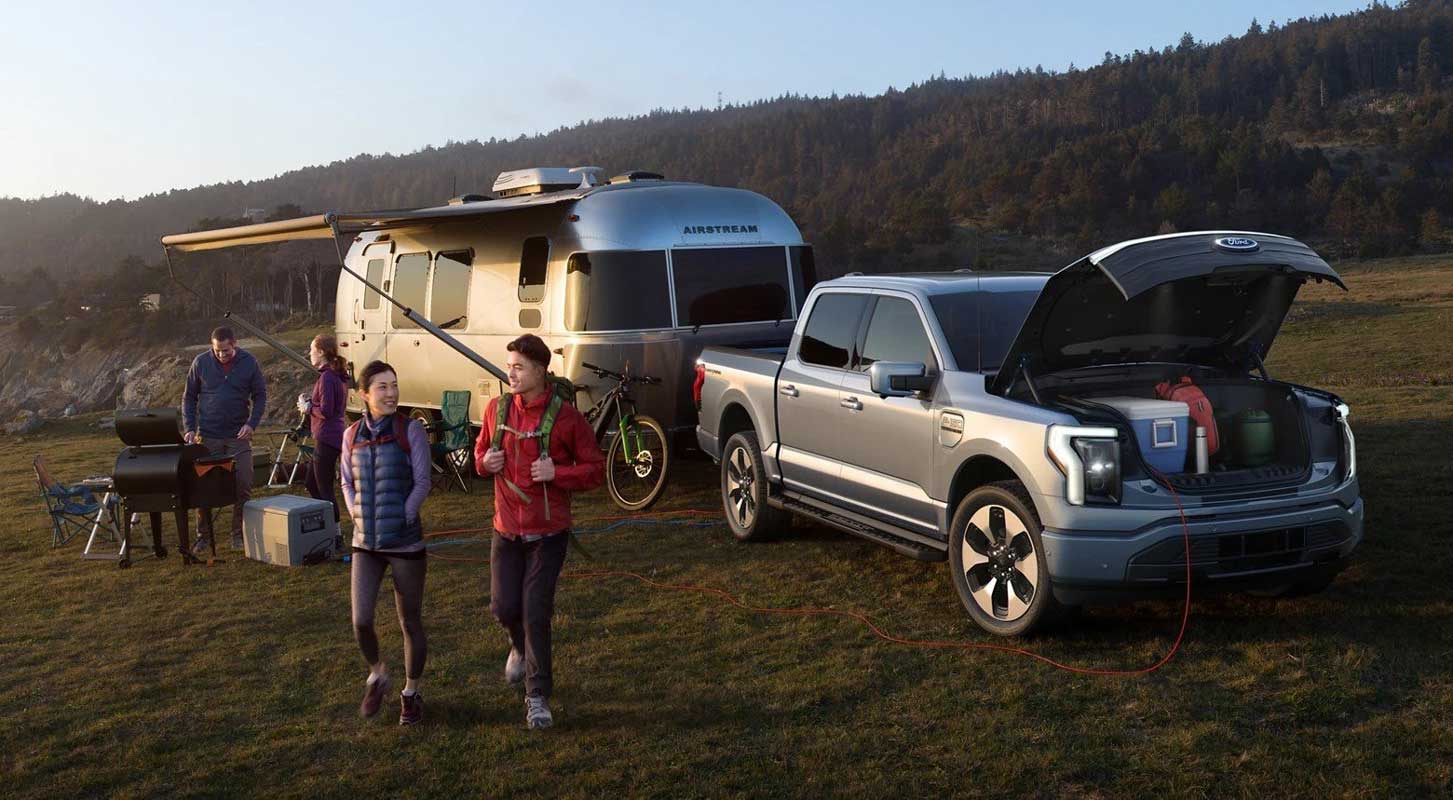
All-electric (EV) pickups are emerging from different vehicle manufacturers as battery technology advances. One of the great things about EV pickups and SUVs is the engine compartment becomes a big trunk! Photo courtesy Ford
RV trailer towing range for EV pickups
Trailer towing brings up another matter: driving range. EV pickup’s capability in distance between charges is cut by 1/3 to ½ when towing a travel trailer. So instead of being able to drive 250–300 miles unloaded, you’ll need to look for a place to plug in every 3 to 4 hours. That’s not convenient and not what most RVers want in a tow vehicle.
Ford’s 2022 F-150 Lightning , with a towing capacity of 10,000 pounds, sports EPA range numbers of 230 miles for the “standard” battery pack and 300 miles with the optional “extended range” pack. The trailering range is probably going to be around 150–200 miles depending on the battery pack.
The F-150 EV battery packs require 10 to 13 hours to fully recharge with the Ford Charge Station Pro , which plugs into either 120V or 240V outlets. We’ll probably see EV charges common as their evolution continues.
Sure, the EV F-150 can be turned into a backup power station, but that power comes from the battery pack, good for off-grid camping but shortening the driving range even more. So, if you’re keen on going green by towing your travel trailer with an EV, keep the driving range in mind.

EV pickups are hitting the road, and RVers are taking note. The 2022 Ford Lightning EV has a trailer towing capacity of 10,000 pounds and a range estimated at 150–200 miles between charges when towing, depending on the battery pack option. Photo courtesy Ford
Tow ratings for EV pickups & SUVs
*Unloaded **GM has not released final numbers
Now that you know how to match a tow vehicle to a travel trailer and set it up safely, you’re ready to tow like a pro. It’s time to head out on the road, have fun, and make wonderful memories. That’s what the RV life is all about!
Make your next RV trip even easier and more enjoyable with an RV-safe GPS . With it, you can get directions custom tailored to the height and weight of your tow vehicle and travel trailer. The turn-by-turn navigation, including voice- and lane-guidance, works even when you’re offline. No more worrying about steep mountain passes, low clearances, bridge weight limits, or propane-restricted tunnels.
Continue reading:
- 7 Things You Need To Know For Safe RV Towing
- What Is Your Gross Vehicle Weight (And Why Does It Matter)?
- 4 Trailer Safety Tips That Could Save Your Life
- Skip to main content
- Skip to secondary menu
- Skip to primary sidebar
- Skip to footer

Jeffsetter Travel
Travel Consultants and Travel Tips
Forest River RV Reviews: Everything You Should Know
April 9, 2022 by August Croft
Last updated on September 26th, 2023 at 05:42 am
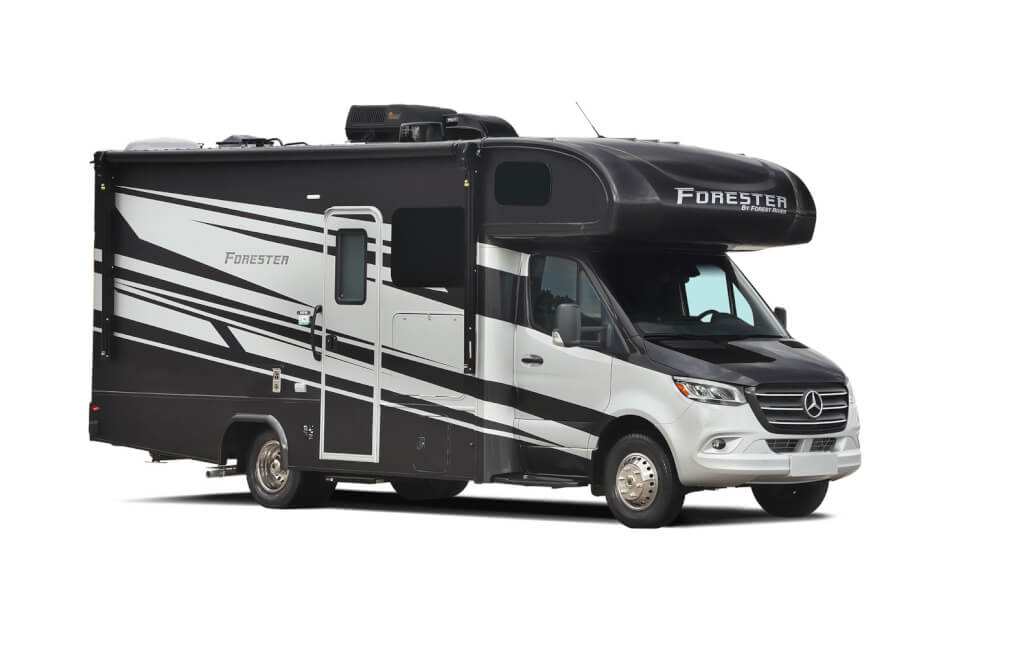
All of our reviews are based on exhaustive research, industry experience and whenever possible, hands-on testing. When you make a purchase using one of our chosen links we’ll receive a small percentage of the proceeds. This supports the site and keeps Jeffsetter running. You can read more here .
Regarded as one of the largest manufacturers of RVs in North America, it’s never a bad decision to get some more info and read reliable Forest River RV reviews. There’s so much to find out. What’s Forest River like as a company? How do Forest River RVs perform on the road? Are Forest River Rigs long-lasting?
In this article, we’ll address all things Forest River: details about the company, the number of RVs they currently manufacture, and lots more. We’ll also take a deep dive into some Forest River RV reviews, including ones from reliable customers and long-time RVers.
At the end of this guide, you’ll be completely clued up about everything there is to know about Forest River and their lineup of RVs. You’ll then be able to make an informed purchase or upgrade based on what we reveal about their RVs. Let’s get started and talk about Forest River now!
Forest River RV Company Overview
Founded in 1996 by Peter Leigl, Forest River Inc. is only one name for many different assets and products offered by Forest River. They specialize in RV manufacturing, commercial trucks, pontoon boats, shuttle buses, and cargo trailers. Not only do they produce RVs under the Forest River name, but they also have a variety of additional companies and divisions that make quality RVs!
Other Forest River companies and divisions of Forest River include:
- East to West
- Primetime Manufacturing
- Forest River Park Models
Forest River itself is a company under the umbrella of Berkshire Hathaway, so it belongs to a fairly large conglomerate. However, they are dedicated to building a better RV, both for the new RVer, families , and full-timers alike!
They offer manufacturing facilities in the Midwest and West Coast so orders can be filled faster and travelers can hit the open road quicker! Forest River manufactures their RVs using a complex and rigorous inspection process covering everything you want in a new RV. We’ll talk more about their inspection and testing process later, but there’s a lot to be said for Forest River’s dedication!
What Kinds Of RVs Does Forest River Offer?
Forest River offers a wide variety of RVs, especially when you consider the other companies they own, such as Dynamax and Coachmen. However, we’re just going to take a look at the Forest River-branded RVs today.
If you’re looking for a budget-friendly rig, I highly suggest checking out what Coachmen has to offer. On the other end of the spectrum, Dynamax is perfect for those of you shopping for a luxury motorhome!
The Forest River RV brand name manufactures the following types of RVs:
- Travel trailers
- Fifth wheels
- Class A motorhomes
- Class C motorhomes
- Toy haulers
- Pop-up camper trailers
But how many different types of each of these RVs do they manufacture, and what are the average lengths of these trailers and motorhomes? You can scroll to the bottom of this page for the complete list.
What Do Customers Have To Say About Forest River?
Now you know a little bit about all of the makes and models offered by Forest River, what do customers have to say about the company as a whole? There are many different reviews for Forest River at this point in time. Let’s look at what people like you have to say about this company!
Positive Reviews
Forest River earns a great deal of positive reviews for several reasons. Their rigs are appealing to such a wide audience, that it’s no surprise I see their campers and trailers when I’m traveling around in my rig!
Variety Of Models And Styles
Not only does Forest River have a huge number of models and styles, but they can offer these models in a variety of formats. Take the Hemisphere travel trailer, for example. Not only does this travel trailer come in both a fifth wheel style hitch, but it also comes in a traditional travel trailer style hitch.
It also has floor plans that offer toy hauler ramps, and Forest River offers lightweight versions of the same model so you can tow the rig with a lighter-weight vehicle. Simply having so many options appeals to a great number of people. While it can get overwhelming if you’re new to RV shopping, most people who are looking to purchase a new RV want a large number of options.
Affordable Options
Given everyone’s lifestyle and needs are different, it feels as if Forest River has made RVs for just about everyone. Not only does Forest River offer a wide variety of models and styles of RVs, but they also offer these makes and models at affordable prices.
Forest River is known for appealing to a wide number of budgets, making rigs that suit first-time buyers as well as seasoned pros. They want you to continue to invest in their company for the entire time you choose to purchase new RVs.
Range Of Dealers And Retail Locations
Another perk when it comes to positive reviews for Forest River is that they have dealers and retail locations available primarily in the Midwest and West Coast. However, Forest River RVs are popular enough that they are located Nationwide and in Canada as well. It is extremely difficult to tour an RV lot and not find at least one Forest River RV!
Given that there are so many different makes and models, many positive reviews for Forest River mention the floor plans and layouts. Customers love having options, and these options typically work well for them in terms of space, comfortability, and storage solutions.
Negative Reviews
What goes up must come down, and there is indeed a negative side to any purchase, including one from Forest River. What is the main complaint regarding this RV company? The majority of customers who buy a brand new Forest River RV have difficult interactions with the customer service line, warranty troubleshooting, and the longevity of their rigs in general.
Rapid Signs Of Wear And Tear
Something that could be said about Forest River is simply that you get what you pay for. The budget-friendly prices offered by this company typically go over well with consumers and customers. However, the long-term ownership of a Forest River RV may leave something to be desired in terms of the craftsmanship and durability of the vehicle.
Granted, very few recreational vehicles are designed to last more than a couple of decades, even with regular maintenance and care . However, many of the complaints about Forest River’s manufacturing happen within months after purchasing a new RV. That is typically considered inexcusable and an issue in the RV community, especially in conjunction with difficult customer service and warranty redemption programs.
Warranty Problems
Plus, many reviews mention service department issues in conjunction with warranty troubles. For example, despite having service centers and RV repair locations nationwide, certain models of Forest River RVs can only be serviced at certain locations. This often leads to an abundance of confusion and complications should your RV need a serious repair that is indeed covered by the warranty.
Many customers mention the fact that they purchased their Forest River RV in the Midwest and transported it back home, only to find out that their RV can only be serviced in the Midwest once more. This is an unfortunate part of the warranty and manufacturing process, especially when you consider how large of a company Forest River is. They should have the ability to accommodate more customers, no matter their location in the United States.
With all of this in mind, what else should you consider when looking at Forest River reviews and product information? Let’s discuss this now.
Rushed Manufacturing Process
There are a large number of negative reviews for Forest River that have come out in the last 2 to 3 years. The COVID-19 pandemic had a large effect on the RV industry, given travel was limited and many people resorted to RV camping as a source of entertainment. However, this also meant RV manufacturers couldn’t keep up with demand and were constantly trying to meet deadlines they were perhaps overbooked for.
This isn’t to excuse Forest River’s potentially haphazard and rushed manufacturing process. A company of this caliber should still be able to produce RVs at a rate that does not compromise their manufacturing quality. However, given the influx of demand and Forest River’s desire to meet such demands, it would only make sense that there are more negative reviews now than ever before.
Considerations
The COVID-19 pandemic created far more RV owners than ever before. Many of these RV owners were first-time RV owners, which means they potentially have unrealistic expectations when it comes to purchasing and owning an RV. The amount of maintenance and potential repairs required for RVs can be overwhelming, especially for new customers expecting perfection.
With all of this in mind, let’s take a look at Forest River reviews in more depth. Let’s specifically talk about the build quality of these RVs, the customer service and warranty options provided by Forest River, and the layouts and design elements present in any new RV produced by Forest River.
Forest River RV Reviews: Build Quality
There are decidedly mixed reviews regarding the build quality of Forest River RVs. Many customers experience little to no issues in the quality of their RVs, while other customers experience nothing but issues with the construction and manufacturing of their new rig.
It’s safe to say the majority of customers who have issues with the build quality of a Forest River RV have very specific issues regarding one component or reoccurring problem. M any Forest River RV owners experience trouble with the slide-outs and mechanical components. Some of these include water pumps, air conditioners, refrigerators, and water inlets. Some reviews also mention the seals around the doors and windows being poor.
However, many reviews say the build quality of their RV is sound. Given Forest River constructs their RVs using Azdel materials and lightweight steel, they are built to last as long as everything has been correctly sealed and constructed in the first place! In terms of construction, Forest River states “random units from each of our brands are subjected to rigorous testing at our 20,000 square foot pre-delivery inspection (PDI) building on top of the inspections that all units undergo as they are being built.”
The inspection process sounds promising, but given the fact it’s random, it may not be as helpful as you think. Forest River goes on to say “Units selected to go through PDI are checked for issues in electrical, plumbing, LP system, function, cosmetic, codes and standards, rain bay, and other miscellaneous tests. This process provides our plants daily feedback to ensure every unit being built meets the high-quality standards.”
It seems as if Forest River has a lot to offer their customers in terms of build quality and inspections for new ownership. However, Forest River may need to work on their overall consistency when it comes to finalizing products before shipping them out the door.
Forest River RV Reviews: Customer Service and Warranties
Of all the negative reviews, the majority of them stem from issues regarding Forest River’s customer service and warranty programs. Not only do many customers mention having issues with scheduling repairs for their RVs, but they also mention the limited warranties often don’t cover what they believe they should.
Forest River recently updated their one-year comprehensive warranty based on the date of purchase of any new recreational vehicle. For example, any RV purchased on or before June 30, 2021, has a slightly different warranty compared to any RV purchased after this date. For the most part, this doesn’t affect options too much. However, it’s important to mention this for any new RV owners.
For the most part, Forest River covers any substantial defects that occur to any of their RVs for a full year. Substantial is, of course, subjective, and this is where many customers run into issues when trying to redeem parts of their warranty. Forest River also offers a 90-day repair or replacement policy on a variety of RV components , should they malfunction within this window of time.
However, this window of time is extremely brief, as is a year’s warranty when you consider the overall lifetime of your RV. Given the price points of the majority of Forest River’s travel trailers, fifth wheels, and motorhomes, this is generally what is expected from a warranty of this caliber. There are reviews mentioning Forest River having issues with returning phone calls and emails, including customer complaints and time-sensitive needs.
Given the influx of RV repairs and sales happening around the country, it’s to be expected that things take a bit longer than they perhaps have in the past. However, ignoring warranty requests and customer service complaints is inexcusable. It’s definitely something Forest River has room to improve on.
Forest River RV Reviews: Layouts and Design Elements
One of the overwhelmingly positive aspects of Forest River is their abundance of layouts and thoughtful design elements throughout their RV models. Many customer reviews mention a particular layout or design is why they decided to purchase a Forest River RV when compared to other popular brands.
As we’ve already mentioned, having so many different choices and layouts can be especially beneficial to an RV manufacturer and RV business. Every customer is looking for something different from an RV, depending on how often they plan on using it, where they plan on driving it, and how many people they hope to sleep inside.
Not only does Forest River produce enough RVs and layouts to suit everyone’s needs, but they also offer RVs in a variety of weights. For example, many travel trailers and fifth wheels have ultra-light construction options so they are easier for more vehicles to tow. Their motorhomes also come in gas and diesel fuel types so you can choose something that works best for you in the long run.
The design elements are also simplistic and easy to care for, including a wide variety of floor and countertop materials. You can get spacious bathrooms as well as compact wet baths . The sky’s the limit in terms of the layouts and design elements found in any one Forest River RV, and this doesn’t even include the abundance of optional features you can add after the initial purchase price of your new RV.
However, you can’t put a bow on all of the issues Forest River seems to have and expect their customers to be happy. Having an abundance of choice may seem like a good thing at first, but Forest River is notorious for introducing layouts and designs one year and promptly getting rid of them the following year if they don’t sell. This can lead to inconsistencies in their overall product manufacturing and is something to keep in mind.
6 Top Rated Forest River RVs
Your head may be swimming with all of these customer reviews and information surrounding Forest River RVs. However, what are some of Forest River’s top-rated RVs, and why? Let’s take a look at some of their top-selling models and selections, based on the style of rig. This way, you can get an even better idea of what they can offer you!
Forest River Travel Trailer: r-pod
- Aerodynamic and lightweight
- Easy to tow
- Variety of layouts
Cons:
- Too compact for families
- Limited bathroom options
The unique construction and flexibility of the Forest River r-pod make it one of their top-selling travel trailers and RVs across the board. Depending on your region, there are some discrepancies in the number of floor plans and features. This is also likely affected by the number of RV repair shops Forest River has nationwide, but it essentially splits the r-pod into the r-pod Classic and the r-pod Hood River Edition.
No matter what, the r-pod is a lightweight and convenient travel trailer for many reasons. The rounded shape of this travel trailer makes it easy to tow and helps maximize fuel economy when driving. Plus, the r-pod is small enough to take off-road or wherever boondocking adventures take you. Speaking of boondocking, you can have an entire solar setup installed on your rig, along with a 30-gallon fresh water tank.
You should have no trouble towing this rig wherever your adventures take you, and this doesn’t even address all of the Interior features that the r-pod has. Given the r-pod ranges in length from 17′ to 25′ it’s a compact travel trailer. This may make you think it won’t feel particularly spacious and welcoming inside, but many customers mention being surprised at how homey and roomy this particular RV feels.
There are nearly a dozen r-pod floor plans available to choose from, with some including Murphy beds along with walk-around queen beds. You should have everything you need to enjoy a weekend away or even travel full-time in this RV. It’s budget-friendly, easy to tow, and a fantastic starter RV for just about any couple or family.
Forest River Fifth Wheel: Vengeance
- Huge toy hauler with impressive capacity
- Sleeps multiple people
- Attractive interior
- Difficult to tow
- Hard to store
It’s rare to find a fifth wheel that’s also comfortable and homey, but Forest River has accomplished both in the Vengeance . Not only is it possible to fit a variety of recreational toys inside this fifth wheel, but there’s also space to sleep 5 to 7 people! There are three different models of Forest River Vengeance RVs, the Vengeance Rogue, Vengeance Rogue Armored, and Vengeance Rogue SUT.
Ranging in length to over 40′ long, these rigs are mighty! There are very few small toy haulers on the market today , and the Vengeance isn’t one of them. However, that doesn’t mean that this rig doesn’t have a lot to offer, especially for those looking to bring the whole family on vacation, as well as plenty of gear.
Given the large size of this rig, it has a cargo-carrying capacity of nearly 4,000 pounds. This is enough to cover several ATVs, motorcycles, kayaks, and more. Plus, the interior design of this fifth-wheel toy hauler is particularly special and unique. The kitchen is complete with residential-size appliances and fixtures , and the overall interior feels light and bright.
There are many windows to help bring the outside in, and plenty of awnings and exterior features to keep everyone happy and smiling, no matter the location or weather situation.
Forest River Class A: Georgetown
- Homely interior
- Reasonable length so easier to drive
- Gas engine for easy fill-ups
- Limited layouts
The Forest River Georgetown Class A motorhome won RV News’ 2021 award for the best gas Class A RV on the road, and it’s easy to see why! While it only has three available floor plans, the Georgetown is ideal for a wide variety of RV customers who are seeking a Class A RV with a gas engine and a fair price point.
Ranging in length from 35 feet to 40 feet, this Class A RV is large and powerful. However, it still has a lot to offer even with its limited amount of layouts and shorter length compared to other Class A RVs. The interior design of this RV is spacious and sophisticated, making it appealing to a wide variety of RV consumers.
All the layouts of this Class A have an electric fireplace, residential fridges, and stoves, along with walk-around King beds with optional power lift capabilities. There are also washer-dryer preparation capabilities available in this rig for those considering it as a full-time living space . Plus, there’s a four-season package and an on-board generator so you can handle anything that comes your way.
Forest River Class C: Forester
- Variety of chassis options
- Numerous floorplans
- Easy to drive
- Lacks luxury edge
The Forester from Forest River is their top-selling Class C model, likely because it comes in so many different chassis options. You have the option of choosing from a classic Ford Chassis, a classic Chevy Chassis, a Ford Transit chassis, and a Mercedes-Benz chassis. The Mercedes-Benz chassis also comes with a diesel engine , while the majority of these are gas engines.
There are over 10 available floor plans for the Forester, across all chassis options. Depending on the chassis you prefer, there may be slightly fewer or more floorplans available. However, all of them are unique and spacious, with plenty of storage options and sleeping solutions. Plus, this Class C is a reasonable size, ranging from 23 to 32 feet in length, making it easier to drive than other RV options .
Depending on the interior design you’re looking for, there are layouts with walk-around queen beds, bunk beds for the kiddos, and residential kitchens so you can cook to your heart’s content. The bathrooms are also flexible in terms of layout, with some separate toilet and shower combinations so the sink is still accessible to the whole family.
If you’re purchasing a Class C RV for the first time, you can’t go wrong with the Forester from Forest River. There are enough layouts to keep things interesting, and plenty of safety features to keep this rig easy to drive. Plus, there are many different interior design choices available to make, as well as add-on features such as solar panels and additional batteries.
Forest River Toy Hauler: XLR
- Abundance of floorplans
- Multiple add-on packages
- Lightweight frame
- Easy for final cost to increase with add-ons
- Longer lengths are difficult to tow
The XLR comes in a larger travel trailer style, a fifth wheel trailer style, as well as an Ultra Lite toy hauler for your lower capacity tow vehicles . Today, we will focus on the XLR Hyperlite since it is a more compact toy hauler than the Vengeance, and it has a variety of floor plans to suit many different people. Let’s talk about it in detail now.
This compact toy hauler won RV News’ 2021 award for best travel trailer toy hauler of the year, plus the best overall award in 2020. Not only does it come in 6 possible floor plans. Each one has a sturdy and heavy-duty ramp for transporting your toys in and out of the rig.
This particular travel trailer weighs less than 9,000 pounds when empty, and has a cargo-carrying capacity ranging from 1,000 to just shy of 5,000 pounds, depending on the floor plan. This means that you have an ample amount of carrying capacity for your toys and goods, all on a compact frame. This travel trailer ranges in length from 29 feet to 38 feet!
You can get different packages added to the purchase price of this particular toy hauler. Some of these packages include an Exterior package, a chassis package, a garage package, a technology package, and more. While these will add to the ultimate cost of your new RV, the additional features that each one of these holds can make or break your dream rig.
Honorable Mention: Ibex
- Off-grid and off-road features
- Multiple floorplan options
- Award-winning travel trailer
- Interior design lacks personality
- Too small for large families or travel groups
Despite this travel trailer being relatively new on the scene, the Ibex is one of Forest River’s top models currently. It won RV Pro’s award for best debut in 2021 and made it onto RV News’ top 10 list of RVs in 2021. With 8 floor plans and towing capacity limits in mind, it’s no wonder that the Ibex is so special. Let’s talk more about it in detail now.
One of the cool features of the Ibex is that some floor plans are lighter weight than others. Certain floor plans are 1 foot wider than the others, giving you more interior living space and breathing room. Plus, a select few floor plans also feature toy hauler ramps so that you can easily move your gear in and out of your RV.
Speaking of interior living space, the interior design of the Ibex isn’t particularly stunning. However, everything is easy to clean and access, with hardwood cabinetry and laminate flooring. You can find a floor plan with a pull-out sofa, a walk-around queen bed, and even a living room with an electric fireplace.
One of the coolest things about this particular rig is that it has a raised chassis, solar panels included for boondocking , and a four-season installation package. This rig is perfect for 4 season use, as well as multiple road conditions scenarios. It’s definitely something to consider if you plan on camping anywhere off-grid or potentially unmaintained.
List Of Forest River Travel Trailers
There are currently 45 travel trailer models produced by Forest River. They come in a variety of lengths and styles, including levels of luxury and hyper-lite capabilities . They are, as follows:
- Alpha Wolf: 27ft – 37ft
- Aurora: 23ft – 38ft
- Cherokee: 28ft – 40ft
- Cherokee Black Label: 29ft – 42ft
- Cherokee Grey Wolf: 24ft – 33ft
- Cherokee Wolf Pack: 29ft – 45ft
- Cherokee Wolf Pack Gold Series: 29ft – 33ft
- Cherokee Wolf Pup: 18ft – 31ft
- Evo: 23ft – 36ft
- Flagstaff Classic: 29ft – 36ft
- Flagstaff E-Pro: 15ft – 21ft
- Flagstaff Micro Lite: 22ft – 26ft
- Flagstaff Shamrock: 21ft – 25ft
- Flagstaff Super Lite: 30ft – 35ft
- Grand Surveyor: 30ft – 32ft
- Ibex: 24ft – 30ft
- Independence Trail: 20ft – 32ft
- No Boundaries: 13ft – 24ft
- Ozark: 20ft – 32ft
- Rockwood Geo Pro: 16ft – 21ft
- Rockwood Mini Lite: 22ft – 26ft
- Rockwood Roo: 21ft – 25ft
- Rockwood Signature: 30ft – 37ft
- Rockwood Ultra Lite: 30ft – 35ft
- r-pod: 17ft – 25ft
- Salem: 26ft – 38ft
- Salem Cruise Lite: 23ft – 33ft
- Salem FSX: 21ft – 36ft
- Salem Hemisphere: 24ft – 39ft
- Sandstorm: 25ft – 36ft
- Shockwave: 25ft – 36ft
- Stealth: 25ft – 35ft
- Surveyor Legend: 24ft – 38ft
- Vengeance Rogue: 31ft – 39ft
- Vengeance Rogue SUT: 27ft – 40ft
- Vibe: 21ft – 35ft
- Viking: 16ft – 32ft
- Wildcat: 22ft – 37ft
- Wildwood: 26 ft – 38ft
- Wildwood FSX: 21ft – 36ft
- Wildwood Heritage Glen: 24ft – 39ft
- Wildwood X-Lite: 23ft – 33ft
- Work and Play: 27ft – 36ft
- XLR Boost: 27ft – 45ft
- XLR Hyperlite: 32ft – 39ft
List Of Forest River Fifth Wheels
Forest River currently manufactures 29 fifth-wheel models in a variety of lengths and styles, including toy haulers. Some models overlap with travel trailer models, as they offer towable rigs in both hitch styles. These fifth-wheel models include:
- Arctic Wolf: 29ft – 44ft
- Cardinal: 35ft – 43ft
- Cardinal Luxury: 36ft – 43ft
- Cardinal Red: 35ft – 42ft
- Cedar Creek: 37ft – 43ft
- Cedar Creek Experience: 35ft – 39ft
- Cherokee Black Label: 30ft – 43ft
- Cherokee Wolf Pack: 30ft – 45ft
- Flagstaff Classic: 29ft – 37ft
- Impression: 29ft – 41ft
- RIVERSTONE: 41ft – 45ft
- Riverstone Reverse Series: 36ft – 42ft
- Rockwood Signature: 29ft – 37ft
- Sabre: 35ft – 43ft
- Salem Hemisphere: 34ft – 44ft
- Sandpiper: 36ft – 43ft
- Sandstorm: 28ft – 38ft
- Shockwave: 28ft – 38ft
- Sierra: 36ft – 44ft
- Sierra Luxury: 43ft – 44ft
- Stealth: 28ft – 38ft
- Vengeance Rogue Armored: 43ft – 45ft
- Wildcat: 32ft – 44ft
- Wildcat One: 34ft – 42ft
- Wildwood Heritage Glen: 34ft – 44ft
- XLR Nitro: 35ft – 45ft
List Of Forest River Motorhomes
There are currently 17 motorhomes under the Forest River name. However, the number of motorhomes that Forest River has a hand in manufacturing only increases when you consider their other companies. The motorhomes under the Forest River name include the following models:
- Berkshire XL
- Berkshire XLT
- Forester Classic
- Forester LE
- Forester MBS
- Forester TS
- Georgetown 3 Series GT3
- Georgetown 5 Series GT5
- Georgetown 7 Series GT7
- Sunseeker Classic
- Sunseeker LE
- Sunseeker MBS
- Sunseeker TS
Forest River RV Review: Are Forest River RVs Worth It?
So, the big question you’ve likely been waiting for us to answer is; Are Forest River RVs worth it? This is a tricky question to respond to as it really comes down to personal preference. Although the brand has received some negative reviews in the last few years, there are plenty of customers who are happy with their Forest River rigs even years after their initial purchase.
Forest River dedicate themselves to creating a broad range of RVs from large Class As to compact travel trailers. They aim to manufacture rigs suitable for every type of traveler, but sometimes their rigs lack the quality other brands never seem to miss.
For affordable, versatile RVs, it’s hard to match the diversity of Forest River. As a full-timer, I would spend happy days and nights in one of these rigs and know I’d be safe, secure, and comfortable.
Carrying out necessary maintenance throughout an RV’s life is vital to keep it in the best condition possible, so don’t forget to winterize for colder months and look after your camper in hot weather too!
Final Thoughts
Now you know what customers and RV enthusiasts have to say about Forest River, you should be feeling confident about your decision regarding this company. No matter what you decide, Forest River has a lot to offer in the RV world, and their commitment to getting people outside is one to be proud of!
Important Links
- Advertising Policy and Affiliate Disclaimer
- Privacy Policy
- Contact Jeffsetter Travel Blog
- Ask Jeffsetter a Question
Recent Posts
- Mr And Mrs Smith Goes Live With Hyatt
- DOT Sets New Consumer Protection Rules
- Hawaiian Has Paused Its 717 Replacement Study
- Disneyland Gets Its First Approval to Expand
- HNL Welcomes Autonomous Electric Shuttles

RV Extended Warranties. Are They Worth it? 2024 Update
- by Marc Bennett
- Updated: February 1, 2024
- 90 Comments
This post may contain affiliate links .
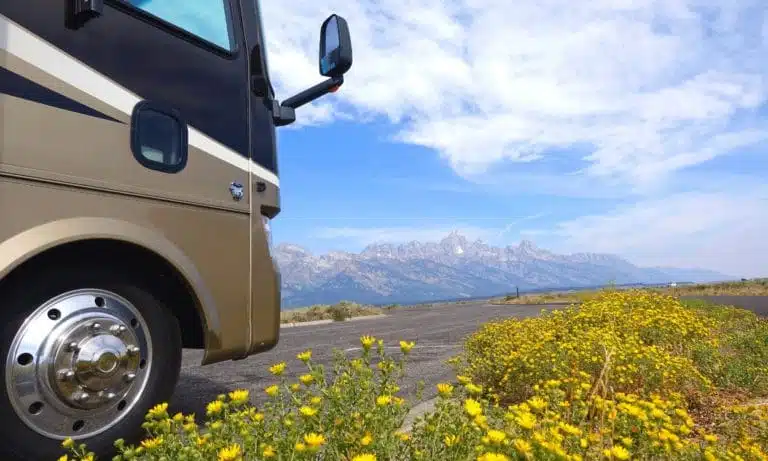
Are RV Extended Warranties worth it? If there is one thing more stressful than having something break on your RV, it’s worrying about how much the repair is going to cost you! Especially if you don’t have a stash of cash sitting around and waiting for your RV rainy day. Breakdowns, mechanical failures, and appliances that quit working are all part of the RV “adventure.”
We have certainly had our fair share of ‘adventures’ regarding RV repairs and breakdowns! Both with and without an RV extended warranty. We cover these in our in-depth expense report on the real cost of RV ownership after six years of full-time RVing and two motorhomes. And also our Full-time versus Part-time RV Ownership comparison report .
RV repairs can get expensive, stressful, and take some of the fun out of your RV lifestyle. That’s where an RV Extended Warranty may be worth considering – as a way of protecting you against these kinds of unknowns and hefty repair bills. But they aren’t exactly cheap. This brings us to the million-dollar question. Are they worth it?
The short answer is YES. But to learn more about why we think this, based on personal experience, please continue reading and jump to a section below in the table of contents.
Quick links to sections of this article:
- What is an RV Extended Warranty?
- What risks are involved traveling with or without an RV extended warranty?
- Our personal experience
- How to choose an RV Extended Warranty
- The RV Extended Warranty we recommend
- Get an obligation free quote on an RV extended warranty
- APRIL SPECIAL OFFER: Get a free 1 year Roadside Assistance Membership
RV Extended Warranty, RV Warranty, RV Extended Service Contract, and RV Extended Service Plan. These are all names for the same thing. We’ll mainly use the term most commonly used – RV Extended Warranty – throughout this article.
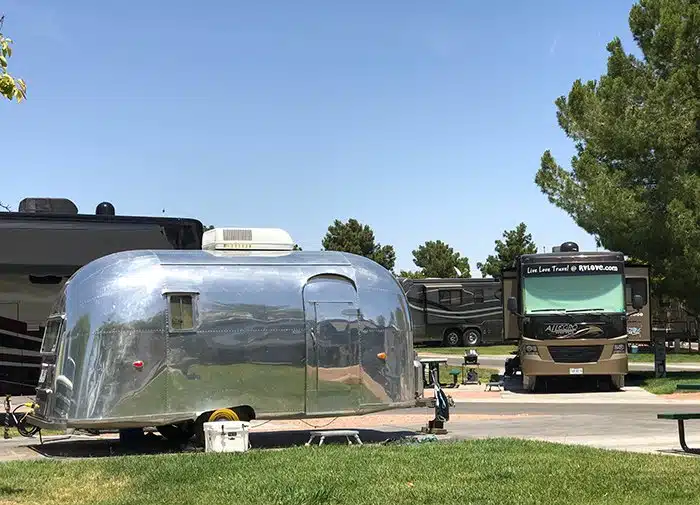
What does an RV Extended Warranty cover?
An RV Extended Warranty is designed to cover mechanical and electrical breakdowns and repairs on your RV. Things like the repair costs of slide-outs, furnaces, air conditioners, water heaters, appliances, engines, etc.
An exclusionary policy will cover everything (non-maintenance) related that is not specifically listed on your policy as not being included. An Inclusionary (or Listed Components) policy will only cover what is specified in the contract.
Buying the right TYPE of RV warranty is very important. Many of the complaints and bad reports you may read about RV warranties most likely come from people who did not understand their policy or bought the wrong kind of coverage.
Exclusionary vs. Inclusionary RV Warranties
An EXCLUSIONARY policy is the best type of RV warranty. It offers the highest level of coverage you can get on your RV . It covers EVERY mechanical component on your RV, except for what is specifically listed under your policy’s “What is Not Covered” or “Exclusions” section. An Exclusionary RV warranty is the most comprehensive coverage available for your RV.
An Inclusionary Policy is also known as a “Listed Component” RV warranty. They offer lower (limited) coverage. These policies will list exactly which items ARE covered under the contract. If the item that fails is NOT on this list, it won’t be covered. That’s why it is considered a lower level of coverage than the “exclusionary” policy mentioned above. And are therefore less expensive.
Wherever possible, you want to get an Exclusionary RV Extended Warranty.
What does an RV Warranty NOT cover?
An RV warranty is NOT an insurance policy in that it excludes all collision-related and physical damages to your RV. It does not cover regular RV servicing and maintenance. So you will still have to cover the cost of oil changes, tires, rotations, etc.
RV warranties also exclude damage to your windows, flooring, furniture, upholstery, and awning materials. It definitely pays to take good care of your RV, service it according to your manufacturer’s recommendations, and also keep a log of all maintenance.
As always, read the contract and the terms and conditions of coverage carefully before signing! Know what you are – and are not – getting! And make sure you understand the process for filing a claim in case of a breakdown.
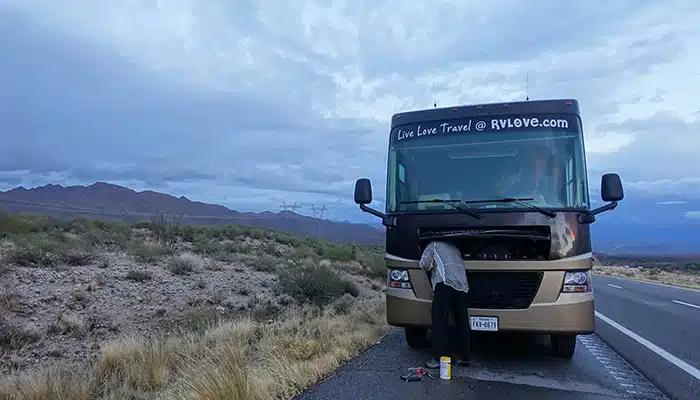
Is It Risky to Travel Without an RV Warranty? How much are repairs?
It is an rv. what could possibly go wrong.
An RV – no matter the type, brand, or price point – is a moving vehicle with countless moving parts traveling down the road like a rolling earthquake. Things will shake, rattle, and roll. Eventually, something is going to break. Possibly many things over time, and sometimes many things all at once!
No two RVs are the same. They won’t necessarily have the same issues, even if they are the same make, model, and year! Many variables play a part in an RV’s reliability. How you take care of the RV and how well it was built. How you drive it, and how much you use it.
The road and weather conditions it is exposed to. And honestly… luck plays a part too! Sometimes you can do everything right, and something STILL goes wrong. Go figure. Welcome to RVing 🙂
But you CAN minimize the likelihood of things going wrong. And minimize the financial impact if it does by taking good care of your RV and being protected by an RV extended warranty.
What are the odds your RV will need major repairs?
According to RV warranty claims records, at least three out of ten RVs will require a major repair in their second year on the road. By the 5th year, that leaps up to eight out of ten. And within eight years, virtually ALL RVs will need a major repair.
These days, with the increasing complexity, new technologies, and more appliances being added to RVs, we would not be surprised if those numbers are much higher in the years to come. Again, we feel the overall lower quality of recreational vehicles built in recent years may also increase the likelihood of that.
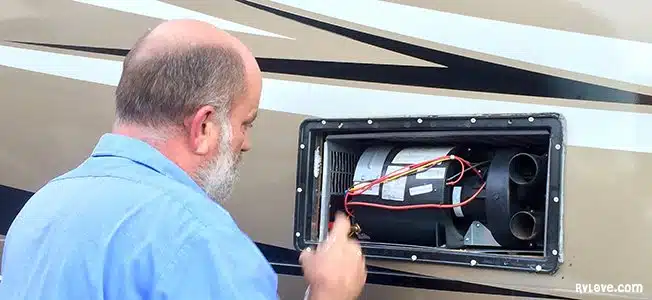
What do RV repairs cost?
Of course, that depends on the nature and complexity of the repair needed. Motorhomes – especially bigger Class A’s and Super C’s – tend to be more complex and expensive than smaller Class B’s, Class C’s, travel trailers, and fifth wheels.
RVs are becoming increasingly complicated with more technology, electrical, and mechanical systems. This means more things can also go wrong! We have seen RV repair facility hourly labor rates range between $85 and $150 an hour. The average tends to be around $120 – $130 an hour. But these can also creep up to $200 an hour on more expensive rigs.
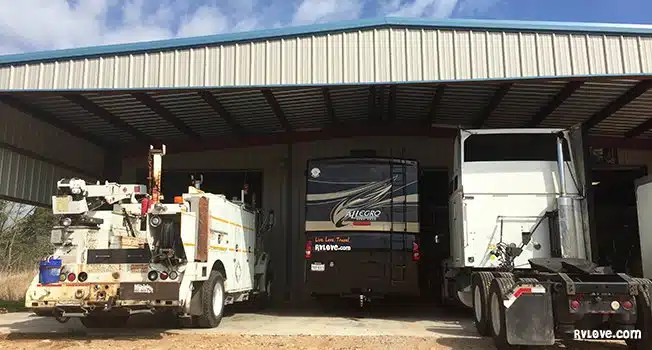
What are the most common RV repairs?
According to Wholesale Warranties , the top five repairs for both motorhomes and towable RVs are air conditioners, slide-outs, leveling jacks, generators, and inverters.
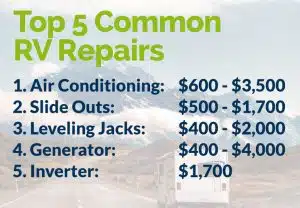
Of course, there are many more things that can fail and need repair. We have personally experienced a failure of ALL five items listed above. Not all in one RV, but spread out among our RVs. And quite a few other repairs as well.
Let’s talk a bit about some of the RV repairs we have made over the years. And what was covered (or would have been covered) by an RV extended warranty.
A few important notes
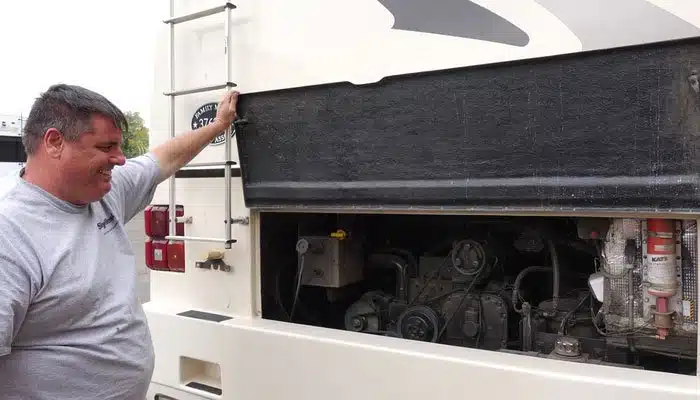
Almost anything can go wrong. And it will.

Our Experience Traveling with RV Extended Warranties
Our first rv’s extended warranty, a bit more history on our first rv.
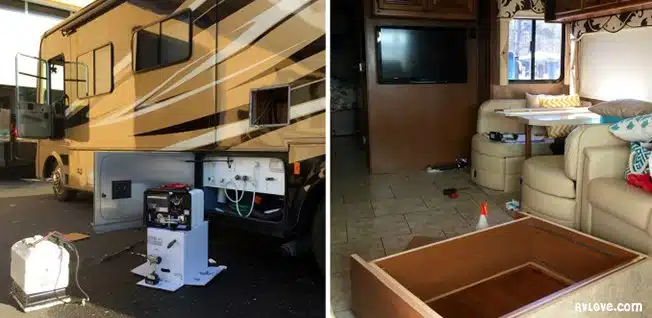
What was covered by our RV extended warranty?
It’s worth noting that we owned the coach for 46 months out of the entire 60-month policy. Here’s a summary of what we had fixed during that time.
- 2014: The furnace and hose in the front area of the coach. Faulty ceiling light wiring.
- In 2015: Water heater. Driver-side electric window switch.
- 2016: New leveling jack springs. Track bar bolt and nut (suspension). Wheel Alignment. King Pins. Hotel accommodation and meals (twice)
- 2017: Jacks Controller for Leveling Jacks. Driver-side electric window switch. Fresh Tank Water Valve.
Our RV extended warranty covered parts and labor. Each time we took the RV in for a repair visit, we paid a $500 deductible. That is per visit (not per item), plus tax, freight for parts, shop supplies, and other items.
How much did it cost for our warranty?
- The total of these RV Repair bills and ‘out of crib’ expenses came in at around $8,683
- We paid $2,696 in deductibles, tax, freight for parts, shop supplies etc
- Our RV extended warranty covered $5,987
Policy cost and prior claims
The previous owner owned the coach and policy for 14 months. During that time (from his recollection), he claimed a faulty roof heat pump, which was covered by the policy.
He recalls paying around $4,000 for the five-year exclusionary policy at the time of purchase from an RV dealer. It had the highest available deductible, $500 per visit.
Details on our other RVs with / without warranties below.

Our Experience Without An RV Extended Warranty
Ultimately, it’s all about risk management.
While RV shopping for our second RV, we mostly looked at RVs in the 3-10-year-old range. We did get some quotes from Wholesale Warranties on a few RVs that we got serious about. This helped us plan and budget for the overall cost of a potential purchase. But at the end of the day, we decided to roll the dice and bought our cheap, older motorhome.
This means we paid for our own repairs and labor. So essentially, we were now self-insured. How did that work out for us? Let’s take a look.

Repairs we made on our second RV
We published this article on the real cost of RVing after six years of full timing. In that post, we detail the RV repairs to our Country Coach from March 2018 – June 2020. In a nutshell, we spent $23,268 in repairs and maintenance on our 1999 Country Coach motorhome.
Almost a third of that related to a single major repair – replacing the diesel fuel pump. We did not have an RV extended warranty. So we had to pay for this out of pocket (around $8K).
Our Next Two RVs RV Warranty Experiences
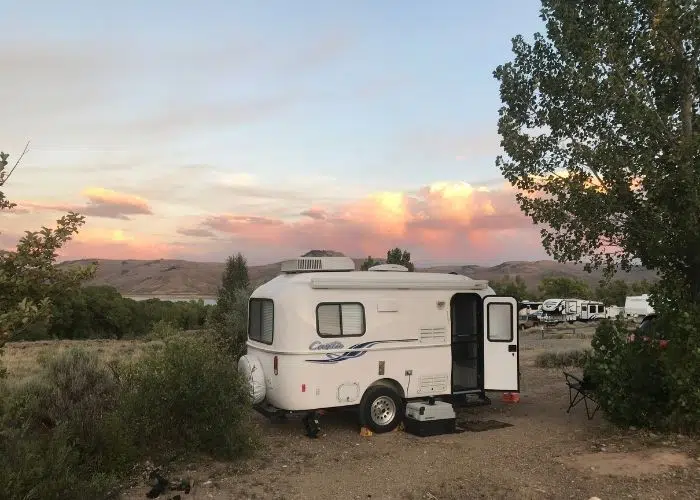
2019 Casita Camper RV Warranty
Our Casita camper trailer was a much simpler RV than our previous two motorhomes. After our previous experiences, we definitely wanted an RV extended warranty. Since it was such a simple RV, the warranty was inexpensive compared to motorhome warranties.
It was only a bit over $2,000 for a six-year warranty. After getting hit with a nearly $10,000 repair on our Country Coach earlier in the year, we wanted the peace of mind of knowing that if something goes wrong, the cost will be capped.
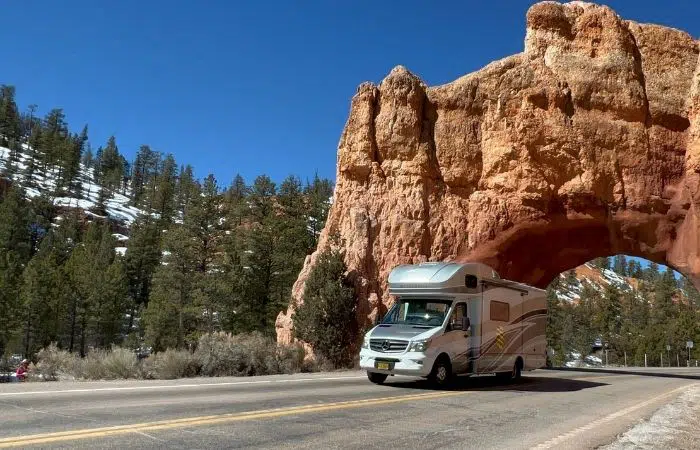
2017 Winnebago Navion RV Warranty
I f you have been following our blog, you will know that we did an RV trip to Florida in an RV that we rented from a friend. Well, at the end of that trip, the original owner decided he was going to sell the RV, so we decided to buy it .
Repairs the original owner has had to do in the first few years included:
- There was a major water issue in the overhead cab. This was due in part to improperly sealed clearance lights. The repair was estimated to cost $15,000. This was discovered just before the factory warranty expired and was therefore covered by the original manufacturer. But the RV extended warranty company guaranteed that they would cover it if the manufacturer didn’t.
- 2020: $855.71 Bathroom door latch, replace max air fan, and replace propane regulator.
- So, the various warranties covered over double the cost of the RV extended warranty. And we still have more than a year left on the warranty.
Repairs while we have owned it
In the first few months, we used the RV extended warranty for two additional claims. The first claim was to repair the Cummins diesel generator. That was a $906.15 repair. The warranty reimbursed us $746.32 of that.
We also needed to repair tie rods for $588, which is listed as a covered item. But we forgot to tell our repair shop we had an extended warranty! We didn’t get advance authorization, so we did not receive reimbursement for that item.
There were quite a few other repairs that needed to be done in the first year. But most were maintenance issues or other small repairs that were either ineligible for RV extended warranty coverage or small enough that it was just easier to do ourselves than to take it into a shop.
In early 2023, we also needed to replace the overhead light console in the cab. This cost $862. Unfortunately, it was not covered by the warranty because it was caused by water intrusion (which we have since fixed ourselves).
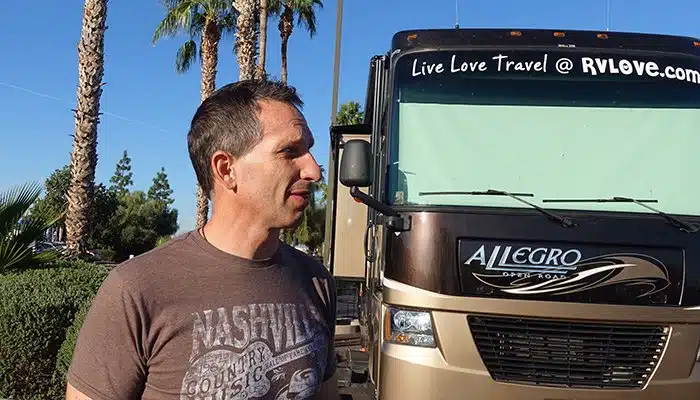
Should You Consider an RV Extended Warranty?
Do you need an extended warranty on a new rv.
Technically, if you have a brand new RV, then you don’t need an RV extended warranty… YET. Most of your repairs should be covered by your RV manufacturer’s factory warranty. These usually last for one year, and some may last 2-3 years.
Additional considerations
Also, when new, a model doesn’t yet have a history of repairs. Some RV models may develop a higher-than-average reputation for repairs. Those models will then end up with higher-priced policies as the years go on since they are now known to be more troublesome. Buying the policy when the RV is new shields you from the risk of a higher-priced policy while, of course, also paying for the repairs in the meantime.
If you plan on owning your RV for more than a year, it’s probably a good idea to buy the RV extended warranty at the time of buying your RV. This gets you the best price possible. Some companies offer a payment plan if you aren’t in a position to pay for it upfront.
But try to avoid rolling it into your RV financing! If you roll it into financing, you could pay much more for it in the long run due to the interest charges.
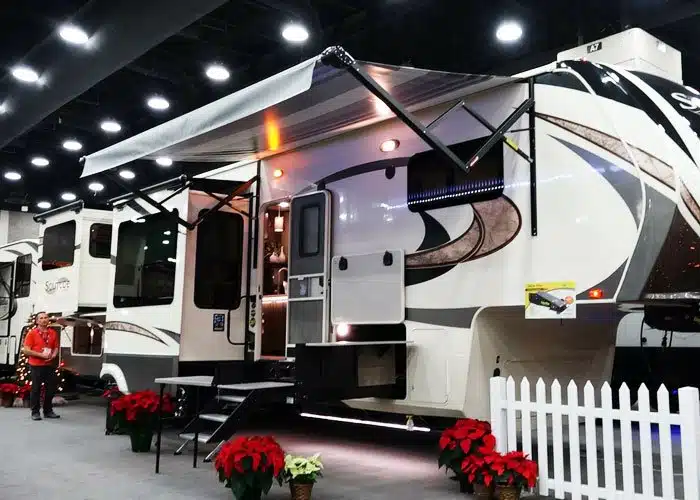
Considering an RV Warranty for a Used RV?
Should you buy an rv warranty from the dealer.
Probably NOT. Why? Well, there are multiple ways an RV dealer will try to make money from you when you are buying your RV. The RV itself, financing, non-essentials (e.g., paint protection), and an RV extended warranty, to name a few.
The dealer almost always marks up the RV’s extended warranty. This means you will likely pay more than if you bought a policy directly . AND the dealer will also try to convince you to roll the warranty into the financing.
Typically RV loans can be 10, 15, or even 20 years. And you’ll be paying interest on that. So you will pay WAY more than you should for the RV extended warranty there too. That means they get you on two counts – a marked-up policy AND financing costs.
It definitely pays to do your homework and get a quote in advance. At least then, you will be informed and know what to compare their policy and price to. So you can determine if it’s a good deal or not. Of course, you also want to compare “apples with apples” when looking at what you get. That’s price, coverage, terms, company reputation, and after-sales support when it comes time to make a claim.
Knowledge is power
It can be stressful and overwhelming enough to buy an RV. Being pressured into buying an RV warranty on the spot when it is time to close the deal – especially when you don’t know enough about them – can be an expensive mistake.
That is why we strongly recommend buying an RV extended warranty from an unbiased, reputable, independent provider. And getting a quote before buying your RV, so you can budget accordingly. Be prepared!
Buying your RV extended warranty directly from a company that deals directly with the end consumer – and when the RV is new – is always the most cost-effective way to purchase a policy.
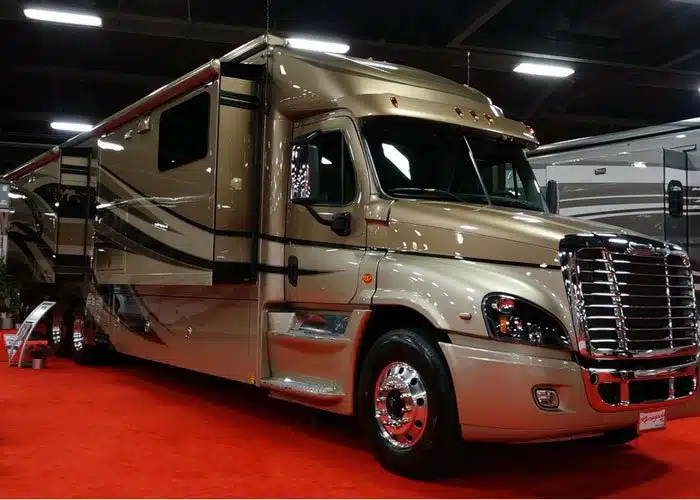
Should you ‘self-insure’ instead?
But the gamble goes both ways. If you have a reliable RV and don’t experience any major or expensive issues, you could break even or come out financially ahead. But you won’t have the peace of mind that an RV extended warranty may bring. Only you can put a price on what that is worth to you.
Extra potential risk
One potential risk we see with self-insuring can occur if you are not disciplined – or don’t have the financial means – to take care of large and important repairs when they arise.
There may be a temptation to “put off” RV repairs because you don’t have (or want) to spend the money. Having an RV extended warranty may motivate you to make RV repairs promptly, knowing your policy covers it. This reduces the risk of a smaller issue becoming a bigger and more expensive one down the track.
We ‘self-insured’ our second RV. You can see what those repairs (among other expenses) cost us in this in-depth expense report.

What does an RV Extended Warranty cost?
Every RV extended warranty is different. The type of RV, mileage, year, purchase price/ value, engine type, make, and model all help determine the cost of an RV Warranty policy. It also depends on what type of coverage you want, or qualify for, at the time.
Typically, RV extended warranties are less expensive on towable RVs like truck campers, travel trailers, and fifth wheels. This is because there is no drivetrain as found in motorized RVs (Class A, Class B, and Class C).
The price will also vary depending on the deductible. You get to choose what level of deductible you’re most comfortable with. And, much like your insurance policy, a less expensive RV extended warranty policy will mean you pay a higher deductible. Choosing a lower deductible will mean a more expensive policy. We have seen deductibles range anywhere from $50 – $500 per repair visit (not per item).
Something to keep in mind. If you sell the RV before the contract expires, you can cancel the contract and get a pro-rated refund based on the unused time or mileage remaining on your RV Warranty term.
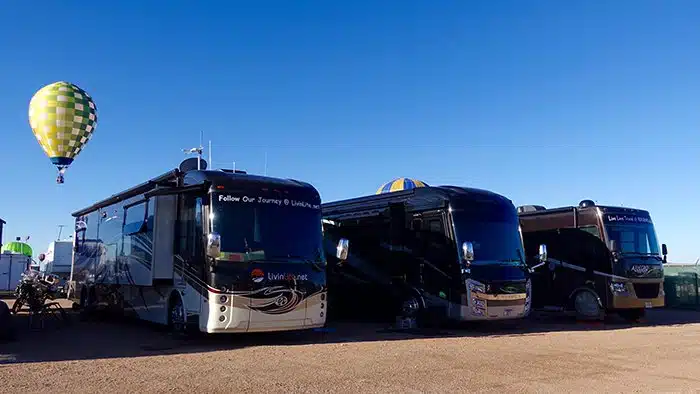
When is the best time to buy an RV Warranty?
Related Articles:
When is the Best Time to Buy an RV Warranty? How to Beat Price Rises?
The Real Cost of RV Ownership: Repairs, Maintenance, Depreciation, Finance, etc
Cost of RVing: Full Time vs Part Time
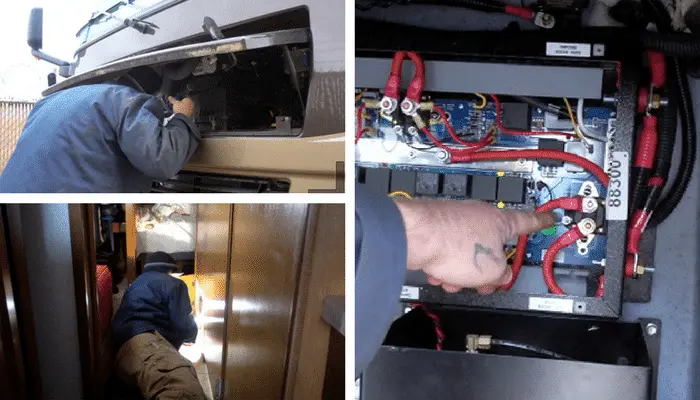
Pros of an RV Extended Warranty
- Allows you to manage financial risk with increased control of your RV-related expenses.
- An RV warranty company (administrator) will ensure RV service centers are not overcharging for repairs.
- You can include the warranty when selling the RV privately. This is an advantage for the buyer while making it easier for you to sell.
- A good policy will give you peace of mind, knowing you’re covered for major RV repairs.
- The policy may also include roadside assistance and towing benefits.
Cons of an RV Extended Warranty
- Usually, a sizable investment. And you may not get the full value out if your RV doesn’t need any major repairs.
- It may be cost-prohibitive. Or your RV may be ineligible if older (16–20+ years), or that have high mileage.
What to look for in an RV Warranty Company
There are many things you should look for when selecting an RV Extended Warranty company. Focusing on price alone is very short-sighted. You will want to consider these important points:
1. Confidence in a reputable company with a proven history?
You may have heard horror stories of people being left high and dry by companies that went out of business, rendering their RV extended warranty useless. Be sure to buy your RV extended warranty from a company with policies backed by “A” Rated Insurance Carriers with proven financial stability and staying power.
Avoid any RV Warranty programs offered through “Risk Retention Groups” (RRGs). If you want to read more about those and the risks, click here . But really, avoid them.
2. Knowing where you can get repair work done
Find out your options for using RV repair centers all around North America. You don’t want to be limited to using certain RV shops, networks, or facilities. When traveling around the country, you will want convenience and flexibility in where you get service.
3. Option to transfer or cancel your plan
You should get a transferable plan in the event you sell your RV. It may make your RV more attractive to a buyer. Or you may choose to cancel the policy for a pro-rated refund. Check the refund policy and find out if there is a ‘probation period.’ Admin fees may apply.

RV Extended Warranty Companies / Policies
Xtra ride (through protective asset protection).
- Our first RV extended warranty (that we inherited with our Tiffin) was an Xtra Ride policy through Protective Asset Protection . While they were mostly good to deal with regarding having our claims paid, they have also changed some of their business practices in recent years.
- They do not deal directly with the public. And you can only buy a policy through an RV dealership at the time of an RV purchase. So, you cannot buy a policy a month or a year or two after your RV purchase.
- You also cannot buy a policy from them on a pre-owned RV that you purchase from a private party. And, because you can only buy the policy through a dealer, it also means the price is more likely to be marked up. Therefore, it is more expensive.
- It may not be as easy to get an advance quote from Xtra Ride or the dealer before purchasing your RV, which makes it difficult to compare prices or accurately budget for your total purchase costs.

Good Sam Extended Service Plan (through Good Sam)
- Camping World Holdings own Good Sam. While we have not had an RV extended warranty – known as an extended service plan (XSP) – through them, we did have Good Sam Roadside Assistance – for just one year. We changed to another provider after a few poor experiences with Godd Sam.
- Based on our research of Good Sam extended service plan policies, we found reviews at both ends of the spectrum. Some good. Some bad. We have been alerted to some recent concerning news stories about Camping World’s financial stability. We do not know firsthand the current financial state of Camping World, nor do we wish to speculate. But as with all big purchases, we encourage you to do your homework before signing any contracts. And stay aware of potential risks.
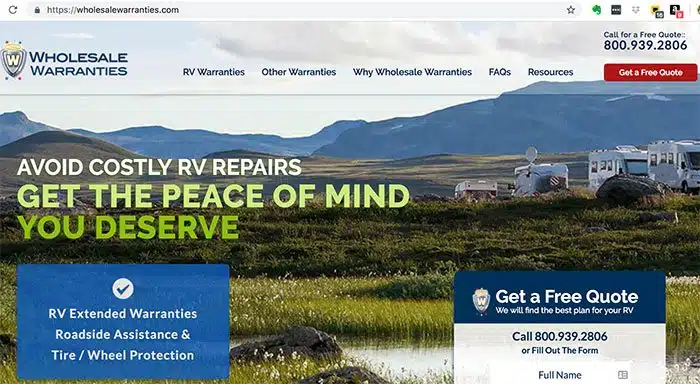
Wholesale Warranties (Viking Protection Plan)
- Wholesale Warranties is an independent brokerage company that deals directly with the consumer. They can offer RV extended warranties at “wholesale” prices, as they are not marked up by a dealer. Wholesale Warranties have access to several warranty providers. So they are not biased toward just one. They will recommend the RV Warranty program that best suits your specific needs.
- The Wholesale Warranties Viking Protection Plan is their exclusive, white-label plan. It also covers consequential damage or commercial use, including renting out the RV. We like that Wholesale Warranties strongly focuses on customer service and education. And they provide guaranteed coverage, positive customer service, and competitive, fair pricing.
- Their team is the middle person between you and the RV Warranty company. This makes it easier to navigate the claims process and act on your behalf as needed. Wholesale Warranties also offers contracts to Canadian customers. In our research, we found they have an A+ rating on BBB and a 5-star rating on CustomerLobby.
- We have obtained several quotes from them while RV shopping and always found them to be extremely competitive, knowledgeable, and helpful. Our most recent RV extended service contract through Wholesale Warranties was in 2020 for our 2019 Casita camper .

So Who Do We Recommend?
It is for all of these reasons that we personally recommend Wholesale Warranties . We have consistently found them to offer the best service, the most competitive prices, and the best options for customers – while getting consistently high ratings.
Over the years, several of our RVing friends, the RVLove community, and students of our RV Success School have purchased an RV extended warranty through Wholesale Warranties. We have received many positive reports and feedback about Wholesale Warranties so far. You can also Google some of their 100+ reviews, with an average rating of 4.9 out of 5.
We contacted Wholesale Warranties to get quotes during our RV shopping process in 2018 when preparing to switch our motorhome. And they are who we choose to buy a policy from for the Casita RV purchase. Our 2017 Winnebago Navion had an RV warranty which was transferred to us by the original owner.
We have a warranty from Wholesale Warranties on our current fifth-wheel trailer.
You can click here or call 800-939-2806 to get an obligation-free quote .
In summary, we recommend you get at least two quote comparisons. Crunch the numbers. Consider your own risk tolerance, and weigh up whether or not an RV extended warranty is worth it for you.
Well, we hope this article has been helpful. We would love to hear your experiences, questions, and comments below.
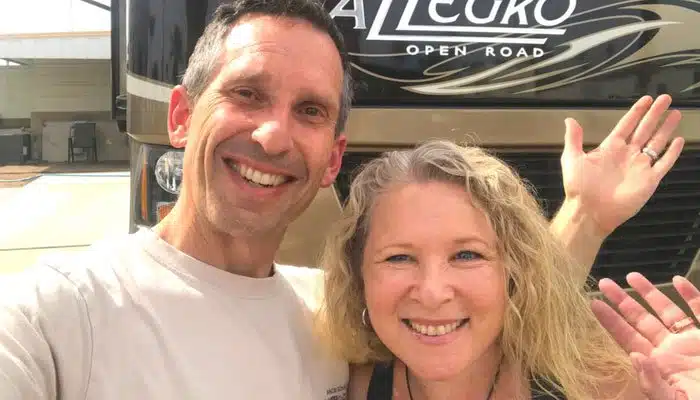
Quick links back up to sections of this article:
Related content.
Want to read or watch more related content to RV repairs, warranties and the cost of RVing? Hover over the images below to see the title and click to read it.
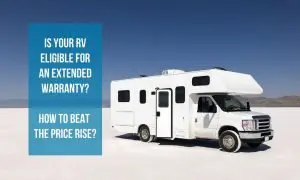
When to Buy an RV Warranty For Best Value
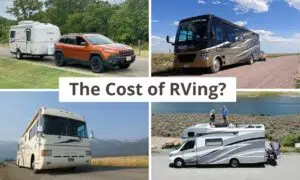
Cost of RVing – Full Time vs Part Time?
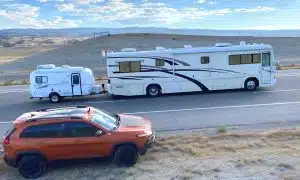
We Bought Another RV. What Did We Get and Why?
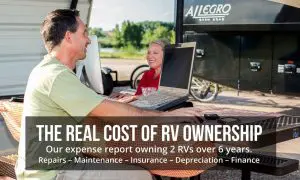
The Real Cost of RV Ownership. Here’s What We Spent.

New RV Awning Replacement Fabric and Slide Topper

11 More RV Repairs, Mods and Upgrades To Our Motorhome

Getting a Professional RV Inspection Before Buying

Lessons Learned from 14 RV Factory Tours in the RV Capital of the World
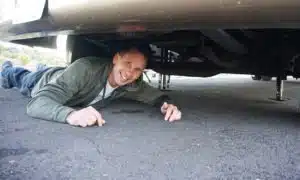
RV Breakdowns: Q&A + 10 Tips for How to Deal with Them
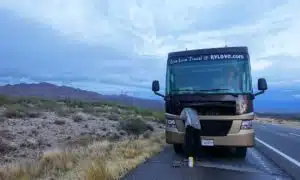
Part 2: 3 RV Breakdowns in a Month
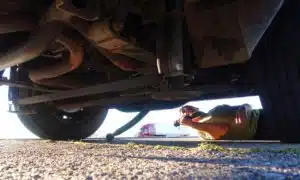
Part 1: 3 RV Breakdowns in a Month
Got comments or questions.
We would love to hear from you. Drop us a note in the comments section below.
90 thoughts on “RV Extended Warranties. Are They Worth it? 2024 Update”
I have had Good Sam for two years. The issue is they nit pick to avoid paying for items. I and the service rep have spent hours dealing with them. An example is they only cover electrical components. If the item is inside a sealed component they won’t cover the item and outright denied the repair.
It’s just to difficult to deal with them and I am going to cancel. People don’t want to accept the coverage for this very reason.
Hi Charlie, Sorry to hear your experience with Good (‘bad’) Sam insurnace. I have heard that about a few carriers, and many times about good sam. That is part of why we like Wholesale Warranties, because they can help negotiate on your behalf. -M
Thank you. We love to hear that our content is helpful to others. Glad to help.
Get answers about 1. Review limits, at what amount of repair cost does the claim go to someone else to review coverage. 2. Tie back is this agreement restricted by distance. ALOT of them do have up to a 100 MILE tie back to selling dealer or sister store locations. 3. If it is a exlusionary (or sometimes called Comprehensive) what does it NOT cover? 4. IF you buy a lower level option and get a stated level agreement, what would happen if something broke and you needed to upgrade to a higher level plan? 5. Is there EVER a chance of goodwill on a non covered part
I could go on for days, but then I would confuse you and just do information overload
Thanks for your input. Agreed, those are good specific detailed questions to get answers on when shopping warranties. -M
Has anybody had experience good or bad dealing with americas rv warranty, will .ook into wholesale warranties also,arw is connected with fortegra in. Co. And seems to cut one of middleman out,thanks
Sorry we have no experience with America’s RV Warranty to share. We always recommend getting at least 2 quotes and compare apples with apples! We like that Wholesale Warranties is a broker that represents several policies and can recommend the best one for you, cutting out the middle man as you say (and markup). Good luck!
I bought a warranty and GAP from RV Country with the idea I could cancel it with a full refund in 45 days. I found the same coverage online for $1400 less than what I paid at RV Country. Preserve was the extended warranty company.
I canceled it and it’s 100 days and no refund. I’m out over $5,000 and no one will account for where the money is or when I can get it.
I’ve also waited 100 days for any parts to come in to fix my new toy hauler. Forest River makes a heck of a yard ornament.
Wow that sounds like a rough situation! We aren’t familiar with that warranty or company – but RV extended warranty companies are notoriously SLOW in processing things. I would keep on them – in writing so you have a ‘trail’ whether that is by email or registered mail. Email easier. You should have a copy of your contract specifying cancellation policy – attach a copy of that, along with your cancellation (hopefully you provided this in writing) and send to the warranty company / RV dealer – to the TOP. If you still get no joy, submit a claim to your credit card company (if that’s how you paid for it) with all of your written evidence. And yes, the last couple of years have been challenging getting parts with the supply chain issues – So frustrating! Really hope it all works out for you soon. Good luck!
Boy do I wish I read this article before we bought our Extended Warranty from the dealer BYoung RV now LazyDays! Total ripoff! DO NOT BUY AN EXTENDED WARRANTY THRU ASSURANT!! We drove around the country for 4 months without a working refrigerator due to service appointments behind so backed up. ASSURANT will only pay for repairs that are pre authorized at a authorized repair facility. Repair facilities will not make an appointment just to obtain a pre- authorization. I have wasted at least 20 hours and now $10,000 on this scam trying to get any of our claim covered
Oh dear – so sorry to hear of your experience! That sounds frustrating. Had not heard of Assurant but will keep this in mind. Hope you get it resolved soon!
I am an RV mobile service tech business. I have to say there are warranty services that are horrible to deal with. My policy is NO to a warranty that is not above a certain dollar amount. Why? It takes minimum 1 hr of phone time working with your warranty company. Often I am on the phone for 2 hours or more. I don’t get paid for that. Your $200 deductible on a $500 job with $300 in parts is not worth the extra time it takes dealing with them. One warranty company, just today, tried to get me to box up a failed 2007 inverter and send it to their repair facility. (what business are they in? Maybe they should BE an RV repair facility???) And they want me/you to pay for boxing & shipping it both ways. The Agent insisted the inverter was “field repairable” even though I would have to drill out 18 rivets just to get the cover off to attempt to repair an inverter that was end of life according to the manufacturer. Often these extended warranty companies want to dictate how long a repair should take by the book not taking into account the way the coach was built/ what else must be done to affect the repair. These costs I have to pass onto you. And you say to me: “But I have a $200 deductible!”. I am a mobile business with no shop. I am a 1 person operation. 3 warranties a week would kill my effectiveness. Few extended warranty company lets me hand you a bill, you pay me and they reimburse you. I must call them and over the phone itemize, haggle and negotiate your warranty. NOT WORTH IT! Some warranty companies are great to work with. The difference between a Bronze and a Gold plan can change everything! If your warranty costs $9,000, personally I recommend keeping that in the bank ang forgoing extended warranty. I am the guy on the other side, this is my perspective. But I have seen disappointed faces too many times! II doubt they will publish my comment, if they do, take note. I have my own rating system for extended warranty companies. Some I will never do business with again! So when you bring out your policy and see a sour look on my face… try to see it from my point of view. I do not have time to list all of the problems I have had with extended warranty companies. And I fear their lawyers so I won’t list names. Do your homework. They salesman makes kickbacks selling you. And the first thing to know about buying and RV?: The biggest lie is “We checked out EVERYTHING!”.
Hi Chad, thanks for sharing your experience from the perspective as a mobile tech! There are definitely some warranty companies and policies that are better than others for sure. And understand why you don’t want to share names. Also agree the better (often ore expensive policies) may be the best way to go… and it all depends on the rig. We have owned a couple of Class A motorhomes and those repairs can get expensive, especially on the diesels. For some, it may make sense to self insure and just pay out of pocket, but like anything, it’s all about risk tolerance. Personally, we find RV breakdowns stressful enough as it is, wondering what is the issue, and how long will it take to fix it… without having to ALSO stress about what it might cost! Our exclusionary policy turned out to be worthwhile on our first coach… our 2nd motorhome had too many miles to qualify for a policy, but if it had, we would have definitely come out ahead. We only ever once called a mobile repair tech – on our first coach. We never called/used on our second coach. But the good thing for you is, there is plenty of business out there right now, so we hope you’re able to get by and thrive, with non-warranty work, as it sounds like it might be too much hassle for you with certain jobs. As you said “Do your homework” is the best advice you can give any RV buyer.. take your time and explore all your options, budget for everything… and make the choice that is right for you. All the best!
Would love to know the names of the reputable warranty companies you have worked with.
Wow thanks for sharing!
Very helpful article. We’re in the process of purchasing a used Class C RV. Unfortunately, I was disappointed to learn that Wholesale Warranties will not cover used RVs that are rented. They will only provide coverage on rental RVs that are new and you must add the coverage at the time of purchase.
Do you have any recommendations of companies that will provide extended service contracts for Used RVs that are rented? Thanks!
We didn’t know that! So if you own a used RV and want to rent it out, it’s not covered? Good to know this. Sorry we don’t know of any other companies that can help with providing extended warranty coverage on used, rented RVs… but will keep our eyes and ears open!
Thanks for the note with the update! Will make those changes to the blog post. Look forward to another trip down to the Keys sometime in the future! Cheers
Greet article. I was only reading it because I am having issues with a good sams extended warranty. We paid $3000 for the warranty and it has been a night mare. They always have an out. Do not waste your money on it.
Yes, sadly, we have heard too many similar stories, hence we don’t recommend GS… it. may be worth looking into your options canceling and getting a partial refund and getting a better policy from Wholesale Warranties which will likely also be cheaper – just make your you are comparing apples with apples! (eg. if say an exclusionary policy)
This is a very comprehensive article that was well researched. I would like to know which company you (or the audience) would recommend to cover a 2008-2011 Newmar with e-plex.
Hi Michael – glad you found the article helpful! We recommend getting a warranty quote from Wholesale Warranties – https://rvlove.com/warrantyquote – they can cover a motorhome in that era you mentioned.
We have always purchased extended warranties on our cars, and have had very good luck with the few claims that we have made. So when we bought our 2017 Class C with 17000 miles on it, we thought it prudent to purchase one. We bought the Good Sam extended warranty as well as the Good Sam vehicle insurance. WHAT A MISTAKE!!! I would not give this company another penny. We had heard that Goos Sam had changed and now denies every claim and that has been our experience. We had an issue with our water system after several months and several more thousand miles of operation so called Good Sam and took our RV to a repair shop that they recommended. The shop performed the repairs and let us know that there was some breakage that should be covered. Sure enough Good Sam has denied all claims as “pre-existing conditions”. Pre-existing? After 4 years and over 20000 miles? BUYER BEWARE! This company is not honoring its obligations with us, and per our mechanic, many others. We are appealing and have asked Camping World for assistance. I am also trying to find out if our state’s insurance commission licenses extended warranties, since this type of “bait and switch” should not be tolerated. If anyone has information as to how to action a bad faith extended warranty denial, it would be much appreciated. Until then we are simply sharing our experience. Thanks for this forum.
Hi there Nancy – we are so sorry to hear of your experience with Good Sam! Honestly, we have heard both good and bad reports on the Good Sam policies – we have never owned one from GS ourselves, and would not buy one. So thank you for sharing your experience, for the benefit of others who are reading this post and the comments. This is also the reason we recommend Wholesale Warranties, as we are confident in the service they offer. You might want to reach out to Alan Warren of the RV Show USA – I know he has covered some of this topic on his show, and warned folks to cancel and cash in their policies. He may have some suggestions for you on who to contact to help with your situation. I am assuming when you purchased the policy, they did not insist on an RV inspection so any “pre-existing conditions” could be noted on the policy? We just got an inspection done on our warranty for our Casita, for the Wholesale Warranties policy, the inspector was VERY thorough, and it came out with a clean bill of RV health. Phew! Anyway, hope those suggestions help. All the best!
Wow, this article had loads of information, suggestions, and tips. Thanks for the time and effort you put in to post the extensive article. I’m not yet an RV motorhome owner (first time) but if things work out for me I plan on a purchase of a 2 – 3 year old Motorhome. I appreciate your story and tips. I’m 78 years old and still pretty active and fairly mechanically minded so I can repair and fix many things but not sure about motorhome things. I’m not wealthy but believe I can pay cash for the motorhome (several in mind) I have spotted, and still, have enough savings to cover modest park fees, insurance, etc. But had not considered extended warranties to cover major repairs and roadside assistance fees. This is starting to scare me a little as I’m by myself and not rich so I may have to rethink my life going forward. I don’t plan to be on the road a lot but several trips a year. I do want to know what most motorhome parks (not fancy) charge for 50 amp full hookups for a 37ft motorhome.
Hi Jimmy, so glad you found the article helpful! Yes, it can be a lot to wrap your head around. That is definitely great you are a handy guy and can DIY a lot of RV fixes yourself. It will save you a lot of money and hassle when it comes to RV repairs. Now to your question… extended warranties are a personal decision and everyone has to weigh up what’s right for them in terms of budget, risk tolerance etc, but you definitely want to ensure you have some kind of slush fund for RV repairs if you don’t take out a warranty… there is no one RV brand that is trouble free, and motorhomes have a lot more complexity than trailers. It would be really helpful for you to read our recent article on the Real Cost of Ownership – based on us owning 2 motorhomes – a newer Class A gas and an older Class A diesel – over the past 6 years. Ohttps://rvlove.com/2020/10/21/the-real-cost-of-rv-ownership-after-6-years-and-2-rvs-heres-what-we-spent-on-rv-repairs-maintenance-and-depreciation
Of course, every RV / person / situation is different… but personally we don’t like expensive RV repair surprises as those are rarely budgeted for! We had to replace the diesel fuel pump in our coach earlier in 2020, and nearly fell over when we learned the repair would cost $8,500! We had no choice but to fix it – ouch! Keep in mind, it was a 20yo motorhome with 250K miles, so that is a huge factor! It’s unlikely that would happen on a newer MH, but there are certainly plenty of things that can still go wrong. A friend who has a 2016 Monaco Diplomat and owned since new (5 years of full timing so far) purchased an extended warranty through Wholesale Warranties just as his one year factory warranty was about to expire and he has already gotten his money’s worth out of it in covered repairs. Example: He had slide wall issues and the manufacturer claimed that was not part of the structure of the RV (!?) and so wouldn’t cover the repair – his extended warranty did, however, saving him quite a few thousand. He still has a year or two to go on his warranty and he’s at break even already, plus he has peace of mind should anything else occur in the future. Another friend owns a 2017 Class C Winnebago with an extended warranty that has also already paid for itself in repairs against the purchase price. We just bought a little Casita trailer a few months ago and while it’s a much simpler, less expensive RV, we still took a warranty out on it as it only worked out to be a few hundred per year, and it was worth it to us not to have to worry if anything more extensive were in need of repair. I guess we just like the peace of mind of warranties. Personally, we would buy an extended warranty if/when we buy another motorhome… experience has shown us how many things can happen! We don’t share this to scare you, but to ensure you are well prepared before making such a big decision. As you know, RVs depreciate, and RV repairs cost money, but the fact you’re in a position to buy a 2-3 yo motorhome and pay cash for it puts you ahead of most. We would recommend – as part of your shopping and research on particular units – do get a quote for an extended warranty on short listed RVs as part of your due diligence / total expected purchase price. It costs nothing to get a quote, but what it will cost to purchase can tell you a LOT about how reliable that particular RV can be and help you budget. Also if you decide to sell the RV in a few years, it can be easier to do so with a warranty, to give the next buyer peace of mind (as was the case when we bought our first RV).
Again, after reading our 6 Real Costs of RV Ownership post we think you will get a much better sense of what to budget for with a motorhome: https://rvlove.com/2020/10/21/the-real-cost-of-rv-ownership-after-6-years-and-2-rvs-heres-what-we-spent-on-rv-repairs-maintenance-and-depreciation/
To answer your question about the cost of motorhome parks for 50A full hookup sites – that will really depend on where you travel, but budget for $40-60 a night on average. You can certainly find less expensive – and more expensive – and camping memberships can help you save on camping fees. Also by staying weekly, or monthly, you will get much better rates – if you travel at a slower pace, it will be less stressful, more relaxing, and also cheaper in fuel and campgrounds! You can often find more reasonably priced campgrounds 5-50 miles away from the most popular places like national parks and major tourist attractions. State parks and county parks are also in the $20-$40 range, and we are seeing more and more upgrade to 50A service. National parks don’t always have hookups and can be hard to get reservations, especially with a 37′ rig, but there are still a few – Crater Lake in Oregon is one example that can accommodate big rigs.
We also wrote these 6 year summary articles on RV camping expenses over the years…which will give you a good idea of camping expenses and ways you can save: What has RV Camping Cost us over 6 Years – https://rvlove.com/2020/09/20/what-has-rv-camping-cost-us-over-6-years-of-full-time-rving Thousand Trails – is it Worth it? – Our Comprehensive Review after 6 Years – https://rvlove.com/2020/08/06/is-thousand-trails-worth-it-our-comprehensive-review-after-6-years-823-nights-of-tt-camping-2020
Hope this helps! Wishing you every success in your plans to hit the road! It really is a great lifestyle and looks like you are doing your homework, which will definitely pay off! Don’t let all this scare you – just be prepared. Life is short and meant to be lived! And there is no better way to explore North American than by RV. It’s a beautiful country with SO much to see and do! So go for it! And et us know if you have more questions on these other articles as well.
Best of LIFE – Julie & Marc
Hi Marc and Julie, We follow your Vlog and read this article and the comments thoroughly. We are upgrading our trailer and buying a brand new one that is much larger. Your article was so helpful and well written. It clarified what we thought we knew but didn’t. I love your content and humor in your articles and videos. Thanks for all the work. We for two… really appreciate it. Jim and Lauri Amandus
Thank you so much for your lovely comment about our content. So glad to hear that you have found them so valuable and informative. Thank you again -M
Fantastic article for a 75 yr. old widow woman who just bought a 2021 Winnebago Micro Minnie. The quotes from the dealership were outrageous. I was going to purchase Good Sam and just pay for the entire 6 years in one shot. Now i am going to contact Wholesale Warranties and get a quote. So does the the company who sells me the warranty coverage – do they pay for repairs? Thanks again.
Hi Pam, WOW good for YOU buying your Winnebago Micro Minnie! We are so excited for you and your new adventures. So glad the article was helpful. And thank you for sharing your experience with the dealer quotes – we have heard reports of some policies being marked up 2-3x! When you get a policy through Wholesale Warranties, yes they should pay for the repairs HOWEVER we have had an experience where we paid for a repair and had it subsequently reimbursed by the warranty company. It may depends on the situation / repair. But DO ask this question of the person you speak to at Wholesale Warranties. Having warranty coverage will give you peace of mind, especially being a solo widow woman traveler without a handy hubby to fix things as you travel. You are very welcome. We wish you all the best for safe and happy travels!
Marc, I have owned five different RV’s and the first thing I do when I buy one is enroll it on Good Sam’s Club Extended Service Plan. You briefly mentioned Good Sam’s plan but did not go into much detail. The extremely important difference between Good Sam’s plan and an Extended Warranty Plan is that Good Sam’s Plan comes is like an insurance policy under jurisdiction of insurance plans in the state of Colorado. With an Extended Warranty plan you are at the mercy of the using company in it being administered . The other dramatic difference is the cost. With an Extended Warranty Plan you have to pay for the total cost, depending on how many years you purchase, at inception, typical thousands of dollars. With Good Sam’s Club Extended Service you only pay at inception a monthly payment based on deductible. Taking the $500 deductible my monthly payment has been less than $100 per month. The policy is transferable and cancelled at any time without any penalty. Another trick I use when first buy my RV is to take the lowest deductible for the first months until have eliminated major problems then later raise deductible to lower payment. Another important feature, which I have used successfully, if they balk on a claim is to complain the the State Insurance Commissioner. Mike Florida
Hi Mike, thanks so much for sharing your experience. No we did not go into detail on the Good Sam policy, as based on our research and knowledge, did not feel comfortable recommending that as an option. Partly due to concerns around the company, as covered in the post. We don’t know about all Extended Warranty companies, but we do know that Wholesale Warranties does offer a monthly payment plan for a period of time, and the policy can be cancelled for a pro-rata refund, should the RV owner decide to sell the RV and no longer need the policy. Also a good tip about filing a complaint with the State Insurance Commissioner if you have any issues with claims. And starting with a lower deductible then dropping it later. As always, we recommend people do their own research and compare apples with apples, when it comes to deciding on RV extended warranties – and whether or not it is right for them. Definitely important to only buy from a reputable company with sound administration and that honors valid claims. We see the decision to buy an Extended Warranty as the price one is willing to pay for peace of mind and limiting financial impact of expensive repairs. And it’s always smart to get a few quotes when shopping around. Thanks again for sharing your experience – wishing you safe travels!
Warranties will not cover maintenance related leaks, so why not give your RV roof enduring protection with RV Roof Magic. RV Roof Magic is a multipurpose roof sealant that not only seals the roof, but also protects it from harsh weather conditions.
Yes it’s important to maintain one’s RV roof – we used Dicor products to do an RV clean and prep https://amzn.to/37vHIkO and then resealed the roof https://amzn.to/3o8TBTz . Good to know you also have products, will take a look. Cheers
Hi! Thanks for the article. We purchased a Portfolio Protection ESP from the dealer only because we were told we can cancel for 100% refund within 60 days – which we will do. We found a comparable, and probably better, plan from Protective Asset Protection for about 40% cheaper. I don’t know if they have changed, but we did not have to get this policy through the dealer – they are selling direct to us. Also, in the interest of transparency, do you receive anything from Wholesale Warranties? I have seen a couple of people inquire, but you never did answer.
Hi Sharon, That is good to know! We did not realize PAP now sells direct – so we will need to look into that. I wonder if it is because you purchased new from a dealer and it falls within that qualification? As you have seen – the dealer marked up the price of the policy substantially! So glad the article was helpful in terms of saving you some money! Yes, we are affiliate partners of Wholesale Warranties – we do not recall seeing any other questions about this that we missed or were unanswered…? Was that here on the blog? We are clear in our disclosure in the first para of the article (as you will see in all of our blog posts) that some links may be affiliates. We never recommend anything that we do not fully believe in. We regularly recommend companies and services that offer NO affiliate commissions whatsoever – that is never the reason we would recommend someone. It is ALWAYS based on the quality of the product and service, and our genuine belief that it would benefit our community, and that we can feel confident in sharing with our audience. And also based on our experience. Our opinions are not – and never have been – for sale. That is why our community trusts our recommendations. That said, we totally understand your reason for asking. Hope that helps!
My experience with extended warranties include Good Sam and it has not been good. They will simply tell you it was a pre-existing condition and deny your claim. I had a catastrophic failure of the wheel bearing spindle and hub which cannot be pre-existing under any circumstance. $2,200 in repairs in my claim is denied it’s 17 minutes. Be cautious if you have a new RV stick with the factory and extended warranties offered by a dealer stay away from Good Sam those guys are Crooks.
Sadly we have heard many unfavorable reports about Good Sam. We are sorry to hear of your experience. We also caution people to look further than the extended warranties offered by the dealers, as we know several people have found they were over charged by several thousand dollars more than they needed to pay, as it was marked up substantially for the same kind of policy one could by wholesale (not retail. We consistently get positive feedback about Wholesale Warranties from our RV Love community, which is why we are confident in recommending them and always personally obtain quotes on policies when shopping for RVs so we know what to expect.
Good Sam is way over priced, Americas warranty is much less and they do an outstanding job with customer service, Wholesale Warranties is also a very good company, I have had both I am going with my new 40 Ft. DP with Americas warranty
Thanks for sharing. It definitely pays to do research, to make sure you are comparing equal warranties, coverage and reputation. -M
I had a break line rupture and they denied my claim it was @ 1400 dollars.
Sorry to hear that your claim was denied.
Which company were you with?
VERY thoughtful, well-researched and presented article. THANK YOU.
You’re welcome! Glad it was helpful.
Thanx! Great insight. We are purchasing our first RV, a 2017 Winnebago Journey 40R, from a very conscientious, long-time RV’r. He has 4 years left on their Coach-Net Extended Service Agreement, which he said was transferable to us. Not 100% sure this is as easy as it sounds. The Plan Administrator decides “if” the plan can transfer from the seller to us, the buyers. Even if transferred, it may take up to 30 days after approval to begin coverage. A new Coach-Net policy would be 300% higher than the transfer costs! Will check out Wholesale Warranties, apples to apples! Keep up the great Blogs and Emails!
HI Robert, Glad you found the article helpful. Our first RV warranty was transferred via the original owner and only cost us $75 (back in 2014) and from memory happened pretty quickly – it was an Xtra Ride policy (which you can only buy new from dealers at time of RV purchase). Definitely worth getting a comparison quote from Wholesale warranties and check the inclusions, terms, coverage and price against the Coach-net option. We aren’t as familiar with the Coach-net policy. But definitely always worth getting other quotes to compare against before making a big, costly decision or purchase. Great to buy a used one from a conscientious, long time RVer – it will likely be much better than buying a new one and having to work out all the bugs! Glad you enjoy the content – more to come! All the best to you and enjoy your new coach and travels!
We are a couple of seniors who owned a pop up camper for many years. We sold that and have not camped in about 10 years. We decided if we were to ever camp again it would need to be a small travel trailer. After much searching we decided on a Kodiak Ultra Lite 201QB as that is large enough to fit our needs. After reading all of the comments on this page, I now wonder if we have done the right thing. What I understand is this: An Extended Warranty purchased from company other than dealer would be the best option for us and also purchase a separate contract for Towing. I found your article very helpful and thought provoking. Thanks.
Glad you found it helpful Linda. You may get a decent price and extended warranty from a dealer – what we are saying is to do your homework and get a quote from a company like Wholesale Warranties, which can provide quotes on various policies from different companies – and compare apples with apples. Dealers often mark the extended warranty prices up – AND also encourage buyers to roll into the financing (which we don’t recommend). The main thing is you get some quotes, make sure it’s an exclusionary policy, compare the contracts carefully, and ensure the company behind it is reputable and not likely to go out of business so you are not left high and dry. Hope that helps!
Use AAA RV Coverage for towing.
Thanks very interesting blog!
What company did you switch to for roadside service?
We switched to the program through FMCA, and have been very pleased with the service through them. Though we might be switching again to CoachNet. We have heard a lot of good feedback about CoachNet.
We purchased an extended warranty with our gently used 06 Southwind. The cost was about $4100, and to date has paid out $1300 for a slide out motor replacement. We are nearing the end of our 5 year contract and contemplating purchasing another, edging towards not doing it (didn’t make $$ sense based on our previous history).
And that all changed a few days ago. Our Norcold 1200 fridge died. It developed the dreaded ammonia leak and the cooling unit is shot. Luckily we installed an ARP control and it shut the fridge down and averted disaster (the 1200 is notorious for causing fires). Our fridge repair (cooling unit) replacement was just approved, so we are closer to breaking even on our initial extended warranty investment.
Thanks for a detailed article, I will use some of this info to help decide if we purchase another warranty or not.
Hi Steve, Wow, thanks for sharing your story! Most importantly, we are glad no-one was hurt and a potential fridge disaster (fire?) was averted. Those RV fridges are expensive to replace – we have heard stories of RV fridge replacements costing up to $4,000 including installation! You are a great example of being able to go either way – self insure or get the extended warranty. Of course, the older the coach gets, the more things may require repair… but it really is a ‘gamble’ either way, and one that each person must weight up for him or herself. The way we look at it is, even if we come close to breaking even on a warranty, the peace of mind we get from ‘just in case’ a bigger repair may be required would be worth it to us… but again, that’s a very personal decision based on many factors. Glad what we shared was helped as you weigh up the pros and cons for your own situation. Cheers!
Great article Mark! Your website is educating me on so much as we explore upgrading to our first new trailer. I was saddened to learn that your recommendation to purchase directly from Wholesale Warranties is not an option for California residents who do not have an out-of-state address. Any other tips or tricks to get a policy from Wholesale Warranties?
Hi Doug, glad you found the article helpful. We’ve reached out to WSW to ask for their advice on your options. May not hear back until early next week, so stand by… or you could give them a call? But we’d like to know the answer ourselves and share it here. Thanks for your comment / question. We’ll get back to you ASAP. Have a good weekend until then!
Hi Julie, Thanks for contacting WSW about policies in CA. I’m hopeful they’ll have a good solution 🙂
Hi Doug, well we got an answer back from Wholesale Warranties, and here is their reply:
“It is true that the policies we offer are not available to those whose sole-address is California. We truly wish there were other ways around it but due to a recent CA law change the only way through this is providing a vacation home/rental, an LLC or a mail forwarding address that is outside of CA. I hope this helps and clarifies things a little better!”
Not sure how helpful that is Doug… but if you are planning on doing full time or extended RV travel anyway (even part time) it can be very useful setting up a mail forwarding service that provides you with an address for your mail. They would give you an address with a “box number” and you could use that for your Wholesale Warranties policy/address. There are several mail service options – we use Escapees. We will continue to look for alternatives and update our blog post as necessary.
Yes, they indicated something about CA requiring Sales Tax and thus their policies are only available via those methods or directly from the dealerships. Oh well, I appreciate your help tracking down that confirmation! Safe travels 🙂
Drats! Thanks for letting us know!
Thanks for your very informative article! We have bought a new Grand Design 5th wheel and hope to take delivery very soon. I would like to know who you would recommend for emergency road service. AAA has RV road service but I am worried about getting service if we should have problems in remote areas. Do you have any recommendations for emergency road service companies?
Thanks, Caroline
Hi Caroline
Glad the article was helpful and congrats on your new Grand Design! While there are quite a few companies out there offering roadside assistance, we definitely recommend you get one that will cover your RV in the event you need to be towed! Also we recently learned that RV extended warranty companies are moving away from offering “out of crib” travel expenses while these are being picked up by some roadside assistance companies, so keep an eye out for that benefit, as well as RV towing and related incidents. While we used Good Sam roadside for one year, to be honest, we cannot recommend them as we were less than happy with the service. We changed to FMCA Roadside Rescue a couple of years ago and have only had to use once – to get towed! And they did cover all of that expense, as well as our ‘out of crib’ travel expenses while our RV was being repaired. Of course, we had to pay for the RV repair. The catch is you have to be an FMCA member in order to join their roadside rescue program…but we were already, they are good for tire discounts as well (FMCA).If you do decide to join FMCA, please let them know you were referred by RVLove member #464400. And we have heard only good things about Coachnet, so feel confident enough recommending them, even though we haven’t been a member… they are well known and respected. Hope that helps!
I own a 2005 Newmar Dutch Star. 64 000 miles. I bought US Warranty full extended warranty cost 7000. I have had frige fail convection oven fail inverter fail washer fail deductible 150 per claim my coverage for 5 years 2023 or 120000 miles policy well worth
We purchased an RV, fifth wheel, and 2019 and only drove it from Arizona to Oregon and decided that full timing was not for us. We want to sell it now. Can we get money back from all of the warranties that we signed up for for the next seven years.
Hi Beverly, Sorry to hear the lifestyle isn’t for you. It can take some time to adjust to, and we typically suggest people give it up to a year to adjust. We cover all this in Part 2 of our book “Living the RV Life” in the Emotional Considerations topics. Have you read it? It may be worth doing before making the big and (potentially costly) decision to sell the RV.
Re your policies, without knowing what warranties you purchased, we cannot answer that question. You would need to contact the company(ies) directly to have them answer that question. But if you bought an RV extended warranty, most companies should let you transfer that to the new owner when selling the RV privately. Or if you trade it in at a dealer, they should refund you a pro-rated amount. Wishing you all the best!
Hi Marc and Julie. Thank you for your well researched article on extended warranties. If I may, I would suggest adding one item to your pro list for buying an extended warranty, a consideration given to me by a friend who owns an RV repair shop. He tells me that since they are so busy, they will take care in priority of customers with warranties. Without it, you may have to wait longer to get your repairs done. Keep on your good work. Thanks.
Thank you Yves – we appreciate your sharing that tip! It is good to know that some repair shops prioritize warranty customers. We have personally been serviced fairly quickly in these instances… however have also hard opposite stories, that cash customers sometimes get faster service? Perhaps it depends on the shop. But we can certainly add that to the article as a consideration. Thanks for taking the time to share!
Do you have any experiences with the company called compass
Hi Paul, Not personally. And not enough to report on here in this article (yet). Our initial research on Compass shows the policy is offered by AGWS (American Guardian Warranty Services), through dealerships. Their reviews seem reasonable enough on Google (4 average based on 123 google reviews) but their BBB rating is fairly low. In trying to learn more about them, we were somewhat uninspired by the scant detail they share on their website regarding their policies. We will need to dig a lot deeper to learn even more before sharing / adding to our post. At present, the policy appears to only able to be purchased through a dealer/agent (not direct from the company) so do be aware there could be a markup on the policy cost. Definitely get some price comparisons from 2-3 companies and be sure to compare ‘apples with apples’ and pay close attention to their reputation when it comes to paying on claims. Don’t make your decision on price alone. The most important thing is the big ticket items are covered when you need it! And, of course, be sure to read the fine print of any contract you sign. Not sure how much that helps. We’ll continue to look into them.
I liked your article but I do have one question.
In your article you state; “Many get their moneys worth out of them and then some. Others break even. And a few end up buying the warranty and don’t claim enough to cover what they paid.” If this is accurate, how can the Warranty companies stay in business and make a profit. They must have more money coming in than going out.
Hi Jim, This is a great question, and we felt it would be better answered in more detail, by a senior executive within a warranty company. We appreciate your patience, while waiting to get this response from Jeff Shelton, CEO of Wholesale Warranties. Hope it helps!
“Great question. As you might guess, warranty companies need to make money to stay in business and at the same time add great value to consumers. When it comes to getting repairs done, warranty companies have several advantages that allow them to be more efficient and cost effective than the average consumer.
Starting out, claims departments have access to complex databases that allow checks and balances to determine average repair times for most any repair on even the most complex of units. This gives them the opportunity to question labor hours and repair prices and is a deterrent to repair facilities to over inflate labor and repair costs.
In addition, since warranty companies are a large portion of many repair facilities businesses, in many cases they are able to negotiate the labor and repair costs and receive “volume” discounts that would normally be unavailable to the average consumer. Although we will never be able to predict if any one particular unit will have high repair costs, the combination of high efficiency, and extremely accurate information using a large volume of RV’s, makes the idea of getting coverage a no brainer for more and more RVers. I hope that helps!”
Jeff Shelton CEO,Wholesale Warranties
Great content here! Thank you! Just bought a 2017 Airstream Interstate 24’ GT Tommy Bahama edition. Opted out of the expensive extended warranty offered by the dealer (Nationwide). In the process of getting quotes from GS and WW now.
Awesome – enjoy that beautiful Airstream!
After reading an article from the Axle Addict who wrote that all RVs being manufactured are of such poor quality we are now hesitant in purchasing one. Your article shed some light but is the quality of RV manufacturing that poor?
I haven’t read the article from Axle Addict that you mention, so I can’t comment on that specifically. But, RVs are very complex, and are built in relatively low tech facilities. People often try to compare them to automobile standards. RVs definitely fall short of automotive standards, and have a reputation for regularly needing maintenance and repairs. Ironically, new units often have more repairs than well cared for pre-owned ones as the previous owner has worked out the initial issues. If you are expecting a completely trouble free experience owning an RV, you will likely be disappointed. Some of those repairs can be quite expensive, and manufacturer warranties are relatively short, which is part of the appeal of having an extended warranty.
Thank you so much for sharing your thoughts about warranties. We have been researching Rv’s and narrowed down to 2 prospects, if we do make a purchase. I’m trying to educate myself with as many things as I can, because I have heard too many horror stories. So all of what you had to say has helped a lot..
Glad to hear it Karen. Yes RV warranties are a hot topic and people love to share their horror stories, but there are so many factors that play a part. On the other hand, we have also heard a great many positive stories, where RV warranties saved folks from some very scary bills. Like we said, do your homework, get some quotes, weigh up the pros and cons… and decide if it’s right for you. If you go with a reputable company that is financially stable, well backed and has positive customer reviews/ratings, that will help reduce your chances of having any horror stories of your own. All the best to you!
Thankyou so much, we are purchasing a new entegra 36h 2020, were due to pick it up in march! Yes its brand new and friends told us we were crazy on buying new! But we’re comfortable and excited, we have the 2/3 year warrantybut were taking your recommendation for wholesale warranties! Thanks again , sincerely the Rojo family
Hi there Rojo family! Congratulations on your new Entegra purchase! We do love Entegras, but haven’t actually seen the 36h model yet, so will have to check it out at the Tampa RV Show next month. Glad you found the article helpful. With so many technologies and electronics on today’s new RVs, there is just so much more that can go wrong… (welcome to #rvlife LOL) and therefore potentially be expensive. Considering your purchase is a sizable investment, if it were us, we would take out an extended warranty too. But we do appreciate that is a personal choice… it all comes down to what are you willing to pay for peace of mind. All the best to you and happy holidays! – Julie and Marc
Thanks for the GREAT info. Some great Sunday morning reading. Not buying yet but will save this to read at a later time. I am also reading your book “Living The RV Life” in my spare time.
Thank you! Glad you enjoyed the article, and are enjoying the book. We love that they have been so helpful to others.
Thanks for all of your hard work putting this information together. Everything you said makes sense to me. We made the mistake of getting the extended warranty when we purchased our first ever RV, from the manuf. I was smart enough to keep it outside of the financing. We were also sold a ‘tire’ warranty, which after 3+ years I have decided was not necessary. The RV Extended Warranty has been a worthwhile purchase as we have had several issues with the slides.
Thank you. We are glad you value what we create. Glad to hear that your extended warranty has been worthwhile, and that you kept purchase out of the financing. Thanks again.
I had originally bought a road side assistance with Coach Net when I purchased my 5th wheel brand new and through the dealer. This last year have been looking for an extended plan. But if I bout before my plan was expired I had to go back through a dealer. Which I did not want to do. But when my plan was expiring I did indeed go back to Coach net and go the extend, road side and the tire plan. As I write this I’m not sure it if was exclusionary or inclusionary but I like what they had and had used the road side assistance previously and had a very good interaction with them. If I recall this plan covered a long time period than wholesale warranties that I had also looked at. With just about an identical price. Anywho, that’s my two bitts worth. Nice article you have written.
Thank you. Glad you liked the article, and found coverage that works well for you.
Fabulous well written article that we’ll refer to as we continue searching the RV market! An eye opener….Thanks Mark
I’m surprised that you left out any information or comments about Coach Net. Obviously you must have some type of financial arrangement with WW.
We have used Coach Net for roadside assistance but not for extended warranties.
Leave a Comment Cancel reply
Pin it on pinterest.
- Motorhome Classes
- Travel Trailer
- Fifth Wheel
- Pop Up Camper
- Teardrop Camper
- Hybrid Camper
- Truck Camper
- RV Manufacturers
- Best RV Brands
- Buying An RV
- Backup Camera
- Electric Trailer Jack
- Portable Generator
- Portable Refrigerator
- Portable Solar Panel
- RV Power Cord
- RV Surge Protector
- RV Vent Fan
- RV Camping Chair
- Camping Table
- Portable Dog Playpen
- Propane Fire Pit
- RV Leveling Block
- RV Patio Mat
- RV Wheel Chock
- Wood Burning Fire Pit
- Portable Camping Toilet
- RV Black Tank Treatment
- RV Macerator Pump
- RV Portable Waste Tank
- RV Sewer Hose
- RV Shower Head
- RV Toilet Paper
- RV Water Pump
- Towed Vehicle Braking System
- Weight Distribution Hitch
- 12-Volt Air Compressor
- Collapsible RV Ladder
- Discount Camping Club
- Good Sam Club Membership
- Portable Propane Heater
- RV Mattress
- RV Step Cover
- Quick Reviews
- Full-Time RV Living
- RV Upgrades
- RV Boondocking
- Public Lands
- Overnight RV Parking
- Amazon Storefront
- RV Water Filters
- Must-Have RV Accessories
- Travel Trailer Accessories
- Pop-Up Camper Accessories
- RV Kitchen Accessories
- Luxe RV Accessories
- Gifts For RV Owners
- RVers Online University
- Talk To RV Mechanic
- About Camp Addict
- Events & Press
- Camp Addict
- 🏕️ Oliver Travel Trailers
Are Oliver Travel Trailers Worth Their Enormous Price Tag? The Ultimate Ollie Guide.
By Kelly Beasley
Oliver Travel Trailers are an elite brand of molded fiberglass campers you may not have yet heard about.
Most people know about the Casitas and Scamps, but did you know there's a very similar style, Oliver, that's in a higher luxury class?
It's true! Oliver Travel Trailers are basically the yacht of the fiberglass RV world.
Only one other company makes them with as high quality as this, Cortes Campers. But they are brand-new in the molded fiberglass RV world.
Anyway, the quality of Oliver campers make the more common Scamp campers and Casita campers look a bit 'lower-middle-class,' so to speak (though they are also pricey and well-made).
So what makes these little RVs so unique, aside from the high-quality fiberglass shell?
Let's dive in and see!
Oliver: The Yacht of The Fiberglass Travel Trailer World
Interiors are VERY similar to the way a yacht is outfitted and looks.
The title above is no exaggeration. High-quality yachts are made of similar materials and design.
The materials used to create an 'Ollie,' as they call them, are of superior quality.
There is nothing in the Oliver RV that can degrade or wear down in a lifetime.
OBVIOUSLY there will be a few parts that will need replacing in a 20-year span or so, but for an RV, that's almost unheard of.
Even the frame and steps are made out of aluminum instead of steel, so they won't rust.
Another standout feature is the double-hull design.
Unlike other high-quality molded fiberglass campers , almost all of the other brands use a single-hull design.
This double hull allows for insulation to go in between the hulls, increasing the insulation value so well that this truly is the best 4-season fiberglass trailer out there.
But it also adds weight to the trailer. There are pros and cons to everything, right?
A Camper Likely To Outlive You!
Do you think you'll live to 100? If so, there's still a good chance your Oliver will exist longer than you.
That said, the company has only been around since 2007, so there's no proof of that length of longevity.
But aside from an accident on the road, there's not much that can destroy the hull or frame.
If well-kept, you can expect your Ollie to easily last beyond your lifetime.
Four-Season Capabilities
Yes, we touched on this earlier. The double hull itself offers a layer of insulation with the gap in between the hulls.
It also eliminates a good portion of condensation problems that happen with their competition.
They put a layer of insulation in between also, so you'll stay more comfortable than you will in a competitor.
This insulation also helps to block noises from outside.
Only the Cortes camper also has a double fiberglass shell.
On Oliver's website, they explain :
"For insulation, we use an insulated double-sided radiant barrier, which is best described as follows:
Reflective aluminum foil on each side of a 5mm (13/64 inch) polyethylene bubble center.
*Polyethylene Bubble + Radiant barrier + Vapor Barrier + Air Gap Barrier."
It also features double-pane windows, an 11,000 BTU ducted furnace, and "a quiet and efficient Dometic Penguin II roof-mounted air conditioner and the MaxxAir Fan Deluxe."
These things combined provide a superior environment inside when it comes to temperatures.
Customizable
The Oliver camping trailers are only available direct from the manufacturer (and only custom) if you're buying new.
They are not sold at RV dealerships. (Yay for not having to deal with RV dealers! Yay for excellent service and talking to people who know what they are doing!)
Therefore, just like when building a house, it's your job to pick every available detail when you order.
Some Standard Items:
- Dometic A/C, Furnace
- Three Powered Stabilization Jacks
- Stainless Steel Microwave
- Flush Mount Dual Burner LP Stove
- 2-Way Fridge
- Entertainment System
Some Optional Items:
- Lithium and AGM Battery Power Packages with Solar and Inverters
- Truma On-Demand Water Heater
- Composting Toilet
- Powered Awning
- Anti-Sway Weight Distribution Hitch
Are Olivers Rodent Proof?
Hallelujah, they ARE!
These trailers are rodent-proof. The only way they can get in is for you to invite them through the door.
We're not even sure why they don't promote this as one of their selling points.
Unlike traditional RVs, the two-piece molding prevents openings for critters to enter.
All of the components are located inside the camper hull, so there are no exit/entry points for critters.
They do have 13 condensation weep-holes underneath the trailer but they are screened to prevent outside entry.
Additionally, the insulation material in between the hulls is non-nesting.
There's nothing for them to get to nest and really, not many places they would want to nest.
What Models Does Oliver Make?
Oliver travel trailers only produce two models:
- Legacy Elite (one floorplan)
- Legacy Elite ll (two floorpans)
The Legacy Elite comes with a single axle (2 tires) and is 18 feet 5 inches long, and it weighs only 3,700 pounds dry.
The Legacy Elite ll comes with a double axle (4 tires) and is 23 feet 6 inches long. It weighs 4,900 pounds dry.
Each has a side dinette that breaks down into a 75" x 30" bed.
Let's take a closer look at each!
Oliver Legacy Elite
The Oliver Legacy Elite trailer is the smaller of the two products Oliver produces.
Seats/Sleeps
It sleeps up to three and seats up to six.
The dinette turns into a 74" x 52" bed.
The side dinette also folds down into a 23" x 71" bed.
It's the smaller of the two lengths at 18 feet 5 inches long.
It offers only one floor plan, shown below.
Bed area converts into a dinette.
All Olivers come with a wet bathroom, fully equipped with a shower and toilet.
3,700 pounds dry. Maximum weight (loaded) of 5,000 pounds.
Other Specs (2021 model)
GVWR 5,000 lbs
Tongue Weight: 370 lbs approx.
Fresh Water Tank: 30 Gallons
Black Water Tank: 18.5 Gallons
Gray Water Tank: 32 Gallons
Outside Height Incl. AC: 9 feet
Outside Width: 6 feet 6 inches
Inside Width: 6 feet 2 inches
Oliver Legacy Elite II
The Elite ll is about 5 feet longer than the shorter version.
It is 23 feet 6 inches long.
It sleeps up to three and seats up to seven.
The Elite ll is 23'6" long which is 5' longer than the smaller Elite.
The Legacy Elite ll offers two different floor plans:
Dinette at end converts into a bed.
- Standard floor plan: rear dinette that breaks down into a 75" x 79" bed.
- Twin bed floor plan: offers two 75" x 30" beds.
- Side dinette bed size: 76" x 25"
Of course, this model also comes with a wet bath, including a shower and toilet.
4,900 pounds dry. Maximum weight (loaded) of 7,000 pounds.
GVWR: 7,000 lbs
Tongue Weight: 490 lbs approx.
Fresh Water Tank: 32 Gallons
Black Water Tank: 15 Gallons
Outside Height Incl. AC: 9 feet 8 inches
Outside Width: 7 feet
Inside Width: 6 feet 7 inches
Check out their brochure and build worksheet. Brochure has tons of info. With build sheet, you can see 2023 build prices and packages they offer.
Boondocking In An Oliver
Is an Oliver trailer good for boondocking?
It absolutely is, and additionally, it might be one of the best boondocking rigs in existence!
There are many reasons for this. First, it has a double-hull design with insulation in between, making it very well insulated.
All the plumbing is inside the unit, it has a lithium battery upgrade available, AND it has excellent capacities for its tanks (grey water tank, black tank, and the all-important fresh tank).
On top of the camper being small and agile, all of these features make it a superior product for dry camping.
With the lithium batteries, you also get solar. They also offer a composting toilet option.
How Much Do Oliver Travel Trailers Cost?
The Oliver Legacy Elite starts at $65,500.
The Oliver travel trailer price for the Elite ll starts at $73,500.
And those are the bare-bones prices with no add-ons.
What Is A Molded Fiberglass Travel Trailer?
Let's make sure you understand the difference between a molded fiberglass trailer and travel trailer models that have fiberglass siding.
There are trailers with fiberglass sides, and there are molded fiberglass trailers, and they are VERY different:
Molded Fiberglass
Molded fiberglass travel trailers come in two or four pieces. They only have ONE seam between each molded half.
They are comprised of a top and a bottom that are connected together in the middle. The middle connector point is the only seam.
If a molded fiberglass trailer comes in four pieces, it's similar to a two-piece trailer, except it has an inner and an outer hull.
So, two top hulls and two bottom hulls. Still, there's only the seam in the middle.
Fiberglass-Sided
Conversely, fiberglass-sided RVs have only sides made out of laminated fiberglass, and they come in many separate panels.
Typically two side panels, a front and rear panel, a roof panel, and the floor.
In other words, there are roof seams. Roof seams are the #1 source of leaks.
The panels are connected and then sealed to stop leaks (this is how 'regular' RVs are made. They are very prone to leaking due to many long seams).
To put it simply, with a molded fiberglass RV you have MUCH less chance of water penetration due to there being many less seams than you find in a traditional, fiberglass-sided RV.
Oliver Travel Trailer Luxury Features
The company offers many luxury features, some come standard, and others are optional.
Things such as:
- Porcelain toilet
- Bulldog electric hitch
- On-demand water heater
- Lithium package
- Wireless backup camera
- Electronics pro package with cell booster, electronic door lock, and more
- Omni-directional antenna
- Composting toilet
- Locking cabinets and drawers
- Yacht-like interior
Not many RV interiors compare to this brand in luxury and quality. (Check out other nice trailers .)
Why Are Molded Fiberglass Campers So Popular?
The molded fiberglass camper is very popular for a multitude of reasons.
First, the fiberglass and frame are nearly indestructible, so the trailer lives a long life AND holds its value.
Additionally, they are small and compact.
They are often very light, capable of being towed by many different types and brands of vehicles.
Lastly, they are cute! They aren't the boxy traditional travel trailer we're all used to seeing.
Do Oliver Trailers Hold Value?
The Oliver holds its value exceptionally well.
It's nearly indestructible, in demand, and not many are made every year, creating the perfect storm for holding value.
Not being able to order one and get it even within a year causes many buyers to look at used models.
There aren't many used for sale out there, so naturally, supply and demand keep the used price quite high.
Oliver Trailer Cons
Do these campers have cons? Sure!
Almost everything we've covered above is a pro, so here are some cons for you to chew on:
- Wait time for a new one 1 year+
- May not want to get it dirty/scratched, so may not use like you want to
- Wet bathroom (some people don't mind this, some do)
- Lack of storage inside and out
- Condensation might be an issue (Get some airspace under your mattress)
- Smaller of the two is only single axle (be SURE to get a TPMS system)
- Hard to find used
- AC above bed (cold and loud)
Manufacturing Plant Tour
Here's a really easy to follow and educational video.
It's a walk-through tour of the Oliver manufacturing plant relaying interesting facts about the campers and the process of building them.
Frequently Asked Questions
The Oliver Legacy Elite starts at $65,500. The Elite ll starts at a whopping $73,500. The Oliver travel trailer prices jumped BIG time in 2022 (as did many other things).
How High Is The Interior Of An Ollie?
The interior height of the Legacy Elite is 6'1.
The interior height of the Legacy Elite ll is 6'6 (2021 models and older).
Are Oliver Trailers Still In business?
Yes! Oliver trailers are in business and are in high demand.
Where Are These Travel Trailers Made?
Oliver makes their RVs in Hohenwald, Tennessee .
Are Oliver Trailers Worth The Money?
Oliver trailers are high-quality small campers that do depreciate, but hold their value fiercely.
Whether the Oliver trailer cost is 'worth' the money is a personal call.
They are one of the most expensive molded fiberglass trailers on the market per square foot, and the price very well might be beyond your budget.
If you have the money to spend and are looking for a high-quality product from a top-notch company, whether the Oliver travel trailer starting cost of $65,500+ is 'worth it' is completely up to you.
What Is The Largest Oliver Travel Trailer?
The largest Oliver trailer they make is the Legacy Elite ll.
It is 23'6" long.
What Is The Smallest Oliver Trailer?
The smallest Oliver is the Legacy Elite at 18'5" long.
How Much Does An Oliver Trailer Weigh?
Here are the weights of their 2021 and earlier trailers:
Legacy Elite dry weight: 3,700 lbs
Legacy Elite ll dry weight: 4,900 lbs
Note that they weigh more once one adds water, propane, goods, food, etc. to the camper, and the axles are only rated for 5,000 and 7,000 pounds respectively.
What Is The GVWR Of Oliver Trailers?
The Ollie has two camper lengths. Here are their GVWR's ( Gross Vehicle Weight Rating , or the maximum the trailer can weigh):
Legacy Elite: 5,000 pounds
Legacy Elite ll: 7,000 pounds
Ollie's are high-quality molded fiberglass campers that are highly sought-after but will decimate a regular person's wallet.
The look and materials that make up the camper are luxurious and sturdy, and they hold their value impressively.
The result is an almost indestructible RV and it will easily outlast you if well-kept.
The only reason to not love these campers is - well, you decide. The company has owners (ambassadors) that are willing to let you come look at their tiny campers .
Simply contact them on their website to get set up with a nearby owner for a look.
Now it's up to you to decide whether you can afford and/or want this unique camper to call your own.
Author: Kelly Beasley
Kelly was a co-founder of CampAddict.com and ran the business until April of 2024 when she sold the business to Schwalm Inc. For over 7 years she fully immersed herself in the RV lifestyle, particularly enjoying boondocking. In December 2020, she transitioned into a #vanlife setup. Her goal was to empower others to embrace RVing confidently, equipped with the knowledge for unforgettable adventures. She believed RV knowledge enhanced that freedom and flexibility of the open road.
Session expired
Please log in again. The login page will open in a new tab. After logging in you can close it and return to this page.
Written by Johnathan R. Smith • March 21, 2020 • 10:15 pm • Guides
RV Extended Warranties (Are They Worth It?)

What Are RV Extended Warranties?
Technically, extended warranties aren’t actually warranties. They are service contracts. Warranties are included in the purchase price of whatever you buy. Service contracts are added on as a separate purchasable item. However, since it is part of the nomenclature of the industry, we will still refer to these RV service contracts as RV extended warranties.
Should You Buy an RV Extended Warranty?

Let’s just get this out of the way before we go into the details. No, you probably shouldn’t, but it might still be worth it in some cases. According to Dave Ramsey, the financial superstar, extended warranties are likely to cost much more than the service that they provide. In this linked video , he was discussing cars, but the logic carries over to RVs.
If you think through it, it will become quite obvious. A company that sells extended warranties must make a profit, and these companies have some expensive operational costs:
- The calculated average cost of repairs for your type of RV
- Employee salaries and wages
- Salesman commission which is around 40% for car salesman
- And potentially, the cost of their very spendy insurance
In the end, extended warranties are expected to pay for all of these expenses and still make a profit. In the car industry, the service contract is expected to cost six times the average of that specific car’s repair costs. We realize that the numbers will not translate perfectly into the RV industry. RV’s are far less durable than robotically manufactured cars. Even with that being the case, the logic will remain consistent. For their business model to work, on average, the company must make a profit. That means you, on average, must pay more than you would have.
Why An Extended Warranty Might Be Worth It
Sometimes, the best decision isn’t as obvious as it might first appear. This is especially true in situations of chance. In Decision Theory, there is a concept known as Maximin. Rather than taking a gamble and testing your luck, some would recommend that you prepare for the worst possible outcome.
A service contract might not pay for itself. In fact, it is likely not to pay for itself. However, it is all a game of chance, and every new RV owner will have their own roll the dice. Purchasing the service contract will limit the worst possible outcomes because they cover the worst-case scenario items. You will probably lose money, but you heavily mitigate the financial strain of unexpected breakdowns.
The Odds and Costs of Major Repairs
Those unexpected breakdowns are an inevitability, so maybe they aren’t so unexpected. You’ve probably seen the warranty claim statistics because they show up in a lot of discussions.
- 30% of RVs will require a major repair in their 2nd year
- 80% of RVs will require a major repair by their 5th year
- Nearly 100% will require a major repair by their 8th year
With those odds, even if the warranty doesn’t pay for itself, you are still likely to recoup some of the costs. Those costs can be substantial. The average $300 per hour for parts and labor can put a dent into most monthly budgets. Even a small issue can be spendy at those prices. This number can shift both higher and lower depending on the price and rarity of the RV.
Statistically speaking, those repairs will likely be either the air conditioner, a slideout, the leveling jacks, generator, or the inverter. None of them are cheap, but they also aren’t likely to single-handedly pay for the extended warranty.
What’s Your Peace of Mind Worth?
Will your worrying about unexpected expenses detract from your enjoyment of the RV? The decision to buy a service contract doesn’t need to be purely financial. Worriers worry. It’s a bad habit that can be difficult to stop. If purchasing this bit of security will ease your mind, maybe you should just go ahead to buy it.
Don’t Accept The Offer Shop Around for an Extended Warranty
If you do decide to purchase an extended warranty, research all of your options before committing to anything. Many dealers will try to sell you on an extended warranty, but you do not need to purchase one through the dealer. Most of these warranty companies will be happy to work with you provided that you meet their minimum qualifications:
- Your RV can’t be too old. Typically, the maximum age is somewhere between 10 and 15 years old.
- Your RV can’t have too many miles on it. Usually, this maximum will fall somewhere around 80,000 miles.
Definition of the Parties Involved
Before going even further, we should clarify some of the people involved in this transaction. When you buy a service contract from a dealer, there are usually three other entities involved.
- Contract Provider: This is the company that is selling you the contract and calculating its costs. It might be the manufacturer, but it could also be the dealer or a third-party company that offers service contracts.
- Administrator: This is the company that foots the bill if you bring in your RV for service contract work. Since they bare the responsibility of covering the costs, they are also the party that makes the most money off of the contract. They are also the party that gives the final approval over the contract made between the contract provider and the buyer.
- Insurance Company: Some administrators back up their extended warranties with an insurance company. Sometimes administrators are unable to cover the costs of repairs. Backing up the policy with an insurance company is a way of guaranteeing that the costs of the repair work will be covered.
Risk Retention Groups Vs Fully Insured Warranty Providers
It is important to research the administrator. The price of an extended warranty can vary quite a bit. When you come across an exceptionally cheap warranty, it is likely to be provided by a Risk Retention Group. They are cheaper, but they also come with a much greater risk.
Claims Reserve Account
When you make the payment to purchase your service contract, a portion of that money is placed into a claims reserve account . If you need money to pay for a repair, money is pulled from this account to pay for it. Both risk retention groups and insured warranty providers have these accounts.
Unlike the insured policies, if an RRG doesn’t have the money to cover the costs, you will pay for the repairs. Also, an insured provider is required to fulfill several risk-limiting regulations that a risk retention group is under no obligation to follow. While this does limit the cost, it can increase the risk of the group crumbling under lousy management. Finally, RRGs do not usually have the same staff and resources as an insured administrator would be able to provide.
What Do RV Extended Warranties Actually Cover?
This is a significant point of differentiation between regular RV Warranties and a service contract. Basic RV warranties mostly cover everything defective due to problems from the manufacturing process. There are many additional exclusions, but that is the primary focus of the warranty.
RV extended warranties cover expensive items that break on the RV: water, waste system, and propane systems, refrigerators, electronics, etc. Much of the time, these are items that have their own separate warranties. Check into those before deciding on the necessity of a service contract.
What Do Extended Warranties Not Cover?
For clarification purposes, here are some of the items that are not covered in service contracts:
- Any problems that existed before it was purchased
- Cosmetic issues
- Maintenance items
- Roadside assistance unless specified
- Natural deterioration due to elements or poor maintenance
- Consequential Damage: If an item not under warranty damages one that is under warranty. The repairs will not be covered.
- In most contracts, the warranty will be void if used for business purposes. Ergo, they might not cover anything if you rent them out or title them under a business. Be careful with that one.
Finding the Right Extended Warranty
When looking through the extended warranty options, the goals are to maximize the benefits, minimize the risks, and minimize the costs. To accomplish these goals, we must be aware of the many important aspects.
If you would prefer to skip ahead, we discuss a few extended warranties that deserve some extra attention. A couple for good reasons, and one that you should absolutely avoid.
How to Get the Best Price
These are not flat-rate services. They are calculations of risk. Knowing the factors that go into this calculation enables you to position yourself for a better deal.
- The extended warranty will not actively cover any components already being covered by another warranty. This is factored into the quoted price.
- As RVs age, components are more likely to need repairs. The added risk will translate into a more expensive contract.
- You do not need to buy it from a dealer. Shop around for a better policy.
- If possible, purchase the extended warranty before the basic warranty expires. It will make the application process easier and maybe even cheaper.
- On January 1st, your RV is classified as one year older. This will affect the quoted price. Keep that in mind if you are shopping close to the end of the year.
Low Deductibles Only or Don’t Bother
We don’t recommend this, but one way to keep the costs down is to have a higher deductible. High deductibles make most extended warranties mostly useless aside from the most expensive repairs. The only way that you are going to recoup your costs will be on the repairs, and limiting that means that you will not get your money’s worth from the policy.
If it is tempting you, consider purchasing Catastrophic Coverage instead of the standard exclusionary contract. It only covers the big ticket items and it is quite a bit cheaper. We briefly go over the contract types in the table below.
Do Not Combine With RV Financing
Working the cost of a service contract into your RV’s financing is a bad idea. It becomes an even worse idea if an RV loan stretches for many years. The economical value of a service contract is hard to justify, but the long-term interest from a loan makes it almost impossible.
Extended Warranty Payment Plans
If you want the contract and can’t afford paying for it upfront, you might be interested to know that some administrators offer payment plans. It’s a better alternative to mixing it in with the RV financing since it won’t accrue decades of interest.
Getting the Right Coverage
Sometimes, it isn’t the wise move to get as much coverage as you can. Situationally dependent, it might be better to make a sacrifice in coverage. It will mostly depend on you, your skills with a toolset, and what risks you are willing to take.
When determining your level of coverage, you will need to decide between four types of contracts: Exclusionary, Listed Component, Coach Only, and Catastrophic.
Optional Coverage
Sometimes additional coverages can be purchased if you need specific components added to the contract.
Customer Service
Customer Service is typically lacking in this segment of the RV industry. If you purchased the contract from a dealer, there is a decent chance that they will provide very little assistance. Do some research into experiences from other customers. Finding a dealer (contract provider) that will act as a mediator can go a long way when the warranty’s administrator doesn’t want to dip into the claims reserve account.
Where Can You Get Repairs?
Some contracts require you to take your RV to specific service centers. If your traveling and something breaks down, this could cause you some significant issues. It might not be a problem, but you should look into it before signing the contract.
Daily Stipend During Repairs
Some policies have a wonderful benefit of paying a daily stipend. If you’re getting repairs while full-timing or on a trip, the “out of house” costs can really stack up quickly. It won’t be much, but it’s usually enough to get a decent hotel.
Unfortunately, a lot of extended warranties are drifting away from this practice, so it is becoming more difficult to find. If you want this type of coverage, you can still find it through roadside plans.
Deductibles
If the deductibles are in the $500 to $1,000 range, you should put the contract down and go somewhere else. That extended warranty is almost worthless. It might be cheaper, but it won’t cover much.
Pay special attention to the wording. It will obviously make a significant difference if the deductible is applied on a per-item basis versus once per visit. Only get the policies that have per-visit deductibles. Per-item policies can leave you paying for a sizable bill that is technically covered by the policy.
How Do They Pay the Claims?
Does the administrator pay the full retail price of the parts used in the repairs? You don’t want to be stuck with the rest of the cost.
Does the administrator pay the repair facility directly, or does the administrator reimburse you after you pay it? You probably shouldn’t sign a service contract that requires you to pay out of pocket. It’s just asking for trouble. Of course, it’s up to you.
Does the administrator pay by a company credit card or a check? This can affect the speed of the repairs. It isn’t necessarily a big issue, but it can hold you up for a couple of days.
Are RV Extended Warranties Transferable?
It’s a great selling point if you ever decide to get rid of your RV. It’s very reassuring for any potential buyers.
What Is the Cancellation Policy?
Many extended warranties give prorated refunds. If canceled quickly enough, within 30 or 60 days, they will sometimes give full refunds.
If the extended warranty has already paid for any claims, that will reduce the potential refund. Also, there will likely be fees associated with the cancellation.
Pre-existing Conditions Are Not Covered
Much like medical insurance, pre-existing conditions will not be covered. Because of this, you will likely need to take your RV through an inspection process. If you are still under the original warranty, it can sometimes allow you to skip the inspection process. If you purchase the RV and the contract together, you’ll almost definitely be able to skip it. These inspections can cost up to around $450
Keep Maintenance Records
Anyone familiar with basic RV warranties will know to keep records of all maintenance. It is quite commonly a requirement to remain covered by the warranty, especially where seals are concerned. Companies don’t want to pay your bills. If you keep incomplete records, many companies will take advantage of that.
Get Authorization Before Repair Work Begins
This is your responsibility. If you fail to get authorization ahead of time, the bill might be your responsibility too. This process can be made much easier if you choose a repair facility that employs staff that specializes in processing warranty work. This will have the positive effect of increasing your chances of the warranty’s administrator approving the claim.
RV Warranties Reviewed
There is a lot of heated discussion on the internet. Every opinion has its opposite, so determining the truth can be challenging. We understand that some of you will have experiences that conflict with our research. That said, we believe that we have a good handle on the layout, and we would like to share what we have found with you. Without further ado, let’s take a closer look at a few administrators that we believe deserve some special attention.
*More Details Below Chart*
Good Sam – A Highlight For All the Wrong Reasons

Good Sam, owned by Camping World, is a blight on the RV industry. Sounds harsh, doesn’t it? It’s deserved. No, nobody here has been personally hurt through any overpriced and misleading transactions with Camping World, but many people have. The YouTube Channel/Podcast, The RV Show USA, has done some extensive reporting on the scammy nature of this company’s sales policies. Here’s a link to those videos.
On the website, PissedConsumer , you will find an endless source of bad reviews. Part of this is due to the nature of the website, but you will find a strong correlation within forums that back up the consistently bad customer experiences discussed on this website.
Uncertain Future
They’ve earned a very bad reputation, and it is catching up with them. In 2018, their stock was valued at a high of about $46. Over the last two years, it has dropped to a much lower value of $16. At the time of this article, the Coronavirus has temporarily shut down the world. As a result, Camping World is sitting at $3.89. However, they can’t really be blamed for that one. The point is that they are on a significant downward trend due to their misleading practices.
On the positive side, an A-rated insurance company backs the Good Sam extended warranty. If they can’t afford the cost of the repairs and declare bankruptcy, you will still be covered.
Good Benefits on Paper
Okay, the warning has been given. Now onto the details of the warranty. On paper, the benefits look pretty good:
- The deductible only needs to be paid once per visit and not once per item .
- You can get a 100% refund if you cancel within 30 days.
- It can be a bit confusing. If you need help, RV Show USA does give a step-by-step tutorial on how to attain a refund.
- You can go to any repair facility, and that is great. They also have a Preferred Provider Network, which supposedly gives you a 10% discount. Using this network will also give you a 90-day warranty on parts and labor that aren’t covered by the warranty.
Commission Costs
Some administrators are willing to create a contract directly with the RV owners, and some work exclusively through the dealerships. Good Sam works through dealerships, which means that there will be a commission fee inflating the price of the contract.
If you do decide to go with Good Sam, you should shop around first. Gathering quotes from other contract providers will give you leverage that will help you to get the best possible deal. Extended warranties are negotiable contracts, and the administrators and contract providers are generally willing to bargain.
Viking Protection Plan Through Wholesale Warranties

Note: We do not receive any commission from Wholesale Warranties. The stark contrast in this report regarding Camper World and Wholesale Warranties is due to research and isn’t financially motivated.
On the other end of the spectrum, you have Wholesale Warranties. They are an independent broker that will act as your contract provider, not the administrator. Their customer service has been noted to be good, and their white label warranty coverage to be adequate and fair.
Just in case you are not familiar with the term, white labeling means they aren’t really providing the service. It has their name on it, but it is really some other company working as an administrator that is allowing its service to relabeled under the Wholesale Warranties’ brand. It sounds a bit sneaky, but it is a common business practice. The important thing is whether the service is good or not.
Benefits of the Viking Protection Plan
*Not Available in California*
The Viking Protection Plan is Wholesale Warranties’ white-label service contract. It has a similar list of benefits to the Good Sam policy, but the customers appear to be much happier with the product. Keep in mind that these benefits don’t apply to all service contracts on their website. This is specifically a list that applies to the Viking Protection Plan:
- Backed by an A-rated Insurance Company
- Deductibles are charged on a per-visit basis
- Covers both parts and labor
- You can both transfer and cancel the contract
- You can attain repairs from any facility
- They sell to both the USA and Canada
- Pay repair facilities with a corporate credit card. Typically, this can mean same-day payment
- Covers both consequential damage and commercial use
Wholesale Prices
Their prices are a highlight since they consistently beat quotes from other contract providers. As the name implies, this company does not mark up the costs of their contracts. They have a lot of buying power thanks to the internet, and they’ve used that power to attain what they claim is wholesale pricing. It seems to be true or close to it.
Positive Feedback on Review Sites
They are trustworthy. Both the contract provider and the administrator have A+ ratings on the BBB website. This good standing extends to the PissedConsumer website. They provide many service contracts, and to have such minimal bad feedback is fantastic.
Works as a Mediator
They also have a reputation for working as an intermediary between whatever administrator you choose and you. This is an outstanding quality that can get forgotten amidst the financial talk. It’s great to have someone ready to go to bat for you, and that seems to be Wholesale Warranties.
XtraRide through Protective Asset Protection

XtraRide is a very popular choice. They are primarily sold through Protective Asset Protection, but they do also work through contract providers such as Wholesale Warranties. Their extended warranty has a reputation for adequately covering their consistently happy customers.
Smooth Processing with Consumer and Repairs Shops
In several forums, a repeating message appears. Apparently, processing claims is very easy, and the repair shops have a strong preference for XtraRide. The payments are often issued without delay, and they give very little trouble to the consumer and the repair facility.
Several Highlights
- Both exclusionary coverage (comprehensive) and named component coverage (cheaper) are available
- Covers motorhomes up to 13 model years old
- Low per-visit deductibles
- Backed by A-rated insurance company
- Can transfer and cancel the policy
- Roadside assistance
- Travel expenses
- Rental Vehicle
- Emergency Transportation
Consequential Failure Program
If a covered component breaks specified uncovered components, the uncovered components will be replaced.
Tire and Wheel Coverage
As an optional add-on, Protective Asset Protection also offers tire and wheel coverage. When you are traveling coast-to-coast, the chances of running across a nail or a bit of damaging debris is quite high. This additional protection against these potentials can turn a bad day into a small inconvenience. Here are some of the specifics of the coverage:
- Tire Repair: The spare tire will be used for the repair. If there isn’t a spare tire, the RV will be hauled to a nearby repair shop.
- Tire and Wheel Replacement: If the tire is irreparably damaged and the wheel un-serviceable, they will be replaced. The replacements are limited to four wheels and four tires for each separate incident.
- Covers both the Towing Vehicle and the TOAD
Conclusion on RV Extended Warranties
That’s all the information that we have researched so far. We hope that it is useful for you. If you have any tips or areas of research that you would like to see added to the article, let us know. We are always looking for ways to improve.

About the Author / Johnathan R. Smith
Comments are closed.
- Affiliate Disclosure
- Privacy Policy

- More Networks
Polk County business collects trailer's worth of donations for flooding victims

WebXtra: Church holds Mother’s Day giveaway for women at shelter in Nacogdoches

East Texans eagerly await opening of local produce stands

Lindale’s Piney Woods Wine Festival features vintners from around East Texas

East Texas first responders test skills in simulated radioactive terror attack

Longview Museum of Fine Arts to clear vault at new building

State not seeking death for man accused of killing Smith County pastor

IMAGES
VIDEO
COMMENTS
List of the Pros of Owning a Travel Trailer. 1. A travel trailer is more affordable than a motorhome. If you love to travel, the expenses can pile up quickly when you are on the road. When you own a travel trailer, then you can avoid the initial expense of purchasing a motorhome. RVs are notoriously expensive, and the larger ones will sell for ...
One day in June, Bull and her husband visited a local Camping World to shop for RVs. The good news: They fell in love with a new 23-foot Coleman Light travel trailer for roughly $26,000. The bad ...
A travel trailer will cost you anywhere from $11,000-$60,000+ if you choose to purchase it new. A very nice travel trailer can be had in the $25,000 range, but if you are into upscale items, you can expect to spend $50,000+ on a luxary model such as an Airstream. In addition to this up-front cost, purchasing a new travel trailer includes the ...
The short answer is no. With the exception of some in-demand vintage models, the value of an RV depreciates over time. An RV is an investment in a lifestyle, but you can mitigate the expense by renting it out when not in use through a third-party rental site like Outdoorsy or RVshare.
Overall economically RVing style. Travel trailers overall are economical. Their insurance cost is less, initial cost is also less, the maintenance cost is also reduced. Even if you compare the gas spending its much less in comparison to what you would be spending on a bigger motorhome. 8. Great RVing experience.
16 Best Travel Trailers of 2023: Ultimate Buying Guide. September 15, 2023. Coleman, Dutchmen, East to West, Find Your RV, Forest River, Heartland, Small Camper, Starcraft, Travel Trailer. As the most popular type of RV, travel trailers offer an easy, accessible way to hit the road and chase outdoor experiences.
In our case, our travel trailer's dry weight is 3,700 pounds, optional accessories of about 400 pounds, tank water capacity of 680 pounds, and food and gear is 500 pounds, our total weight may be 5,280 pounds. We have added 1,580 pounds to our starting weight that needs to be within our towing capacity. Given our capacity to tow is 9,400 ...
FEMA defines a travel trailer as a single chassis vehicle that measures less than 400 square feet. Its primary purpose is to provide temporary living quarters for recreational, camping, travel, or seasonal use. Federal and State Department of Transportation Laws state that the vehicle must have certain features like sleeping areas, kitchens, installed electricity, and other requirements.
3. Discounts and Resale Value. At first glance, it does look like buying a new RV is always more expensive than buying a used RV or travel trailer. A lot of the times, that can be the case, but you'll be surprised how often you can find brand spankn' new RV's and travel trailers that sell for less than used ones.
A travel trailer is the least expensive way to enjoy a recreational vehicle or RV lifestyle. Travel trailers are significantly cheaper than motorhomes for the fact they have no engine and must be towed. Travel trailer prices can range from $10,000 to $200,000 for a travel trailer. On average, most new travel trailers cost between $20,000 and ...
In real numbers, renting a travel trailer can cost anywhere from $50 to $125 per night, though that doesn't consider other costs (such as overnight fees at whichever campground you're staying at). Still, if you only travel once or twice per year, you'll spend far less than you would have to stay at even a cheaper-end hotel.
Pros. Point #1: Travel trailers are much cheaper, and a have a much better square foot cost ratio compared to truck campers. This is often viewed as a "starter pack" for RVer's. Point #2: You can easily attach and unhitch the trailer so that you can use your towing vehicle to explore or run errands.
In this Travel Trailer basics video I share my thoughts on why we love having a travel trailer, and why it was a great investment.
For us, it's completely worth it. Personally I would NEVER buy a new RV. My son purchased a small, single-axle 18 footer brand new. It cost him close to $20k. We purchased an 8-year-old, 30-footer with two slides for $13k. It's huge. Monthly maintenance is next to nil, other than storage, where we pay $70/month.
I found a wide range of prices, but in general, here are my findings. A new travel trailer typically costs between $11,000 and $35,000. An average 24′ travel trailer with decent construction will cost approximately $23,000.
Standard RV trailer hitch balls come in three different diameters: 1-7/8″, 2", and 2-5/16″, while shank sizes varying from ¾" to 3″ depending on the hitch capacity. The smaller 1-7/8″ hitch balls have a towing capacity of up to 3,500 pounds and are typically found on cars, smaller SUVs, minivans, and crossovers.
This particular travel trailer weighs less than 9,000 pounds when empty, and has a cargo-carrying capacity ranging from 1,000 to just shy of 5,000 pounds, depending on the floor plan. ... Are Forest River RVs worth it? This is a tricky question to respond to as it really comes down to personal preference. Although the brand has received some ...
Calculations provided in collaboration with J.D. Power. Whether you are trading-in or selling your rv, find pre-owned rv prices and values before you sell your RV on rvtrader.com.
17 reasons a pop-up camper is not worth buying: 1. Expensive (for what you get) The cost for a pop-up camper can range from a few thousand for a basic used model to $20,000+ for a modern camper with all of the bells and whistles. When you consider the limited amenities available in most campers plus the labor involved in maintenance and set-up ...
But the RV extended warranty company guaranteed that they would cover it if the manufacturer didn't. 2020: $855.71 Bathroom door latch, replace max air fan, and replace propane regulator. So, the various warranties covered over double the cost of the RV extended warranty.
If you seek full coverage for a luxury motorhome in which you live full time, you could spend as much as $20,000. An extended warranty on a travel trailer would be less costly because it doesn't involve engine components and may be subject to less use.
Oliver trailers are high-quality small campers that do depreciate, but hold their value fiercely. Whether the Oliver trailer cost is 'worth' the money is a personal call. They are one of the most expensive molded fiberglass trailers on the market per square foot, and the price very well might be beyond your budget.
30% of RVs will require a major repair in their 2nd year. 80% of RVs will require a major repair by their 5th year. Nearly 100% will require a major repair by their 8th year. With those odds, even if the warranty doesn't pay for itself, you are still likely to recoup some of the costs. Those costs can be substantial.
In East Texas, the donations will be collected by letter carriers and then distributed to local food banks and pantries for further distribution. If you wish to donate, leave the items in a bag by ...